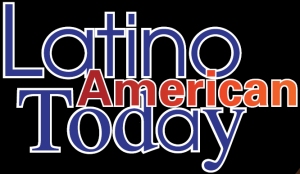LATINO AMERICAN TODAY - Family Values
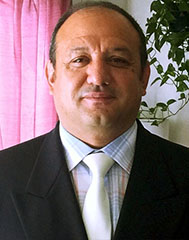
Por Dr. Saúl Carranza
Cuando sinceramente decimos a los que nos rodean “feliz año nuevo” estamos poniendo en esas palabras nuestros mejores deseos y oraciones para que esa persona reciba las bendiciones de Dios y que en ese nuevo año tenga vida, salud, paz felicidad y todas esas cosas importantes que él dinero no puede comprar pero que todos anhelamos tener.
El nuevo año nos da la oportunidad de renovar nuestra visión, replantear metas y fortalecer nuestros valores. Aunque hay grandes problemas y grandes retos 2026 se presenta como un año cargado de promesas, desafíos y posibilidades, donde la fe el amor y la esperanza se convierten en la base para enfrentar cualquier circunstancia. En tiempos de incertidumbre y cambios, cultivar estos valores puede ser la clave para encontrar sentido y dirección en nuestro camino.
Tener fe significa confiar en que, a pesar de las dificultades, existen razones para seguir adelante. La fe no sólo está ligada a nuestra relación con Dios, sino que también se manifiesta en la confianza hacia uno mismo, hacia los seres queridos y en la convicción de que el esfuerzo y la perseverancia pueden transformar la realidad. En 2026, permitámonos fortalecer nuestra fe, creyendo en nuestras capacidades para crear un mundo mejor y que en ello contamos con la bendición del divino Creador y el amor del Padre celestial.
La esperanza es esa chispa que nos anima a mirar hacia el futuro con optimismo. Nos ayuda a superar obstáculos y a soñar con días mejores. En este año nuevo, la esperanza puede ser el punto de partida para reinventarnos, para abrir el corazón a nuevas oportunidades y para mantener la motivación en medio de los retos cotidianos. Mantener viva la esperanza es esencial para no dejarse vencer por la adversidad, recordar que siempre hay un motivo para sonreír y luchar por lo que creemos.
2026 es una página en blanco, lista para ser escrita con historias de superación, crecimiento y renovación. Vivir con fe y esperanza no significa ignorar la realidad, sino enfrentarla con una actitud positiva y resiliente. Los valores cristianos son fe, esperanza y amor. Ellos son el punto de partida para que en el nuevo año podamos esperar y a construir juntos un futuro más esperanzador, feliz y pleno.
“Amado, yo deseo que tú seas prosperado en todas las cosas, y que tengas salud, así como prospera tu alma.”
Feliz año nuevo.

Por Dr. Saúl Carranza
Pastor líder de la Iglesia Familia de Dios en Dayton MN
Hemos esperado las celebraciones de fin de año con emociones encontradas pensando en la alegría de la fiesta, compartir con la familia y vivir las hermosas tradiciones de la época y en los gastos de fin de año y todas las preocupaciones de la situación mundial. Pero esta es también una oportunidad para profundizar en la fe, expresar gratitud y renovar la esperanza en Dios.
Mientras celebramos es justo dedicar un momento a la reflexión. Agradecer a Dios por todas las bendiciones recibidas, por los retos enfrentados, las pruebas que hemos superado y la fe que en cualquier situación difícil que enfrentemos nos ayudará a salir adelante. ¡Qué importante es reconocer su presencia divina en cada momento del año!
Es la oportunidad de afirmar nuestra buena relación con todas las personas, especialmente con familia, amigos y compañeros. La Biblia dice que en cuanto dependa de nosotros debemos estar en paz con todos. (Rom.12:18) No siempre es posible, pero siempre hay formas de solucionar los problemas. El espíritu cristiano nos invita a perdonar, reconciliarnos, pedir perdón, ser solidarios y celebrar en comunidad con sencillez y mucho amor.
Navidad es el tiempo para agradecer a Dios por el maravilloso regalo que nos dio en su hijo Jesucristo. Su ejemplo de entrega y bondad nos motiva a dejar el egoísmo y despegarnos de lo material buscando un poco menos para nosotros y un poco más para los demás. Especialmente aquellos que lo necesitan.
La llegada del nuevo año nos permite agradecer por el año que termina, dar gracias por la vida y la salud. Por la vida de nuestros seres queridos y orar con fe y esperanza para que en el nuevo año la misericordia y bondad de Dios nos alcancen y que nuestro mundo pueda cambiar para bien.
Pero por sobre todas las cosas es una invitación a revisar nuestros actos y las prioridades de la vida. Cada año que transcurre nos deja experiencias y sabiduría, pero también se ha llevado un poco de nuestra vida. Los buenos propósitos para el año nuevo en un espíritu cristiano son una invitación a aprovechar bien el tiempo.
Que en el nuevo año cada pensamiento, gesto, palabra y encuentro esté impregnado del amor de Cristo, para los que nos rodean sean bendecidos a través de nosotros y nosotros encontremos el verdadero propósito de la vida.
Feliz Navidad y un muy bendecido año nuevo para usted y familia.

Por Dr. Saúl Carranza
Pastor líder de la Iglesia Familia de Dios en Dayton MN
En los relatos del Evangelio, encontramos historias poderosas que no solo muestran milagros, sino también profundas lecciones de vida. Una de estas historias es la del leproso que regresó a dar gracias a Jesús. Esta historia revela el valor de la gratitud, la fe y cómo una actitud agradecida puede incluso sorprender al mismo Jesús.
En el paso de Jesús por los polvorientos caminos hacia Jerusalén, diez hombres enfermos de lepra salieron a su encuentro. En esa época, casi todas las enfermedades de la piel eran consideradas lepra y quienes las sufrían eran excluidos de la sociedad, obligados a vivir separados de sus familias y amigos.
Al ver a Jesús, estos hombres se detuvieron a cierta distancia – pues no podían acercarse – y gritaron: “¡Jesús, Maestro, ¡ten compasión de nosotros!” Ellos necesitaban desesperadamente un milagro que les diera una nueva oportunidad de vida. No tenían alternativa, sabían que solo Jesús podía hacer ese milagro.
Jesús, lleno de compasión, les dijo: “Vayan y preséntense a los sacerdotes”. Esta instrucción era significativa porque, según la ley judía, solo los sacerdotes podían declarar a un leproso limpio y permitirle regresar a la comunidad. Mientras ellos caminaban hacia el templo, algo extraordinario sucedió: todos quedaron limpios de su lepra. Sus cuerpos, antes marcados por la enfermedad, se restauraron completamente.
Sin embargo, la historia no termina aquí. De los diez hombres sanados, solo uno, al darse cuenta de que había sido curado, regresó corriendo. Cayó de rodillas a los pies de Jesús y, con profunda emoción, le dio las gracias. Este hombre era samaritano, alguien considerado extranjero y marginado por los judíos. Jesús preguntó con asombro: “¿No fueron diez los que quedaron limpios? ¿Dónde están los otros nueve? ¿Solo este extranjero regresó? Las palabras de Jesús resaltan la importancia de una actitud agradecida. El hecho de que solo uno volviera para agradecer sorprendió a Jesús. A este hombre, Jesús le dijo: “Levántate y vete; tu fe te ha salvado”.
La historia del leproso que regresó a dar las gracias nos enseña que la gratitud transforma el corazón y crea un vínculo especial con Dios. A veces, en la vida, recibimos bendiciones y milagros, pero olvidamos dar gracias al dador. Este hombre no solo fue sanado físicamente, sino que recibió una salvación más profunda, fruto de su fe y agradecimiento.
Ser agradecidos es una de las virtudes más poderosas que podemos cultivar. El leproso que regresó nos recuerda que, aun en medio de la multitud, un corazón agradecido puede tocar el corazón de Dios y de las personas. Que esta historia inspire a todos a regresar siempre, dar las gracias y vivir con un espíritu de gratitud. “Podemos mostrar gratitud hoy al reconocer los pequeños favores que recibimos, agradecer a quienes nos ayudan y reflexionar siempre sobre las bendiciones recibidas.”

Por Dr. Saúl Carranza
Pastor líder de la Iglesia Familia de Dios en Dayton MN
Una de las grandes paradojas de la humanidad es que la gran mayoría desea que la solidaridad funcione desde los otros hacia ellos. Pero, muy pocos están dispuestos a que funcione a la inversa. La solidaridad no es un valor para reclamar sino para otorgar y para usarlo sin esperar nada a cambio. El diccionario de la lengua española define solidaridad como: “Adhesión circunstancial a la causa o a la empresa de otros”. La Biblia lo expresa de manera más sencilla. “Sobrellevad los unos las cargas de los otros, y cumplid así la ley de Cristo.” Gálatas 6:2
La solidaridad es un valor esencial que permite a las personas establecer lazos genuinos de empatía, apoyo y cooperación que se vuelve imprescindible para enfrentar los retos colectivos y personales, sobre todo cuando se atraviesan situaciones difíciles o adversas. Entender al otro, apoyarle para alcanzar sus metas y cooperar compartiendo recursos es nuestra manera de cumplir con el mandamiento de Jesús “amaos los unos a los otros”.
Ser solidario va más allá de la ayuda de vez en cuando o de la misericordia; implica reconocer en la otra persona a alguien con quien compartimos una misma humanidad, una historia común y sueños similares. Es la capacidad de ponerse en el lugar de quienes enfrentan dificultades, comprender sus necesidades y actuar de manera desinteresada para contribuir a su bienestar. Y por sobre todas las cosas entender que todos podemos pasar por situaciones adversas. En el lenguaje popular decimos: “hoy por ti mañana por mi” La Biblia “Feliz el que se acuerda del pobre y del débil, en el día malo lo salvará el Señor;” Sal 41:1
Acciones tan cotidianas como escuchar a una amiga en un momento complicado, colaborar en proyectos comunitarios, compartir recursos con quienes tienen menos o cuidar el ambiente son maravillosas manifestaciones de solidaridad. Vivir actuando asi produce satisfacción, enriquece la vida, nos hace más humanos y nos hace obedientes a la ley de Dios.
No es necesario realizar grandes gestos para ser solidario. Muchas veces basta con estar allí cuando alguien nos necesita, aunque no hagamos o no digamos nada. Basta con pequeñas acciones diarias: ofrecer una palabra de aliento, donar tiempo o recursos, ofrecer una sonrisa o elevar una oración por los que sufren. Una vida solidaria ayuda a otros y se contagia. Ser solidarios es el compromiso de construir un mundo en el que nadie se sienta solo o desamparado y un mundo donde las personas podrán ver que los buenos somos más.
Jesús dijo: “Un mandamiento nuevo os doy: Que os améis unos a otros” Juan 13:34.
Saúl Carranza es el pastor principal de la Iglesia “La familia de Dios” en Dayton, Minnesota.

Por Dr. Saúl Carranza
Pastor líder de la Iglesia Familia de Dios en Dayton MN
El 4 de julio es mucho más que solamente una celebración patriótica. Es la celebración de la patria. La celebración de una nación en la que la constitución destaca que “todos los seres humanos son creados iguales y poseen derechos inalienables como la vida, la libertad y la búsqueda de la felicidad”. Cada año, en esta fecha, personas en todo el país celebramos el Día de la Independencia, conmemorando el momento en que las Trece Colonias declararon formalmente su separación del Imperio británico. El 4 de julio de 1776 se considera el “día del nacimiento” de Estados Unidos como nación independiente. El 4 de julio no solo conmemora un evento histórico, sino que también sirve como recordatorio de los valores y aspiraciones que dieron origen a la nación estadounidense. Es un día en el que las personas reflexionan sobre la importancia de la libertad, la justicia y el ideal democrático.
La declaración de independencia de los Estados Unidos de América fue promulgada y adoptada oficialmente el 4 de Julio de 1776. Este es un documento redactado principalmente por Thomas Jefferson fue innovador para su época y es muy relevante para la nuestra. En él se promueven los derechos, libertad y autodeterminación de los pueblos y principalmente de todos los que habitamos este país. Es mucho más que solamente un documento legal. Es la expresión colectiva de un pueblo que rechaza vivir bajo la autoridad de la monarquía o cualquier otro tipo de opresión y adopta la democracia como su forma de gobierno.
En 1863 el presidente Abraham Lincoln definiría magistralmente el sistema de gobierno emanado del acta de independencia como un gobierno “del pueblo, por el pueblo y para el pueblo”. Es decir, un gobierno en el que nadie está por encima de ley y en el que todos tienen derechos y obligaciones. El acta de independencia declara su oposición a los agravios y abusos del rey Jorge III al imponer leyes y decisiones arbitrarias. La esencia de la declaración expresa el sentimiento de un pueblo que quiere ser libre y gobernarse según sus propias convicciones y no bajo el totalitarismo.
El 4 de Julio es el momento también de celebrar la diversidad racial y cultural de los Estados Unidos. Nativos americanos e inmigrantes llegados de todo el mundo conformamos la nación más diversa de la tierra. En esta nación deseamos vivir en paz y armonía y con el acta de independencia también “sostenemos como evidentes estas verdades: que todas las personas son creadas iguales, que están dotadas por su Creador de ciertos derechos inalienables, entre los que están la vida, la libertad y la búsqueda de la felicidad” Feliz 4 de Julio. Dios bendiga a los Estados Unidos de América.

Por Dr. Saúl Carranza
Pastor líder de la Iglesia Familia de Dios en Dayton MN
Memorial Day, conocido en español como el Día de los Caídos, es una celebración que tiene profundas raíces en la memoria de los estadounidenses. Es diferente de las otras celebraciones para recordar a los que ya no están con nosotros porque se observa el último lunes de mayo y está dedicado a honrar a los hombres y mujeres que sacrificaron sus vidas en servicio militar para la nación. Aunque esta conmemoración tiene sus orígenes en la historia estadounidense, ofrece una oportunidad única para reflexionar desde una perspectiva cristiana, basada en los valores de sacrificio, amor y gratitud.
En mis primeros años como Capellán de la Gloriosa Escuela de Músicos Militares del Ejército de Guatemala participé en el homenaje a los músicos militares caídos en combate. Fue un acto muy especial de reconocimiento al sacrificio de aquellos que dieron su vida en el cumplimiento del deber, los que murieron defendiendo a la patria.
La Biblia dice: “Nadie tiene mayor amor que este: que uno ponga su vida por sus amigos.” Juan 15:13. Este versículo encierra el espíritu del Memorial Day, muchos soldados han demostrado este amor supremo ofrendando su vida en servicio a la nación.
El Memorial Day comenzó tras la Guerra Civil, originalmente conocido como “Decoration Day”, se instituyó para decorar las tumbas de los soldados caídos con flores y recordar su sacrificio. Con el paso del tiempo, este día se expandió para incluir a todos los estadounidenses que han muerto en servicio militar y vino a ser un día de unidad nacional y reflexión.
Desde una perspectiva cristiana, este día puede verse como un tiempo para honrar el sacrificio de aquellos que, siguiendo principios de servicio y entrega, dieron su vida por los demás. En la entrada del cementerio de mi querida ciudad de Quetzaltenango se lee: “La memoria de los vivos es la vida de los muertos.” Aunque creemos en la vida eterna y no participamos en ningún tipo de culto a los muertos, entendemos que honrar, respetar y recordar a los que nos antecedieron constituye un encuentro con nuestras raíces y con la vida y obra de quienes nos antecedieron.
La fe cristiana está profundamente arraigada en el concepto de sacrificio. Jesucristo es el ejemplo supremo de sacrificio al entregar su vida en la cruz por la redención de la humanidad. En este sentido, el Memorial Day sirve como un recordatorio de esta entrega divina, así como de los sacrificios humanos que reflejan ese mismo espíritu de amor y humildad.
Siendo que la vida humana es pasajera, Memorial Day nos invita a recordar que la memoria de los vivos también es pasajera, Pero que el conocimiento de Dios nos dará vida eterna. Ese es el sacrificio que Jesús hizo por nosotros, morir en nuestro lugar para que nosotros no muramos eternamente.
Dr. Saúl Carranza es Coordinador de ministerios Multiculturales de la Iglesia del Nazareno en Minnesota y las Dakotas, Pastor de la Iglesia Familia de Dios en Dayton MN y Director del Centro Nazareno de Compasión Agape Inc.

Por Dr. Saúl Carranza
Pastor líder de la Iglesia Familia de Dios en Dayton MN
El mes de mayo es especial porque celebramos a todas las madres que con su amor y dedicación nos guían, nos apoyan e inspiran a ser mejores personas. La figura materna ocupa un lugar de honor, y no hay mejor manera de rendir homenaje que reconociendo su aporte inigualable en nuestra vida.
La madre asume un rol lleno de desafíos y recompensas. Desde que trae una nueva vida al mundo, su existencia es transformada. Son heroínas silenciosas que con fortaleza y ternura se enfrentan a las dificultades diarias, ofreciendo siempre un refugio seguro y amor incondicional.
La madre desempeña un rol primordial en la educación y formación de sus hijos. Con su ejemplo enseña valores, principios y comportamientos que los niños llevarán consigo a lo largo de su vida. Ella es la primera educadora y ella orienta con paciencia y amor. La sabiduría y el conocimiento de una madre son fundamentales para guiarnos.
El amor y cuidados de una madre tiene el poder de transformar vidas. Con su ejemplo y cuidados una madre influye profundamente en la trayectoria de sus hijos, inspirándolos a ser mejores personas, a perseguir sus sueños y a superar obstáculos.
Cuando el apóstol Pablo felicita a su discípulo Timoteo le dice que lo ha hecho bien porque el está siguiendo el ejemplo de su abuela Loida y de su madre Eunice. Con toda razón la Biblia dice de una buena madre: “muchas mujeres hicieron el bien, pero tú las sobrepasas a todas”.
Tener una buena madre es una gran bendición. Ellas son un tesoro muy grande con el que Dios nos ha premiado. Es por eso por lo que, en este Día de la Madre, queremos decirles ¡Muchas gracias! Ustedes son la fuente de nuestros valores, gracias por enseñarnos a amar y respetar, por estar siempre presentes en nuestras vidas. Su paciencia infinita y su sabiduría han sido la luz que nos ha guiado cada día. Su fe en Dios y en sus hijos han sido fuente de motivación para salir adelante.
No celebramos ni perfección ni bienes recibidos. Celebramos la vida de nuestra viejita, su esfuerzo y su lucha. Es nuestro deseo que, en este día de la madre, cada una reciba los abrazos, las palabras de cariño y los gestos de gratitud que merecen. Que cada regalo y cada flor sean un símbolo de nuestra admiración y nuestro afecto.
A todas las madres del mundo, queremos decirles: Gracias por darnos la vida y por colmarnos de amor y alegría. Que este Día de la Madre sea tan especial y maravilloso como lo son ustedes. ¡Feliz Día de la Madre! Dios las bendiga.

Por Dr. Saúl Carranza
Pastor líder de la Iglesia Familia de Dios en Dayton MN
La Pascua, conocida en inglés como Easter, es una de las festividades más importantes para los cristianos alrededor del mundo. Para los cristianos en Estados Unidos, esta celebración está llena de tradiciones profundas y significativas que reflejan su fe y cultura. La Semana Santa conmemora la pasión, muerte y resurrección de Jesús. La Semana Santa incluye el Domingo de Ramos, Jueves Santo, Viernes Santo, Sábado de Gloria y culmina con el Domingo de resurrección.
En este año tan diferente, donde ansiedad e incertidumbre parecen ser nuestros compañeros constantes, la Pascua se presenta como un oasis de esperanza y renovación. Vivimos en tiempos donde las crisis políticas, sociales y económicas son el pan de cada día. La pandemia ha dejado una huella indeleble en nuestras vidas, alterando nuestra cotidianidad y sembrando el miedo y la desesperanza. Las guerras y rumores de guerras se oyen por doquier. Y la situación económica, al menos por el momento, para el ciudadano promedio no es prometedora.
La Pascua es una celebración que conmemora la resurrección de Jesús, es un símbolo de renacimiento y de triunfo sobre la adversidad. Es una época que nos invita a reflexionar sobre la vida, la muerte y el poder redentor de la fe. Como la renovación de la vida en cada primavera. La pascua nos recuerda que es posible renacer y despojarnos de todo lo malo que nos asedia. Principalmente el mal que brota de cada corazón.
La fe tiene la capacidad de transformar nuestra percepción del mundo. Nos ofrece consuelo en los momentos más oscuros y nos da la fuerza para seguir adelante cuando todo parece perdido. La razón de esa fe es un Dios Todopoderoso que tiene control de cada aspecto de nuestra vida. Durante esta Pascua, aunque la paz exterior pueda escasear, la fe interior puede florecer y fortalecerse.
A pesar de las múltiples ocupaciones y las incesantes demandas del diario vivir, la Pascua sigue siendo un tiempo de unión comunitaria. Los servicios religiosos y los actos de caridad son formas de mantener viva la chispa de la esperanza y el amor. La comunión de la iglesia y la familia nos recuerda que hay mucho, pero mucho más de lo que los sentidos perciben. Y que el niño que nació en la navidad es el mismo que resucitó y ofrece vida abundante a quienes le buscan.
En estos tiempos de reflexión espiritual, los actos de bondad cobran un significado aún mayor. Ayudar a un vecino, donar a los necesitados o simplemente ofrecer una palabra de aliento pueden marcar una gran diferencia. Es un momento propicio para la renovación espiritual. Es una oportunidad para reconectar con nuestra fe, para orar y para reflexionar sobre nuestras vidas y nuestras acciones. Este renacimiento espiritual puede ser el primer paso hacia una vida más plena y significativa.

Por Dr. Saúl Carranza
Pastor líder de la Iglesia Familia de Dios en Dayton MN
El bienestar familiar es un concepto integral que abarca la salud física, emocional, social y espiritual de cada miembro de la familia. La familia es el núcleo fundamental de la sociedad y la base donde se forman los valores, las creencias y las normas de comportamiento. Garantizar el bienestar de cada uno en la familia es una responsabilidad colectiva que recae en todos. Desde los padres hasta los hijos, todos pueden contribuir con acciones y actitudes positivas. Es fundamental que cada persona se sienta valorada, escuchada y apoyada dentro del hogar.
Los padres tienen la responsabilidad principal de crear un ambiente seguro y amoroso. Esto incluye proveer lo que la familia necesita, así como dar apoyo emocional, educación, valores y disciplina. Ellos deben ser modelos que seguir, mostrando comportamientos positivos y enseñando valores como respeto, empatía, solidaridad y fe.
Los hijos también juegan un papel importante en el bienestar familiar. Deben aprender a colaborar, respetar y ayudar a sus padres y hermanos. La comunicación abierta y honesta es clave para resolver conflictos y fortalecer los lazos familiares. Los hijos pueden contribuir al hogar asumiendo responsabilidades adecuadas a su edad, como ayudar con las tareas del hogar o cuidar de los hermanos menores.
Una comunicación efectiva es esencial para el bienestar familiar. Fomentar un diálogo abierto y sincero permite a los miembros de la familia expresar sus sentimientos, necesidades y preocupaciones. La escucha activa y el respeto mutuo son fundamentales para resolver conflictos y fortalecer las relaciones. Dedicar tiempo de calidad a la familia es crucial para fortalecer los lazos y crear recuerdos duraderos. Comer juntos, participar en juegos y deportes, conversar y asistir juntos a la iglesia pueden mejorar la relación y el bienestar emocional de todos los miembros. Es importante encontrar un equilibrio entre el tiempo dedicado al trabajo, los estudios y las actividades recreativas y espirituales.
El sabio Salomón dijo que el principio del conocimiento es el temor del Señor. No podemos ignorar este aspecto importante en la vida de la familia. Conocer a Dios es más que una religión. Es comprender la grandeza de lo que está más allá de lo que nuestros sentidos pueden percibir. Cuando en familia se cultivan los valores espirituales estos crean el estilo de vida que nos identifica. Aporta a la familia fe, ética y amor. Pero por sobre todas las cosas, la bendición de Dios. El esfuerzo de todos es importante y será mucho más efectivo cuando sabemos que somos ayudados por el Todopoderoso en ese esfuerzo. Con todo mi corazón pido a Dios que bendiga tu vida y a tu familia.

Por Dr. Saúl Carranza
Pastor líder de la Iglesia Familia de Dios en Dayton MN
La familia unida ofrece estabilidad y seguridad a sus miembros. La unidad de la familia es de vital importancia para el desarrollo integral de los niños y la estabilidad emocional de los adultos. En el libro de génesis leemos de Dios diciendo “no es bueno que el hombre esté solo, haré ayuda idonea para él”. Fue allí cuando creó a la mujer para que fuera ayuda idonea para Adán.
El primer rol de la mujer fue el ser la pareja perfecta para el hombre. En el trato entre iguales la idoneidad significa complemento perfecto. Aquella o aquél en quién se encuentra plena realización. En el plan original de Dios hay unidad de propósito, de valor y una buena relación libre de alienación, temor y utilización. La responsabilidad asignada a la primera pareja fue la de señorear juntos sobre la creación, amandose y valorizandose mutuamente.
La paternidad es la consecuencia física normal del “fructificad y multiplicaos”. Pero solo en relación al ser “uno solo”. La paternidad debe ser producto del amor intencionado y responsable que entiende el alto privilegio y responsabilidad de traer hijos al mundo. Una pareja que se ama, protege, admira mutuamente y se respeta, transmitirá esos valores y seguridad a sus hijos.
Aunque el anhelo de todos es tener una familia feliz. Vemos que muy frecuentemente ese anhelo se convierte, para muchos, en un sueño irrealizable y, para otros, es una horrible pesadilla. Situaciones como malos tratos, infidelidad, falta de comunicación, egoísmo, insolvencia económica y falta de madurez, entre otros, resultan en divorcio, familias separadas, hijos abandonados, y por supuesto, personas infelices.
La unidad de la familia no es cuestión de suerte sino de mucho esfuerzo de cada uno de los miembros. Comenzando con la pareja, se requiere un compromiso de exclusividad. “Renunciando a todos los demás me consagraré a ti mientras los dos vivamos” Es tan serio esté compromiso que el mismo Señor Jesús dijo: “Por esto dejará el hombre a su padre y a su madre y se unirá a su mujer, y los dos seran una sola carne; así que ya no son mas dos, sino uno”. En esto se basa la afirmación de que el matrimonio es la base de la familia y de la sociedad.
Sobre la base de una pareja solida se puede edificar una familia unida. El amor no deja lugar a las divisiones y odio. Es en la familia donde se aprende a confiar, a sentirse seguro, donde cada miembro aprende sobre su propio valor y se fortalecen la autoestima y el anhelo de superación y del bien común. Siendo una familia que se comunica y apoya es como aprendemos a vencer el egoismo innato en el ser humano. Es alli donde se puede dar la comuicación abierta, se aprende a escuchar a los demás y a enfrentar los retos de la vida.
Aunque no todas las familias tienen a ambos padres o algunas parejas no tienen hijos el principio igual se aplica. Tener una familia unida y feliz no es fácil, pero es posible. Los ingredientes para ello incluyen: Un compromiso de mantener unida a la familia. Dedicar tiempo a la familia, mejorar la comunicación aprendiendo a escucharse, dar y recibir amor, cultivar la fe, servir los unos a los otros y aprender a resolver los inevitables conflictos. No es facil, pero tampoco es imposible.
El consejo de la Biblia para tener una familia unida es buscar a Dios y luego: Sean humildes, amables y pacientes, y bríndense apoyo, por amor, los unos a los otros.
Hagan todo lo posible por vivir en paz, para que no pierdan la unidad que el Espíritu les dio. Efesios 4:2-3. PDT

Por Dr. Saúl Carranza
Pastor líder de la Iglesia Familia de Dios en Dayton MN
Aunque hay mucha especulación sobre lo que el presidente Trump y su administración harán cuando lleguen a la casa blanca, también es cierto que han sido muy sinceros respecto a sus planes de deportación a gran escala y persecución de la inmigración “ilegal”.
Como Cristiano y pastor de una iglesia me preocupan las personas que serán afectadas por estas deportaciones. Estamos de acuerdo que las leyes existen para proteger a la nación y que los criminales deben ser castigados de acuerdo con la ley, incluyendo la deportación. Pero aterra el daño colateral. Los inmigrantes honrados, aquellos que llegaron siendo niños, los niños nacidos en este país hijos de inmigrantes irregulares y otros que pueden sufrirán.
Como líderes de iglesias y nuestra comunidad debemos prepararnos para lo que vendrá. Sabemos que nuestro deber es honrar a Dios, obedecer la ley y orar por nuestras autoridades, y estamos haciendo eso. Pero en un estado de derecho las autoridades no pueden actuar caprichosamente porque la constitución protege a los residentes. El que una persona haya entrado sin documentos al país o se haya quedado más allá de lo permitido no significa que no tenga opciones. Lo primero que toda persona debe explorar son sus posibilidades de obtener un estatus migratorio que le permita quedarse legalmente en el país. Podemos, como iglesias, ayudarles a obtener esa asesoría.
La constitución garantiza el derecho de expresión y organización para que comunidad e iglesia defendamos a aquellos que han trabajado y servido muchos años sin delinquir y que son parte importante de la sociedad. Personas que aportan significativamente a la vida del país. Se pueden hacer cambios legales que ayuden a las personas buenas a permanecer en el país. Pero alguien tiene que ser la voz de aquellos que no pueden hablar por sí mismos.
Tenemos que ser mensajeros de fe y esperanza para aquellos que serán deportados. Dios no te bendice solo en los Estados Unidos. En cualquier lugar del mundo a donde vayas, hay esperanza. Dios te ha dotado de inteligencia, fortaleza y creatividad. Así como te ayudó a llegar a este país estará contigo en todo lugar. “yo soy quien te manda que tengas valor y firmeza. No tengas miedo ni te desanimes porque yo, tu Señor y Dios, estaré contigo dondequiera que vayas.” Josue 1:9 Biblia LS.
Debemos prepararnos para apoyar y cuidar de familias y personas que continuarán viviendo aquí sin documentos. Cómo lo han hecho por siempre. Sabemos que la ley de inmigración está mal y debe ser modificada. Pero mientras los políticos se ponen de acuerdo y dejan de usar el asunto migratorio como moneda de cambio por votos. A la iglesia corresponde amar y cuidar a las personas sin diferencia de raza, estatus o nacionalidad. Es en horas de obscuridad cuando debemos ser luz de la tierra.
Los valores primordiales del cristianismo son amor, fe y esperanza. Ahora, nos toca encarnar esos valores.

Dr. Saúl Carranza es el Coordinador de ministerios multiculturales de la Iglesia del Nazareno y Director del Centro Nazareno de Compasión Agape Scarranza@amoragape.org
Estamos por empezar un nuevo año, con nuevas autoridades y en medio de un mundo convulsionado por un sinfín de guerras y problemas. Delincuencia, cambio climático, inflación, epidemias, sobrepoblación y una sociedad cada vez menos consciente de su realidad y los problemas que la rodean porque la desinformación juega a favor del mejor postor. ¿Podrá describirse un peor panorama? O quizás la pregunta es: ¿Hay esperanza para nuestro mundo? La mayoría probablemente solo dirá “Talvez”.
Las probabilidades pueden ser muchas o pocas, pero siempre dejan un espacio para creer. Por ejemplo, hay una entre 140.000.000 de probabilidades de sacarse la lotería. Pero aun así la gente sigue comprando los números y alguien siempre gana por lo que eso hace a muchos tener una ilusión y a muy pocos ganar mucho.
A diferencia de la nada realista y efímera esperanza de cambiar la vida sacándose la lotería. La Navidad habla de la esperanza real para la humanidad. La Navidad es la festividad religiosa más conocida por toda la tierra. También, la más celebrada en el mundo occidental donde es considerada como una época de paz, de amor, fe y regocijo que recuerda el nacimiento de Jesús. Es una celebración cristiana que sin embargo, alcanza con su espíritu a muchas personas de diferentes países, razas y credos religiosos. Ofrece a todas las personas la oportunidad de un cambio real y una esperanza viva.
La navidad es la celebración de un nacimiento, no de un cumpleaños. De allí el nombre “Natividad” de donde se deriva. Recuerda el nacimiento de Jesús, el hijo de María que fue engendrado por el Espíritu Santo. Un evento que históricamente se discute si sucedió en el año 1 d.C o en el año 6 a. C. Pero sucedió, y sucedió tal y como fue anunciado desde muchos siglos antes.
Es interesante como el relato de ese nacimiento se ajusta a profecías anunciadas cientos de años antes de que sucediera. Será un niño varón, descendiente de Abraham, de la tribu de Judá y del linaje del Rey David. Que nacerá de una virgen en la ciudad de Belén y Reyes le traerán regalos. Pero lo más importante. Que ese niño será la presencia misma de Dios con los seres humanos. De allí su nombre “Emanuel” que significa Dios con nosotros. Un mensaje que en si mismo es una buena noticia para la humanidad. Aún los que no comparten la fe cristiana son beneficiados por el alcance de este hecho y comparten la paz y felicidad de este tiempo.
Si, el mundo está mal. Si, hay problemas. Si, la humanidad se pierde en egoísmo maldad e ignorancia. Pero en medio de todo eso; “Dios está con nosotros” y su presencia anuncia que hay bondad, que hay fe, que hay amor y que podemos ser mejores y ayudarnos unos a otros para alcanzar la paz y vivir de una mejor manera. Lo que el niño de Belén vino a mostrarnos fue el ejemplo que todos debemos imitar. Nos enseñó: “Ámense unos a otros”, “perdónense”, vivan vidas puras y rectas. Por todo eso. El mensaje de la Navidad debe ser compartido no solo de palabras, sino también de hecho. Siguiendo el ejemplo del que nació la primera navidad y quien constituye la mejor esperanza que los humanos tenemos. Por medio de él la humanidad cambia y mejora cada día y persona por persona. “he aquí os doy nuevas de gran gozo, que serán para todo el mundo. Os ha nacido un Salvador que es Cristo Jesús”.
Feliz Navidad y un muy bendecido 2025 para todos.
El Dr. Saúl Carranza es pastor general de la Iglesia Familia de Dios en Dayton MN. Y director del Centro Nazareno de Compasión Agape Inc. Organización no lucrativa que apoya a la comunidad hispana de los Estados Unidos.

Dr. Saúl Carranza es el Coordinador de ministerios multiculturales de la Iglesia del Nazareno y Director del Centro Nazareno de Compasión Agape Scarranza@amoragape.org
En los Estados Unidos, el día de acción de gracias se celebra el cuarto jueves de noviembre se celebra. Esta es la celebración con mayor participación en el país, ya que no hay distinciones culturales o religiosas para dar gracias. Todos tenemos algo por lo cuál estar agradecidos y tenemos a alguien a quien agradecer. Es, por lo tanto, de acuerdo al presidente George Washington en su proclamación del día de acción de gracias, “deber de todas las naciones reconocer la providencia de Dios Todopoderoso, obedecer Su voluntad, estar agradecidas por Sus beneficios e implorar humildemente Su protección y favor.”
El dato histórico más conocido de esta celebración es, sin duda, el de los peregrinos del Mayflower quienes en 1621 después de sobrevivir las penurias de su primer año en estas tierras agradecieron al Creador por sus cuidados y provisión. Sin embargo, hay registros históricos de otra celebración de acción de gracias en Texas por el año 1598. En esta nación desde que el hombre ha sido consciente de la existencia de un Ser Superior quién es Creador y Provisor lo ha retribuido con su agradecimiento, porque la gratitud es una de las más nobles virtudes del ser humano.
Aunque para muchos, acción de gracias es solo la oportunidad de faltar al trabajo, celebrar en familia y compartir una grandiosa cena. El verdadero sentido de la celebración es reconocer todo lo bueno que poseemos y nos rodea. Al hacerlo, podemos valorar las fuentes y medios por los cuales esas bondades nos son concedidas. No soslayamos
el esfuerzo personal o familiar que ha hecho posible obtener esos beneficios, pero si reconocemos que vida, inteligencia salud y todo lo demás son fruto de la bondad de Dios, sin duda, nos sentiremos llamados a darle gracias.
En nuestro agitado presente es difícil encontrar gratitud. Estamos tan concentrados en nuestros problemas y egoísmo que olvidamos reconocer la bondad a nuestro alrededor. Cuando podemos apreciar lo que tenemos en ves de amargarnos por lo que no tenemos la paz interior nos inunda. Cuando descubrimos como una sonrisa, una palabra amable y el poder de la palabra “gracias” transforma la lúgubre y triste soledad de las personas nos damos cuenta de cuan sanadora es la gratitud. Para quien la posee y para quien la recibe.
Lo único que necesitamos para recibir los beneficios de ser personas agradecidas es la humildad de reconocer que mucho de lo que tenemos y lo que disfrutamos es únicamente por la bondad de Dios y de las personas. Cuando nos damos cuenta de que las cosas más maravillosas del universo son gratuitas y que podemos disfrutar lo poco o mucho que tengamos y aún compartirlo. Es entonces cuando entendemos el significado de “Dad gracias a Dios en todo”.
El presidente Abraham Lincoln dijo en su proclamación de acción de gracias de 1863: “Me ha parecido justo y apropiado que sean reconocidas solemne, reverente y agradecidamente, como con un sólo corazón y voz por todos los americanos. Por lo tanto, invito a mis conciudadanos en todas partes de los Estados Unidos, y también a aquellos que estén en el mar y aquellos que estén viajando en tierras extranjeras, a apartar y observar el último jueves de noviembre próximo, como un día de Acción de Gracias y Alabanza a nuestro caritativo Padre que mora en los cielos.” Este es el verdadero propósito del día de acción de gracias.

Dr. Saúl Carranza es el Coordinador de ministerios multiculturales de la Iglesia del Nazareno y Director del Centro Nazareno de Compasión Agape Scarranza@amoragape.org
El mes de la herencia hispana es un tiempo para celebrar en familia la rica herencia que disfrutamos y la belleza de nuestra cultura hispana. Cultura que tiene muchos colores, sabores, sonidos y manifestaciones. El ser latino o hispano no se limita a idioma o nacionalidad, sino que se expande a sentimientos valores y sentido de pertenencia de ese maravilloso grupo al que cariñosamente denominamos “la raza”.
Este año el mes de la herencia hispana se celebra en medio del periodo electoral y tremendo lío tienen los partidos políticos tratando de ganar el voto latino, ya que con más de 30 millones de votantes registrados su voto es decisivo y puede inclinar la balanza electoral hacia cualquier punto.
Solo se puede comprender la importancia de los hispanos en Estados Unidos cuando nos damos cuenta que únicamente México tiene más personas que hablan español que Estados Unidos. Somos el segundo país con más hispanohablantes en el mundo. De acuerdo a los datos del censo entre 2010 y 2020 la población latina creció un 23% y llegó a más de 62 millones.
Pero, ser latino es mas que solamente ser un numero en las estadísticas. Detrás de cada uno de nosotros hay herencia cultural, étnica, lingüística y una tradición de valentía que nos permite sentirnos orgullosos de nuestras raíces. No somos una cultura sino muchas culturas fundiéndose en una nueva realidad de diversidad en la que nos esforzamos por guardar lo que hemos traído de nuestros países mientras nos ubicamos en la realidad de ser parte del país más diverso del mundo.
Formar familia en este país enriquece aún más nuestros valores. Nos relacionamos y mesclamos con personas de otras partes del mundo. Aprendemos otras costumbres. Escuchamos otros idiomas y aprendemos que en la maravillosa creación de Dios no hay monotonía. Las nacionalidades, razas y lenguas se unen para formar familias y las familias forman la nación.
En medio de ese mosaico multicolor, multiétnico y multilingüe podemos gozar y compartir lo bueno de ser hispano y que nuestra cultura no es superior ni inferior a ninguna otra, solamente somos… maravillosamente diferentes. Gracias a Dios, nuestra herencia, con lo bueno y lo malo que se le quiera señalar, es la nuestra y debemos enseñar a nuestra familia a amarla y esforzarnos por ponerla muy en alto.
¡Viva el mes de la herencia hispana¡
Busquen el bienestar de la ciudad a la que los he enviado y oren por ella al SEÑOR, porque el bienestar de ustedes depende del bienestar de ella. Jeremías 29:7 PDT

Dr. Saúl Carranza es el Coordinador de ministerios multiculturales de la Iglesia del Nazareno y Director del Centro Nazareno de Compasión Agape Scarranza@amoragape.org
Recientemente en nuestras vacaciones volvimos a nuestro hermoso país, Guatemala. Viviendo en Minnesota los últimos diecisiete años, anhelamos disfrutar de las maravillosas y cálidas playas del pacífico guatemalteco y cada vez que tenemos oportunidad vamos a disfrutar de esos paradisiacos lugares.
Esta vez, sin embargo, algo cambió. Lo que habían sido claras y limpias olas del mar ahora venían con grandes cantidades de basura. Bolsas de plástico, pañales y muchos otros desechos humanos flotan en las otrora limpias playas. Las manchas de aceite también obscurecen las azules aguas del mar.
La basura en el mar no es algo exclusivo de Guatemala. A nivel mundial la contaminación ambiental es uno de los más grandes problemas. Grandes islas de desechos plásticos se forman en los océanos del mundo. Pero no solo el mar está contaminado. La tierra, el aire y aún el espacio está lleno de basura producida por los seres humanos. Lo contradictorio de esa situación es que cuando Dios creó al hombre le asignó la tarea de cuidar de la creación. En Génesis 2:15 leemos el mandato dado por Dios a la humanidad de hacer producir y cuidar de la tierra. El plan original era el de un mundo perfecto bajo el cuidado de gente buena.
Antes del pecado, el planeta tierra, además de ser hogar, era la provisión de Dios para satisfacer todas las necesidades de los humanos. Pero no lo supimos cuidar. Hoy, como consecuencia del pecado y los errores humanos vivimos en un planeta sobre explotado, super contaminado y a punto de colapsar. Los esfuerzos mundiales para revertir los efectos de la contaminación parecieran estar llegando demasiado tarde. Pero hay alguna esperanza. Si gobiernos, pueblos y personas individuales trabajamos unidos para salvar el planeta, tal vez podamos aún dejar un planeta habitable a la próxima generación. Pero es un reto para todos el cuidar de la creación que Dios nos da.
No todos hemos aprendido a cuidar del medio ambiente, pero, cada uno puede ayudar. Podemos evitar usar todo lo que daña la creación, no producir contaminantes, manejar adecuadamente los desechos (basura) y de acuerdo con nuestras posibilidades participar en los esfuerzos para limpiar y reforestar este mundo. Dios nos regaló un mundo limpio. No lo ensuciemos. En la medida en la que luchamos por tener un mundo mejor, todos somos beneficiados y bendecidos. Como cuidamos de la casa así también esforcémonos por tener, ciudades, países y un mundo más limpio. Dios nos lo encomendó a nosotros, tomemos la responsabilidad que delante de Dios nos corresponde. Somos los mayordomos de nuestro mundo.

Dr. Saúl Carranza es el Coordinador de ministerios multiculturales de la Iglesia del Nazareno y Director del Centro Nazareno de Compasión Agape Scarranza@amoragape.org
“Dios que nos dio la vida, al mismo tiempo nos dio la libertad.” – Thomas Jefferson
Vivir en los Estados Unidos de américa es el sueño de muchos y por eso hacen grandes esfuerzos para llegar aquí. Quienes ya vivimos en este país podemos afirmar que “Vivir en la tierra de los libres y el hogar de los valientes” es un privilegio. Muchos, sin embargo, no conocen el costo que se ha pagado por esta nación. Vidas y sangre costó la independencia y todas las batallas que después de ella se libraron para lograr que esta gran nación llegara a ser libre y próspera.
La lucha histórica de los Estados unidos no ha sido solamente para mantener su independencia sino también para garantizar a cada uno de sus habitantes los derechos plasmados en su acta de independencia. “Los hombres son creados iguales; son dotados por su Creador de derechos inalienables; que entre estos están la vida, la libertad y la búsqueda de la felicidad.”
Desde el siglo XVI las personas han venido buscando una tierra dónde vivir y practicar su fe en un ambiente de libertad, dónde cada uno pudiera decidir su propio destino y tener los medios para lograrlo. Cada día siguen llegando al país miles de personas ilusionadas por ser parte de esta gloriosa nación y disfrutar el derecho a la vida, la libertad y la felicidad.
No siempre es fácil iniciar una nueva vida, hay leyes y costumbres que deben ser conocidas y respetadas. Hay problemas que deben ser resueltos y retos que deben ser superados. Pero, todo eso es parte de la vida libre. Libertad no es libertinaje. La libertad es un derecho y una responsabilidad. Es el producto del esfuerzo de muchas personas a lo largo de la historia y el deseo de Dios para todas sus criaturas. “Conoceréis la verdad y la verdad os hará libres”.
La “tierra de los libres y el hogar de los valientes” es una tierra bendita y de provisión, que sigue construyéndose cada día con el esfuerzo de todos. Los que ya vivimos aquí y los que están llegando. Todos podemos aportar y trabajar para hacer de este un mejor país. Pero es también un país de orden y respeto donde las bases de la sociedad nos piden respetar a las personas, obedecer las leyes, respetar las instituciones y encomendarnos a Dios, porque, este, es un país que confía en Dios. “en Dios confiamos”.
El llamado “sueño americano” para muchos es un sueño y para otros, es una pesadilla. Vivir bien en este país es posible, pero requiere mucho esfuerzo, las cosas no son gratis y el dinero no cae de los árboles. Hay que trabajar duro y luchar por lo que se quiere. Aquí, como en cualquier otra parte del mundo la clave sigue siendo: “que te esfuerces y seas valiente; no temas ni desmayes, porque Jehová tu Dios estará contigo en dondequiera que vayas”.

Dr. Saúl Carranza es el Coordinador de ministerios multiculturales de la Iglesia del Nazareno y Director del Centro Nazareno de Compasión Agape Scarranza@amoragape.org
Liberty bell, la campana agrietada que se encuentra en Filadelfia es una de las imágenes que más se relacionan con la libertad en los Estados Unidos. Esa campana representa la independencia americana, la abolición de la esclavitud, los derechos civiles y las libertades en general.
La historia de la campana y la gran grieta que la identifica, son interesantes. La campana fue encargada a una compañía inglesa en 1751. Cuando la probaron en 1752 la campana se rajó y debió ser reparada. Esa reparación sirvió por muchos años pero luego apareció una segunda grieta y tras varios esfuerzos por repararla quedó la conocida campana que se exhibe en el Liberty Bell Center.
La relación de la campana con la libertad viene de la cita bíblica grabada en la parte alta de la campana. Levítico 25:10 y dice: “Pregonaréis la libertad en toda la tierra y a todos sus moradores.” El sonido de esta campana debía recordar a quienes la escucharan que somos libres.
Este mensaje se relaciona con el texto de la constitución estadounidense, con la primera enmienda que garantiza la libertad religiosa y de expresión, libertad de prensa y de reunión. Y con la decimotercera enmienda que abolió y prohíbe la esclavitud en los Estados Unidos.
Por todo esto ha sido tomada como símbolo por los abolicionistas en su lucha contra la esclavitud, Por los sufragistas en su lucha por el voto y por los defensores de los derechos civiles. La campana sonó siete veces el día 6 de junio de 1944. El día “D”. Cuando los aliados desembarcaron en Francia para liberar a Europa.
Esa campana nos recuerda que vivimos en la “tierra de los bravos y los libres”. La libertad es un derecho y una responsabilidad. Es el producto del esfuerzo de muchas personas a lo largo de la historia y el deseo de Dios para todas sus criaturas. “Conoceréis la verdad y la verdad os hará libres” Ese fue el mensaje de Jesucristo. Una libertad física, intelectual y espiritual que todos podemos disfrutar. Una libertad lograda por los padres de la patria, afirmada por las luchas libertarias y concedida por nuestro Padre celestial es la que celebramos cada 4 de Julio.
Feliz día de la independencia.

Dr. Saúl Carranza es el Coordinador de ministerios multiculturales de la Iglesia del Nazareno y Director del Centro Nazareno de Compasión Agape Scarranza@amoragape.org
En tiempos donde los que los partidos políticos se enfrascan en discusiones sobre el aborto y la seguridad reproductiva y cuando cada estado trata de definir su legislación al respecto. Llegamos también al día de la madre. Independientemente de lo que muchos puedan opinar. En la Biblia, y para la mayoría de los cristianos, la fecundidad es una bendición. Y no se limita solamente a la procreación, sino que abarca la realización personal y espiritual de la mujer. Otro día hablaremos del aborto. Hoy hablemos de la maternidad.
Los relatos bíblicos se dan para muchos en una época primitiva y en sociedades patriarcales. Es cierto, y eso da a esas lecturas el valor histórico de principios que han perdurado por los siglos. A través de esta narrativa leemos que mujeres como Sara, Rebeca, Raquel, Ana, Isabel y muchas otras sufrían por la imposibilidad de ser madre. Las referencias bíblicas a la fertilidad son muchas y muy significativas. Las mujeres que desean ser madres encuentran en la biblia muchos versículos que apoyan ese deseo. Y aquellas que lo desean y todavía no han podido lograrlo encuentran también mensaje de ánimo y esperanza. Dios está en el control, Él es el Señor de la vida y a su tiempo responderá de manera maravillosa.
La maternidad como se muestra en la Biblia nunca ha sido cuestión del cuerpo de la mujer sino producto del amor. “Dejará el hombre a su padre y a su madre, se unirá a su mujer y serán una sola carne” Bajo esa premisa Dios da la orden “fructificad y multiplicaos”. Por eso, el matrimonio es la base de la familia y la familia es la base de la sociedad. Cuando se pierden esos valores es cuando toda la estructura social se desmorona y venimos a caer en discusiones que nunca fueron parte del plan original de la sociedad humana. No es evolución de la sociedad sino todo lo contrario. La maternidad nunca ha sido una obligación, siempre ha sido un privilegio. No todas las mujeres pueden ser madres biológicas, no todas las madres han escogido serlo y no todas las madres son apreciadas de igual manera. Pero, es a través de la maternidad que el milagro de la vida se cumple. La familia se realiza y la femineidad aporta lo que nadie más puede hacer. Ser madre es todo eso.
En la cultura latina la madre es el corazón de la familia y la familia entrega su corazón en amor a la autora de sus días. Tener a la madrecita viva es motivo de celebración familiar y su ausencia pesa tremendamente. En nuestra cultura tratamos de que las flores, los regalos y demás muestras de cariño lleguen en vida. Después no sirven más que de un pequeño consuelo. Para los migrantes la madre es la razón del esfuerzo diario y el trabajo duro. Es la desesperación de cada mes tener algo para enviarle a la viejita. Y la dulce esperanza es “poder abrazar a mi viejita. El saber que ella esta bien o que está enferma son motivo de paz o desesperación.
Por todo esto, este día de la madre 2024 queremos dar un cariñoso “Dios las bendiga” a cada una de las madrecitas. Sobre todo, a las que, con esfuerzo, desvelos y mucho sacrificio sacaron adelante a sus hijos. De ustedes madres esforzadas es que la Biblia dice: Muchas mujeres hicieron el bien; Mas tú sobrepasas a todas.” A todas ustedes: Feliz día de la madre.

Dr. Saúl Carranza es el Coordinador de ministerios multiculturales de la Iglesia del Nazareno y Director del Centro Nazareno de Compasión Agape Scarranza@amoragape.org
El aumento de inmigrantes llegando a Minnesota ha llevado a su máxima capacidad a organizaciones gubernamentales y no gubernamentales, según información obtenida del Departamento de Servicios Humanos (DHS). Semanalmente entre 300-500 personas llegan al área de Minneapolis y Saint Paul con la intención de quedarse aquí. Cerca de la mitad de estas personas vienen directamente de las fronteras.
Estoy agradecido al participar con varias organizaciones que con valentía y mucho esfuerzo están coordinando el apoyo a familias que llegan al área metropolitana; las oficinas de Immigrant and Refuggee Affairs de la ciudad de Minneapolis bajo la dirección de Michelle Rivero y la de Immigrant Services de Saint Paul dirigida por Edmundo Lijo ¡están cumpliendo una gran labor! Es también importante destacar la cooperación interinstitucional de Latinos Serving Latinos que es una muestra de que ante la crisis nos unimos para ayudarnos unos a otros.
Esta crisis está permitiendo que personas y sobre todo líderes se comprometan en la ayuda. Cuando las familias vienen, necesitan vivienda, comida, salud, ropa, seguridad y ayuda legal de inmigración. Pero conforme se establecen las necesidades llega a incluir trabajo, transporte, escuela etc. A diferencia del pasado, las familias llegando a Minnesota vienen amparadas por una petición de asilo, un parole humanitario o la condición de refugiados. Establecerse no es fácil ya que obtener los documentos y un permiso de trabajo suele durar mucho tiempo, la asesoría legal es muy cara y los pagos por vivienda, comida y todo lo necesario se acumulan muy rápidamente.
Podemos acercarnos a esta problemática desde la perspectiva política y buscar a quién echarle culpas y usar a las personas como trampolín partidista. Podemos verlo desde la perspectiva social y hablar de las causas y efectos de la inmigración o desde la perspectiva humana que entiende que estas personas ya están aquí y muchos de ellos están sufriendo. Salieron de su tierra porque allí no tenían esperanza. La magnitud de sus problemas era tan grande que el peligroso viaje por selvas y carreteras fue una mejor opción para ellos. Y ahora que tienen una esperanza necesitan una mano amiga que les de ese primer empujón para salir de esa crisis.
Ya casi 2000 años que el apóstol Pablo digiera: “Existen la fe, la esperanza y el amor, pero el mayor de ellos es el amor. Si, es cierto que el gobierno y las organizaciones no lucrativas tienen una responsabilidad. Es cierto que el sector político debe arreglar un sistema de inmigración en crisis. Y es cierto que los gobiernos del mundo deben hacer más para ayudar a sus ciudadanos. Pero también es cierto que cada uno de nosotros puede preguntarse ¿Cuál es mi responsabilidad? Tengo fe en Dios y en mi nación para un mejor futuro. Tengo esperanza que las cosas mejorarán. ¿Pero y el amor? ¿y la caridad? De nuevo la Biblia aclara el panorama. “Si alguien que posee bienes materiales ve que su hermano está pasando necesidad y no tiene compasión de él, ¿cómo se puede decir que el amor de Dios habita en él?”1 Juan 3:17
La compasión es amor en acción. Hagamos de esta crisis humanitaria la oportunidad de amar al prójimo aunque no tenga el mismo color de piel, no hable el mismo idioma o no piense igual que yo. Es humano y es mi hermano. Yo creo en las palabras “Deben amarse los unos a los otros y sobrellevar los unos las cargas de los otros”. No cierres tus ojos a la necesidad de tu vecino. Si puedes, ayudale. Dios te bendiga.

Dr. Saúl Carranza es el Coordinador de ministerios multiculturales de la Iglesia del Nazareno y Director del Centro Nazareno de Compasión Agape Scarranza@amoragape.org
Porque un niño nos ha nacido, hijo nos ha sido dado, y el principado sobre su hombro. Se llamará su nombre «Admirable consejero», «Dios fuerte», «Padre eterno», «Príncipe de paz». Isaías 9:5
Belén sin Navidad. Quién lo diría. La ciudad donde Jesús nació este año no tendrá celebración navideña debido a la guerra entre Israel y Hamas. Este diciembre la ciudad no se vestirá de gala ni la iglesia de la natividad recibirá a sus miles de turistas. La ciudad es una víctima más de la guerra. Y de las muchas guerras que se viven hoy en el mundo. Pero esto no es de extrañar. La primera navidad fue anunciada en tiempo de guerra y el nacimiento del hijo de Dios se dio en tiempo de colonización e imperialismo.
En un tiempo de problemas y guerra. Cuando poderosos enemigos acechaban y la gente estaba temerosa y angustiada porque no sabía lo que vendría. El profeta Isaías dio un mensaje de esperanza y paz y dijo que Dios mismo lo confirmaría. Hace más de 2700 años Isaías dijo: “el Señor mismo les dará esta señal. ¡Miren! ¡La virgen concebirá un niño! Dará a luz un hijo y lo llamarán Emanuel (que significa “Dios está con nosotros”). Isaías 7:14
La profecía de Isaías se cumplió hace más de 2000 años en Belén. Allí la virgen María concibió por obra del Espíritu Santo y trajo a este mundo al niño Jesús. Hoy Belén es una pequeña ciudad de unos veinticinco mil habitantes en Cisjordania, Palestina. Aunque Belén es un lugar de devoción para muchos creyentes, es también un lugar afectado por las diferencias entre palestina e Israel y principalmente por la guerra entre Israel y Hamas.
Este año descubrí que en esa zona hay un importante grupo de palestinos cristianos. Probablemente la iglesia cristiana más antigua después de la de Jerusalén. Esta gente mantiene su fe Cristiana en medio de poderosos grupos judíos y musulmanes. Una persona de esta comunidad me compartió con tristeza que en Belén este año se han cancelado las celebraciones navideñas por causa de la guerra. La ciudad está desierta me dijo. No hay dinero porque no hay turismo y el gobierno no está pagando salarios. Que tristeza saber que en el lugar donde Jesús nació, en la tierra santa, no se celebrará la navidad.
Qué pena que en el mundo solo se habla de guerra, destrucción, violencia, crimen y delincuencia. Temas como terrorismo, muerte, hambre, inflación y pobreza acaparan a los medios informativos. Pero, toda esa triste información no puede callar el motivo de la navidad. Que importante es recordar que “Dios está con nosotros”. En medio de tantas malas noticias que bueno es llegar a la época de navidad. Porque navidad es el tiempo de celebrar la venida de Jesús, el hijo de Dios. No se celebra una fecha, se celebra un evento. Que Dios envió a su hijo al mundo para traer paz, esperanza y gozo a la pobre y perdida humanidad.
Cuando los ángeles anunciaron tan feliz acontecimiento dijeron a los pastores: “¡Gloria a Dios en las alturas, Y en la tierra paz, buena voluntad para con los hombres!” Jesús es el amor encarnado y enseñó a quienes le sirven a llevar ese amor a todo el mundo. Cuando hay tantas personas dispuestas a hacer la guerra, matar a otras personas y crear problemas. Nosotros en cambio, podemos buscar la paz y desarrollar la buena voluntad para con el prójimo y ayudarnos unos a otros. Eso es un milagro, el milagro de la navidad.
Si miramos a nuestro alrededor con los ojos del materialismo solo veremos tristeza, maldad y dolor. Pero si lo miramos con los ojos de la fe veremos oportunidades. Oportunidades de servir al prójimo, de amarnos unos a otros y de mostrar el amor de Dios a otros. En la familia, en el trabajo, en la calle y aún con el desconocido. Esta navidad podemos ser mensajeros de buenas noticias y compartir el mensaje de amor que nos trajo el niño de Belén, el príncipe de paz.
Estimado lector. que sus buenos deseos y su mensaje de feliz navidad se acompañen con actos de bondad y ayuda. Que el regalo de navidad no sea solo para los que puedan devolverlo. Existen la fe, la esperanza y el amor y las personas necesitan recibir esos regalos. Esta navidad regale fe a quienes no tienen alguien en quien creer. Regale esperanza a aquellos que piensan que todo ha terminado para ellos, y, regale mucho amor a todo el mundo.
Feliz Navidad y muy feliz año nuevo. Dios te bendiga.

Dr. Saúl Carranza es originario de Guatemala. Coordinador de ministerios hispanos de la Iglesia del Nazareno y Director del Centro Nazareno de Compasión Agape INC. Scarranza@amoragape.org
A partir del 2 de octubre más de 80,000 residentes de Minnesota estarán habilitados para aplicar y obtener una licencia de conducir. Pueden hacerlo gracias de la ley de licencia de conducir para todos, recientemente aprobada y que entra en vigencia el primero de octubre 2023.
Aunque a los aplicantes no se les pregunta acerca de estatus migratorio ni se solicitará número de seguro social. Hay requisitos que deben ser cumplidos. Deben estudiar el manual de manejo, hacer una cita en el DVS (Drivers and vehicle Service) para tomar el examen escrito. Deben proveer dos documentos de Identificación, practicar manejo, tomar el examen de manejo en carretera y solo al aprobar este último pueden tener su licencia de conducir. El trámite no es complicado ni caro, sin embargo aprobar los exámenes puede ser problema para algunos. Hay que estudiar muy bien la teoría, entenderla y ponerla en práctica en las calles y ante el examinador de la división de vehículos.
Pero manejar un vehículo no es muy diferente de conducirse en la vida. El piloto de un automóvil es responsable por su propia vida y por la de quienes le acompañan. También tiene responsabilidad para quienes conducen o están cerca de su vehículo. Un carro fuera de control, en manos inexpertas o guiado por una mente enferma puede causar heridas, muerte y pesar a muchas personas.
Para tener una licencia de conducir es necesario conocer el manual de manejo. En ese librito se detalla todo lo que se necesita saber para conducir prudentemente. Allí le dice lo que le está permitido y lo que no está permitido. De igual manera le dice que ocurrirá si se le sorprende infringiendo la ley. Los actos tienen consecuencias y en el menor de los casos tendrá una llamada de atención y una multa que pagar. Algunos hacen cosas que saben que no les están permitidas porque piensan que no los ven. Muy pronto son sorprendidos por patrullas ocultas o videos en los que se muestran sus faltas.
En la vida sucede lo mismo. Dios nuestro creador nos permite manejarnos en la vida y nos ha dado un manual que guía nuestro caminar en este mundo. La biblia nos da las normas de vida, nos dice que todo es lícito, pero no todo conviene. Porque al final de todas las cosas nos juzgará Dios. Muchas personas viven como si nunca fueran a dar cuentas de sus actos. Manejan su vida desenfrenadamente y sin límites. La advertencia bíblica es: Dios no puede ser burlado”. Lo que el hombre siembra eso cosecha.
En la carretera como en la vida condúzcase cuidadosamente, siendo responsable de sus actos. Estando consciente de que hay un destino al que quiere llegar y hay quienes le esperan. Que el libertinaje y el desenfreno pueden acarrear serias consecuencias así como la responsabilidad y el buen juicio traen su recompensa. Disfrute manejar, conduzca cuidadosamente y respete a los demás. Para estar siempre en buen camino la Biblia dice: “Lámpara es a mis pies tu palabra, Y lumbrera a mi camino” deje que Dios acompañe sus viajes, en la carretera y en la vida. Dios te bendiga.

Dr. Saúl Carranza es originario de Guatemala. Coordinador de ministerios hispanos de la Iglesia del Nazareno y Director del Centro Nazareno de Compasión Agape INC. Scarranza@amoragape.org
Liberty bell, la campana agrietada que se encuentra en Filadelfia es una de las imágenes que más se relacionan con la libertad en los Estados Unidos. Esa campana representa la independencia americana, la abolición de la esclavitud, los derechos civiles y las libertades en general.
La historia de la campana y la gran grieta que la identifica, son interesantes. La campana fue encargada a una compañía inglesa en 1751. Cuando la probaron en 1752 la campana se rajó y debió ser reparada. Esa reparación sirvió por muchos años pero luego apareció una segunda grieta y tras varios esfuerzos por repararla quedó la conocida campana que se exhibe en el Liberty Bell Center.
La relación de la campana con la libertad viene de la cita bíblica grabada en la parte alta de la campana. Levítico 25:10 y dice: “Pregonaréis la libertad en toda la tierra y a todos sus moradores.” El sonido de esta campana debía recordar a quienes la escucharan que somos libres.
Este mensaje se relaciona con el texto de la constitución estadounidense, con la primera enmienda que garantiza la libertad religiosa y de expresión, libertad de prensa y de reunión. Y con la decimotercera enmienda que abolió y prohíbe la esclavitud en los Estados Unidos.
Por todo esto ha sido tomada como símbolo por los abolicionistas en su lucha contra la esclavitud, Por los sufragistas en su lucha por el voto y por los defensores de los derechos civiles. La campana sonó siete veces el día 6 de junio de 1944. El día “D”. Cuando los aliados desembarcaron en Francia para liberar a Europa.
Esa campana nos recuerda que vivimos en la “tierra de los bravos y los libres”. La libertad es un derecho y una responsabilidad. Es el producto del esfuerzo de muchas personas a lo largo de la historia y el deseo de Dios para todas sus criaturas. “Conoceréis la verdad y la verdad os hará libres” Ese fue el mensaje de Jesucristo. Una libertad física, intelectual y espiritual que todos podemos disfrutar. Una libertad lograda por los padres de la patria, afirmada por las luchas libertarias y concedida por nuestro Padre celestial es la que celebramos cada 4 de Julio.
Feliz día de la independencia.

Dr. Saúl Carranza es originario de Guatemala. Coordinador de ministerios hispanos de la Iglesia del Nazareno y Director del Centro Nazareno de Compasión Agape INC. Scarranza@amoragape.org
A mayo se le denomina “el mes de mamá” y conforme nos acercamos a este mes, El internet, la televisión y muchos medios publicitarios nos están sugiriendo qué regalarle a mamá. “El auto para mamá, el vestido de mamá, las joyas que mamá se merece” y mucho más. La celebración del día de la madre es muy importante entre los latinos y definitivamente hace girar muy rápido las ruedas de la economía este mes. Pero saliendo del tema comercial. ¿Qué es el día de la madre?
Se cuenta que la madre del día de la madre fue Anna Jarvis, quien motivada por algo que escuchó de su madre se motivó para conseguir un día de homenaje a las madres. Ann Reeves Jarvis enseñó a su hija esta oración: “Espero y rezo para que alguien, un día, reconozca un día en memoria de las madres, para celebrar el servicio incomparable que prestan a la humanidad en todas las áreas de la vida”. Y vaya si no se sacrifican en innumerables áreas de la vida. La Señora Reeves además de cuidar a su familia hacía trabajos voluntarios durante la guerra civil cuidando soldados heridos y ayudando a mejorar los sistemas de salud.
Cuando la señora Reeves murió en 1905 Anna se esforzó por escribir a connotados políticos de su tiempo para instituir un día reservado para las madres. Su lucha duró varios años, pero finalmente en 1914 se oficializó que el segundo domingo de mayo los Estados Unidos de América celebrarían el día de la madre.
Con expresiones como “mamita, mami, viejita, mi vieja, mi nana” los latinos nos referimos a la mujer que nos ha dado la vida. Y es que, en un mundo tan lleno de maldad y odio se cumple la sentencia bíblica: “Una mujer ejemplar ¿quién la encontrará? ¡Vale mucho más que las piedras preciosas! A la vista de un hijo agradecido no hay mujer más hermosa ni más digna que mamá. ¡Que bendición tener una madre amorosa! En cada cultura el rol de la madre se cumple de diversas maneras, pero en todas ellas es sinónimo de amor, cuidado, sacrificio y dulzura.
La Biblia lo expresa de esta manera: “Sus hijos hablan bien de ella, y su esposo la alaba y dice: «Hay muchas mujeres buenas, pero tú eres la mejor de todas». La gracia y la belleza son engañosas, pero la mujer que respeta al Señor es digna de alabanza. Que se le dé el reconocimiento que merece; y se le felicite en público por todo el bien que ha hecho.” Prov.31:28-31.
Homenajear a quien ha dado la vida es algo que animo a los hijos a hacerlo de la mejor manera, pero en vida. Cuando ella puede darse cuenta, cuando puede recibir tu amor y usar los regalos que le presentes. Llevar flores a un cementerio, elevar plegarias o dulces suspiros por una madre muerta no tienen el mismo valor que una palabra, una caricia o un regalo aunque no sea caro, pero que ella pueda apreciar. Es en vida cuando el amor y el agradecimiento se reciben. Por ello, si tienes el privilegio de ver y acariciar a tu madrecita, hazlo con todas tus fuerzas. Si vive, pero no estás a su lado, hazle saber cuanto la amas. Y si, como yo, ya no la tienes contigo, eleva una oración a Dios agradeciendo por esa maravillosa mujer que te dio la vida. Dónde ella se encuentre asegúrate de decirle “Feliz día mamá. Dios te bendiga”.

Dr. Saúl Carranza es originario de Guatemala. Coordinador de ministerios hispanos de la Iglesia del Nazareno y Director del Centro Nazareno de Compasión Agape INC. Scarranza@amoragape.org
“Si el grano de trigo no cae en la tierra y muere, queda solo; pero si muere, lleva mucho fruto.” Easter Sunday, o domingo de resurrección es la más importante celebración en el calendario cristiano y una de las más guardadas en los Estados Unidos de América. Se celebra entre los meses de marzo y abril según el calendario lunar. Este año coincide con la celebración judía de la pascua y con el ramadan de los musulmanes.
Durante la semana que le precede se recuerda el sufrimiento, crucifixión y muerte de Jesús. Pero el domingo se celebra que Jesús resucitó. Se levantó de entre los muertos y vive para dar vida a la humanidad. En esta fecha muchas iglesias e instituciones organizan vigilias para celebrar el glorioso acontecimiento muy de mañana. En esta época se organizan reverentes servicios y comidas en el ambiente festivo de celebrar la vida de Jesús.
El misterio del sufrimiento y muerte de Jesús es uno de los más difíciles de explicar en términos que satisfagan a todos. ¿por qué tenía que sufrir? ¿Por qué permitió ser crucificado? ¿Por qué tuvo que morir? De una manera sencilla y entendible para los que le escuchaban, Jesús lo explicó de esta forma. Si un grano de trigo no cae en tierra y muere no produce cosecha. Para que una nueva generación surja el grano de trigo tiene que ser sepultado. La presión de la tierra, la humedad y los elementos que le rodean harán que aquel grano germine y se rompa para dar origen a una planta que producirá fruto.
En el pensamiento de Jesús estaba su misión. “La paga del pecado es muerte” y si Él no daba su vida en rescate por muchos. La humanidad seguiría muerta en sus delitos y pecados. El se entregó por amor. “El justo que muere por los injustos. El que no cometió pecado por nosotros se hizo pecado” “Para que todo aquél que én él crea no se pierda sino que tenga vida eterna”.
En el acto visible de la muerte de Jesús se desvela el acto invisible de la salvación. El infinito amor de Dios entregándose por otros. Muriendo para dar vida. Exactamente como el grano de trigo. Parks y otros en el libro Resurrección de Jesús lo resumen de esta manera:
“La resurrección de Jesucristo es ese momento central de la historia humana que sirve como doctrina fundamental del cristianismo. Después de haber asumido verdaderamente la naturaleza humana y haber sido sometido a una muerte pública atroz y vergonzosa, el eterno Hijo de Dios fue resucitado realmente de entre los muertos en su cuerpo físico glorificado, no estando ya sujeto a la descomposición y la muerte. Su resurrección valida su identidad como divino Hijo de Dios, demuestra su victoria irrevocable sobre la muerte y la tumba, y asegura tanto la salvación presente como la futura resurrección física de los creyentes”.
El testimonio de la resurrección de Jesús lo podemos encontrar en el registro histórico de las palabras de sus amigos, de sus enemigos, de ángeles y aun hoy en la tumba vacía. Pero principalmente en la vida y palabra de todos aquellos que han visto su vida renovada y transformada por él. En easter no se conmemora la muerte. Se celebra la vida y por eso los cristianos siguen predicando: “Él vive”. Ese grano de trigo que murió y resucitó lanzó un llamado que sobrepasa toda barrera religiosa y cultural. “Vengan a mí todos ustedes que están cansados y agobiados, y yo les daré descanso”.

Por Dr. Saúl Carranza
Coordinador de ministerios multiculturales de la Iglesia del Nazareno y Director del Centro Nazareno
de compasión Agape en Minnesota
Organización no lucrativa inicia labores en East Saint Paul para ayuda a comunidad Inmigrante.
Como líderes de la comunidad latina, nos damos cuenta que resolver asuntos migratorios es la necesidad más manifestada por las familias latinas. Arreglar esos asuntos es complicado y sus costos muchas veces están fuera del alcance de los bolsillos. Encontrar ayuda a bajo costo no es fácil. Por esa razón cuando encontramos una forma de ayudar lo hacemos con mucho gusto y por ello les comparto esta información.
Mosaic Church of the Nazarene es un ministerio multicultural en San Pablo que apoyar a la población necesitada y con especial atención a la comunidad inmigrante. Además del apoyo espiritual, Mosaic, tiene un ministerio de vivienda para personas sin hogar, clases de inglés conversacional y clases de ciudadanía.
El ministerio de esta iglesia se define como “Mosaic Christian Community, es un ministerio de la Iglesia del Nazareno, existe para movilizar y equipar a la comunidad de Cristo en un estilo de vida de hospitalidad. Estamos dedicados a unirnos con Dios y nuestros vecinos para hacer del East Side una comunidad segura, pacífica y amorosa.
A la buena labor que ya realizan ahora están integrando un nuevo ministerio. ICmosaic. Immigrant Connection Mosaic. (IC Mosaic) es parte de la Red Nacional Immigrant Connection. IC Mosaic ha sido aprobado por el Departamento de Justicia para ofrecer servicios legales de inmigración a bajo costo. Ubicado en el East side de Saint Paul brindarán asistencia legal a las personas que buscan ayuda con asuntos relacionados con la inmigración, como peticiones basadas en familia, Peticiones basadas en matrimonio, Peticiones de naturalización, Renovación de autorización de residencia legal permanente, Permisos de empleo, Ajuste de estatus y otros.
Muchas personas tienen oportunidad de vivir legalmente en este país, pero no conocen sus opciones. Es por eso que el grupo de especialistas calificados de IC Mosaic trabajan con cada persona para comprobar si tiene alguna opción legal de permanencia. La consulta inicial para los servicios ofrecidos tiene un costo de $40.00 y cuando un caso se acepta los costos son muy bajos porque como una organización no lucrativa la meta es servir a los menos favorecidos. La ayuda puede ser en inglés o en español.
En un país de inmigrantes se entiende bien el sentir de quien ha dejado su tierra. La motivación principal de este ministerio es la enseñanza bíblica de dar la bienvenida y ayudar al extranjero. Deu 10:19 Tú también debes amar al inmigrante, porque fuiste inmigrante en la tierra de Egipto. Lev 19:33 »No maltraten al inmigrante que viva entre ustedes, sino trátenlo como a un ciudadano más y ámenlo como a sí mismos, pues ustedes fueron inmigrantes en Egipto; porque yo soy el Señor su Dios. PDT.

Por Dr. Saúl Carranza
La Navidad es la festividad religiosa más conocida por toda la tierra. También, la más celebrada en el mundo occidental donde es considerada como una época de paz, de amor, fe y regocijo que recuerda el nacimiento de Jesús. Es una celebración cristiana que sin embargo alcanza con su espíritu a muchas personas de diferentes países, razas y credos religiosos.
La navidad es la celebración de un nacimiento, no de un cumpleaños. De allí el nombre “Natividad” de donde se deriva. Recuerda el nacimiento de Jesús, el hijo de María que fue engendrado por el Espíritu Santo. Un evento que históricamente puede situarse alrededor del año uno de nuestra era en la región de palestina. Pero que fue anunciado desde muchos siglos antes. En el mismo jardín del edén, Dios da esperanza a la humanidad manifestándoles que tendrán una simiente y que alguien de esa simiente corregirá el daño ocasionado por el pecado.
Es interesante como el relato de ese nacimiento se ajusta a profecías proferidas cientos de años antes de que sucediera. Será un niño varón, descendiente de Abraham, de la tribu de Judá y del linaje del Rey David. Que nacerá de una virgen en la ciudad de Belén y Reyes le traerán regalos. Pero lo más importante. Que ese niño será la presencia misma de Dios con los seres humanos. De allí su nombre “Emanuel” que significa Dios con nosotros. Un mensaje que en si mismo es una buena noticia para la humanidad. Aún los que no comparten la fe cristiana son beneficiados por el alcance de este hecho y comparten la paz y felicidad de este tiempo.
Hoy, en un mundo convulsionado por una guerra injusta que amenaza volverse mundial. Con una escalada galopante de los costos de vida y la economía en crisis. Con pandemias globales, el planeta sobrepoblado, sobreexplotado y calentándose. Con los valores humanos debilitándose, realmente necesitamos esperanza, paz, amor y buena voluntad. Esos es lo que la navidad nos recuerda.
Si, el mundo está mal. Si, hay problemas. Si, la humanidad se pierde en egoísmo maldad e ignorancia. Pero en medio de todo eso; “Dios está con nosotros” y su presencia anuncia que hay bondad, que hay fe, que hay amor y que podemos ser mejores y ayudarnos unos a otros para alcanzar la paz y vivir de una mejor manera. Lo que el niño de Belén vino a mostrarnos fue el ejemplo que todos debemos imitar. Nos enseñó: “Ámense unos a otros”, “perdónense”, vivan vidas puras y rectas. Por todo eso. El mensaje de la Navidad debe ser compartido no solo de palabras, sino también de hecho. Siguiendo el ejemplo del que nació la primera navidad.
Feliz Navidad y un muy bendecido 2023 para todos.
Saúl Carranza is the pastor at the Iglesia Familia de Dior in Dayton, MN. Email him at pastorcarranza@gmail.com or call (763) 245-2378.
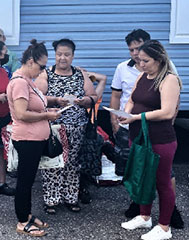
El día de acción de gracias es probablemente la más inclusiva de las celebraciones estadounidenses. Con base en el ideal de agradecimiento y unidad de la celebración de los peregrinos y los nativos Wampanoag. Las generaciones de estadounidenses después de 1621 han continuado dedicando un tiempo para agradecer a Dios Todopoderoso por todas sus bendiciones. Algunas de las razones que hacen de esta celebración una de las más importantes del año las encontramos en los discursos de presidentes el día que proclamaron la celebración de thanksgiving.
Aún antes de ser una celebración oficial, a pedido de las dos cámaras del congreso El Padre de la patria y primer presidente de los Estados Unidos de América, Jorge Washington lo proclamó en 1789 con las siguientes palabras “es deber de todas las naciones reconocer la providencia de Dios Todopoderoso, obedecer su voluntad, agradecer sus beneficios e implorar humildemente su protección y favor;”
Durante su vida como nación el país ha vivido tiempos muy duros, uno de ellos fue la guerra civil. Una guerra entre hermanos. En medio de esa confrontación el presidente Abraham Lincoln en 1863 pudo decir “Por lo tanto, invito a mis conciudadanos en todas partes de los Estados Unidos, y también a los que están en el mar y a los que están de paso en tierras extranjeras, a separar y observar el último jueves de noviembre próximo, como un día de acción de gracias y alabanza. a nuestro Padre benéfico que mora en los Cielos. Y les recomiendo que mientras ofrecen
las atribuciones que justamente le corresponden por tan singulares liberaciones y bendiciones, también, con humilde penitencia por nuestra perversidad y desobediencia nacional, encomienden a su tierno cuidado a todos los que han quedado viudos, huérfanos, dolientes o afligidos en la lamentable contienda civil en que estamos ineludiblemente comprometidos, e implorar fervientemente la interposición de la Mano Todopoderosa para sanar las heridas de la nación y restaurarla tan pronto como sea compatible con los propósitos divinos para el pleno disfrute de la paz, armonía, tranquilidad y Unión”.
El Presidente Gorge W Bush en 2005 proclamó de la siguiente manera: “El Día de Acción de Gracias es el momento para compartir nuestras bendiciones y celebrar las oportunidades que la libertad nos otorga. Los exploradores y colonizadores que llegaron a esta tierra a menudo agradecieron la extraordinaria riqueza que encontraron. Y hoy, seguimos agradecidos de vivir en un país de libertad y abundancia. Damos gracias por el amor de la familia y los amigos y le pedimos a Dios que siga guardando a los Estados Unidos de América.
Acción de gracias ha significado el reconocimiento de que somos una tierra bendecida y que la misericordia de Dios se mueve en medio de nosotros. La temporada de acción de gracias es el tiempo de la relación entre personas de diferentes culturas lenguas y razas que queremos vivir en paz como hermanos. Y que la única manera de lograrlo es siendo agradecido.
Las cosas buenas que nos rodean nos recuerdan de un Dios que nos ama y nos permite vivir en un país de paz, prosperidad y libertad. Este día de acción de gracias únete al espíritu correcto de esta celebración. Disfrutar lo que tenemos, agradece al Supremo dador de toda bendición y comparte tu agradecimiento y bendiciones con alguien más. Feliz día de acción de gracias. Dios te bendiga.
Saúl Carranza is the pastor at the Iglesia Familia de Dior in Dayton, MN. Email him at pastorcarranza@gmail.com or call (763) 245-2378.

El centro de distribución de comida en Centennial square park mobile home en Blaine es parte de Manna Market y Youthway Ministries. En esta comunidad de cerca de 500 casas móviles en el condado de Anoka los vecinos se han organizado para ayudarse unos a otros a través del proyecto de recuperación y distribución de comida.
Es motivador ver como el grupo de voluntarios se preparan durante toda la semana para organizar esta distribución de comida. Los miércoles desde muy temprano se movilizan para ir a diferentes lugares para recuperar comida y poder compartirla a las 5:30 de la tarde, con los vecinos que vienen buscando de esta ayuda. Carne, vegetales frescos, frutas y mucho más es puesto a disposición de las familias con el fin de aliviar la pesada carga de la canasta familiar.
El ministerio de Youthway y Manna market fue iniciado por Forrest y Nancy Gregory quienes dirigen el proyecto en las ciudades gemelas, el proyecto en Cenntenial square park es dirigido por Martha Limón y se realiza gracias a la participación de muchos voluntarios en su mayoría latinos que sin otra motivación que ayudar a su prójimo se esfuerzan por cargar y descargar comida, organizarla en los lugares de distribución y asegurarse que cada una de las docenas de familias que vienen al proyecto puedan llevar el alimento que necesitan para su familia.
Todos podemos aprender de estos voluntarios, porque cada uno puede hacer algo para ayudar a su prójimo y hacer de este mundo un mejor lugar para vivir. El mensaje bíblico de bienaventurado el que piensa en el pobre porque en el día malo lo librará el Señor. Es real y se manifiesta sensiblemente en esta comunidad en la que los vecinos se esfuerzan por ayudarse mutuamente. Muchas gracias a todos los voluntarios de Manna Marquet en Cenntenial Square Park. Dios los bendiga.
En un futuro cercano esperamos reiniciar el proyecto de apoyo a la juventud de Youthway ministries que se detuvo por la pandemia y apoyar a los adultos mayores de la comunidad a través del proyecto Ágape Seniors. Que bien hacen a este mundo las personas que piensan en su prójimo y que dan sus recursos y su tiempo para ayudar a los necesitados.
Saúl Carranza is the pastor at the Iglesia Familia de Dior in Dayton, MN. Email him at pastorcarranza@gmail.com or call (763) 245-2378.

Saúl Carranza, Coordinador de Ministerios Hispanos Iglesia del Nazareno
Por Saúl Carranza
Blessed is he who thinks of the poor; in the day of evil the LORD will deliver him.
—Psalm 41:1
In our land there are so many kinds of poverty and need. Hunger, nakedness, illness, loneliness, hopelessness, and violence are just some of the circumstances in which many people live and die because no one remembers to help them. Or no one has thought that they could. How different the world would be if we all thought about clothing, housing, feeding, healing, educating, and living in solidarity with those who suffer under oppression, injustice, violence, poverty, hunger, and disease.
It is easy to think that the responsibility to help those in needs rests with governments, charitable institutions, or their families. I think that was what Andrew the disciple thought when he said to Jesus, "Lord send these people to their house to eat." But it was not the tought of the divine master who said, "you feed them." The miracle of love cuased a child's lunch to feed a crowd. Mother Teresa of Calcutta used to say, "if you can't feed a hundred people feed only one."
In such a connected world we do not ignore the suffering of those affected by disease, hunger, storms, fires, migrations, and other men. But we can turn a blind eye and just think "poor people," "someone help," or change the channel. This is also a world of solidarity in which, if each of use sets out to feed one, dress at least one, help someone—we can make a better world for everyone.
During our 14 years as missionaries in Minnesota, we have tired to fulfill our ministry, helping people in need with food, clothing, education, advice, and many other ways to give hope and faith. We have brought joy to the hearts of many children by providing toys for Christmas. And also with a ministry to the children of inmates. Buet we feel that there is still a lot to do and a lot of good people who want to help others. For that reason, very soon we will channel all these efforts through a non-profit organization that will allow us to serve those in need in our area and give volunteers the opportunity to use their capacities and resources. Nazarene Compassion Center Agape, Inc. will officially begin its activities in September 2022. To serve and help the elderly, young people with problems, and loving support to those in need. This is an open door for those who hear the call "give them something to eat."
Showing compassion begins by reaching out to those in need, helping them with their needs, and sharing the need with others to network for help. There are many ways to serve our neighbors, both globally and locally. Try sharing food, doing chores, or volunteering your time. If there are global issues that God has placed on your heart, consider finding an organization near you that addresses those issues and ask how you can help. By doing so, you will discover how easy it is to make compassion a lifestyle. "Blessed is he who thinks of the poor. In evil day the Lord will deliver him."
Saúl Carranza is the pastor at the Iglesia Familia de Dior in Dayton, MN. Email him at pastorcarranza@gmail.com or call (763) 245-2378.

Saúl Carranza, Coordinador de Ministerios Hispanos Iglesia del Nazareno
Por Saúl Carranza
Tres de la mañana, suena el telefono. “ Papá, tengo problemas, la terjeta no funciona y no puedo tomar el proximo vuelo. Era mi hija, toda una profesional, se encuentra al otro lado del mundo y no le preocupa la hora. Ella tiene un problema y llama a quien siempre ha sido su paño de lagrimas, al que siempre soluciona todo. A papá. Me levanto, trato de despertarme y busco la mejor manera de ayudarla. Aunque ya sean profesionales, aunque sean adultos, para nosotros siempre serán nuestros niños y nosotros queremos estar allí para ayudarlos. Este relato lo compartió mi amigo el Dr Renë Rivas recientemente.
La palabra papá engloba mucho más que ese momento de engendrar. La paternidad nos hace crecer, despojarnos del egoismo y renunciar a nuestra comodidad y descanso para cuidar de esos pequeños seres a los que llamamos hijos. Cuan diferente sería nuestro mundo si todas las familias pudieran contar con padres y madres responsables.
Vivimos en una socieda que carece de padres responsables. Una gran cantidad de hijos se desarrollan y empiezan la vida sin esa figura que le de estabilidad y seguridad a su vida y la familia. El machismo de unos y la irresponsabilidad de otros hacen que la funcionalidad de la familia no se consolide. No nos enganchemos, aunque muchos padres y madres pueden crear bien a sus hijos, todo niño necesita a su lado un padre y una madre.
Un padre es un amigo, un consejero, un protector, un proveedor y muchas cosas mas. Pero por sobre todas las cosas debe ser quien de amoroso cuidado a su hijos. Por alguna razón Dios mismo escoge identificarse como nuestro Padre celestial, porque su amor desinteresado no conoce límites y su cuidado es para todas sus criaturas. Que importante recordar que los padres terrenales somos de alguna forma un reflejo de ese Padre bondadoso.
Por todo eso en este mes queremos felicitar y enviar un saludo respetuoso a todos esos padres responsables que han sabido dar lo mejor de si a sus famiias y que rennciando muchas veces a sus propios intereses lo han dado todo por su familia. Para ustedes nuestras felicitaciones y nuestros mejores deseos por un feliz dia del padre. Feliz dia del padre “mi querido viejo”. Dios los bendiga.

Saúl Carranza, Coordinador de Ministerios Hispanos Iglesia del Nazareno
Por Saúl Carranza
Los funerales sin un cadaver es una de las experiencias más tristes en un sentido y esperanzadoras en otro que realizamos en las iglesias. Cuando hijos o hijas vienen con el corazón destrozado a contarnos que ha fallecido uno de sus padres. La gran mayoría no tienen los recursos o las posibilidades de viajar a su país para sepultar a su padre o a su madrecita. Aunque la tecnología facilita la comunicación y las video conferencias facilitan el vernos a distancia. Nada puede sustituir el abrazo o el beso de la madre adorada. En esos casos ofrecemos el consuelo de la fe y la Palabra de Dios. Pero el dolor de esos hijos es muy grande.
El inmigrante ha dejado el terruño amado y se ha echado a cuestas una mochila de ilusiones y el sueño de un futuro mejor para él y para la familia que queda atrás. La motivación principal para la inmigración no es como muchos piensan, el buscar riqueza y aventuras. Aunque algunos pocos logran eso, la gran mayoría solo busca huir del hambre, pobreza y desesperación o aún peor, del “si no te vas te mueres”. La gente siempre ha buscado donde hay comida, trabajo, seguridad y oportunidades. A eso se le llama instinto de conservación. Y muy difícilmente vas a detenerte a pensar en las consecuencias cuando la vida está en juego. Aún en la historia de la Biblia leemos de Abraham, Jacob, y el mismo Jesús que tuvieron que dejar su tierra para ir a dónde podían vivir tranquilos.
La madre del Emigrante es el nombre dado a una estatua ubicada en Gijón, España. Es la figura de una mujer madura que mira al mar y extiende su mano, despidiendo a sus hijos. También es el nombre de dos poemas del mismo tema. El poema de Cándido Posada Sánchez cuenta la historia de la madre.
Era una viuda pobre…muy pobre que tuvo un hijo, y apenas éste se halló con fuerzas para luchar, cruzó los mares con la esperanza de hacerse rico, después que dijo que a su viejita no iba a olvidar.
Y el poema de Leom Kolmnela Cuenta la historia del hijo que dejo el hogar con lágrimas y con esperanza.
Pues aun siendo un hombre que nació para ser así, con gran coraje y al mismo tiempo cobarde. Llorando como un hombre mirando hacia ti, hacia ti mirando, mi estimada madre.
Un poema cuenta el dolor de la madre que sufre al no tener noticias del hijo amado y el otro el dolor del hijo que, aunque quiere no puede ir a ver a su madre. En uno se escucha el llanto de la madre que implora por una noticia. “Yo todavía gano el sustento con mi trabajo, yo no te pido que me mandes un capital. Háblame solo de tus victorias o tus fracasos”. Y en el otro el hijo cuenta de las humillaciones y maltratos que sufre lejos de la tierra amada.
Los dos poemas terminan con un sueño. En uno la madre en un postrer delirio sueña dar besos al hijo amado y en ese momento “le abrió las puertas la eternidad” En el otro el hijo se propone al menos un momento ir a ver a la madre “aunque sea en sueños”. Que tristeza. Esos son los funerales que mas duelen, el de los hijos que piden una oración por la madre que ya no vieron o la que olvidaron y solamente ante la noticia de su partida recordaron ese amor primero, el amor de la madre.
Pero, esa no tiene que ser la historia de todos los emigrantes, la madre amada, por muy lejos que se encuentre, no está mas lejos de una llamada telefónica, una video llamada o una carta, quizás a distancia de una visita. Pero si tienes la bendición de una madre que vive todavía, no esperes a que muera para enviarle flores, para contarle de tu vida, para decirle que la amas. La distancia nos separa, pero el amor une. Busca de todas las formas posibles hacerle saber a tu viejita que la amas y que piensas en ella. Y si ya no la tienes en este mundo eleva una oración a Dios agradeciéndole por ella.
Se acerca el día de la madre. No todas ellas son perfectas. Pero quién lo es en esta tierra. Dedica no solo ese día, sino siempre que puedas un momento para agradecerle por darte la vida y por todo lo bueno que te haya dado. Y dile. ¡Feliz día de la madre mamá!

Saúl Carranza, Coordinador de Ministerios Hispanos Iglesia del Nazareno
Por Saúl Carranza
“Agape” (amor sin condición) Es el nombre corto del Centro Nazareno de Compasión AGAPE INC. Esta es una nueva organización estableciéndose en Minnesota con la meta de servir a la comunidad hispana. La visión es luchar por una vida digna para todos. La pobreza tiene muchos rostros, no sólo el económico. Las necesidades del ser humano pueden ser muchas y muy variadas. Hambre, soledad, enfermedad, marginación falta de oportunidades o de cariño. Tantas cosas que hacen al ser humano ser o sentirse desdichado. El trabajo de Agape se enfocará en vestir, albergar, alimentar, sanar, educar y vivir en solidaridad con aquellos que sufren bajo opresión, injusticia, violencia, pobreza, hambre, y enfermedad.
Luchar contra la pobreza no es solamente proveer alivio para lo más terrible de sus consecuencias. Es eliminar las causas que llevan a sentir el dolor y la impotencia de quienes no tienen forma de enfrentar esos males. Muchas veces solo queremos calmar el hambre de una persona cuando ella tiene muchas más necesidades o aún más importante, ella misma puede calmar su hambre. Pero, no sabe cómo. Un sabio de la antigüedad dijo si le das un pescado a una persona calmarás su hambre de hoy pero mañana tendrá hambre nuevamente. Si le enseñas a pescar calmarás su hambre por toda la vida.
Nuestra meta en ágape es hacer ambas cosas, ayudar a solucionar el hambre de hoy, pero también permitir que la persona tenga la libertad de ser constructora de su propio futuro teniendo los recursos, conocimiento y las oportunidades que ella y su familia necesitan. La ignorancia, marginación, falta de oportunidades, egoísmo y falta de recursos son los principales obstáculos para alcanzar una vida digna. La respuesta que puede ayudar a superar estos obstáculos es la generosidad. El amor al prójimo.
Agapé, desarrollará programas de Apoyo al adulto mayor, para ofrecer a nuestros ancianos una mejor calidad de vida y bienestar. Dará apoyo educativo a nuestros jóvenes para que puedan competir y liderar el desarrollo de la nación. Capacitará a los adultos para que puedan tener acceso a mejores empleos, apoyará la integración de la comunidad hispana para que tenga acceso a salud, educación, desarrollo y promoverá la realización personal, emocional y espiritual de todos.
Realizar todos estos nobles anhelos requiere de muchos recursos y personas dispuestas a servir a su comunidad. Agapé pretende ser un puente entre aquellos que tienen necesidades y quienes pueden contribuir a satisfacer las necesidades de las personas. Donaciones, oraciones y voluntarios son necesarios para ayudarnos a alcanzar estas metas. Si usted quiere colaborar con esta organización de ayuda a los hispanos por favor comuníquese con nosotros a: Proyectos@amoragape.org y visite nuestra página web amoragape.org. Todos tenemos algo que podemos dar a los necesitados. Necesitamos de su apoyo. Ayúdenos a ayudar. Agape Inc. 6421 45th Ave. Crystal MN 55428.

Saúl Carranza, Coordinador de Ministerios Hispanos Iglesia del Nazareno
Por Saúl Carranza
Llegando al mes de febrero y la celebración del amor y la amistad la palabra amor adquiere un mayor significado. Comercial, familiar, de pareja o de amigos.
Sobre el significado de la palabra amor se ha escrito mucho. Libros, artículos, canciones, poemas y pensamientos. Y siempre habrá más formas de referirse al más noble de los sentimientos. Un sentimiento hermoso que puede encontrarse en el ámbito de la pareja, de la familia, de la amistad y aún se puede dar a los desconocidos. Pero, que, aunque se engloba solamente en las mismas cuatro letras. En cada caso tiene un significado muy diferente.
En el griego antiguo hay cuatro palabras que pueden traducirse como amor, pero cada una de ellas encierra un significado diferente de la palabra y un uso también diferente del amor. La palabra “Eros” se refiere al amor sexual, aquél que busca dar y recibir amor físico. La palabra “Filos” se refiere a la amistad, hermandad o amor no sexual que se otorga a las personas cuya compañía disfrutamos. “Storge” es el amor natural o instintivo y de protección que se da en el seno de la familia. El amor entre padres e hijos o hermanos. Y finalmente la palabra “Ágape” que se define como amor sin ningún interés. Un amor sacrificial que se otorga sin esperar nada a cambio. Simplemente por amar. El mayor ejemplo de este amor es el amor de Dios, quien nos ama sin ninguna condición y sin que nosotros podamos hacer algo por merecerlo. Es la clase de amor que se puede dar a aquél que no puede pagar o retornar nada porque no tiene nada que dar.
Durante este mes he estado investigando cuál es el segmento de la población hispana que tiene más necesidades. Con mucho interés y pena descubrí que los más desprotegidos entre la población hispana son los ancianos. Aunque no todos, pero hay muchos que no reciben una jubilación, que no tienen acceso a servicios públicos y que viven a expensas de la familia. Especialmente entre la población indocumentada envejecer en un país capitalista puede ser muy duro. Muchas veces abandonados en solitario pasan los días esperando que la familia regrese de la escuela o trabajo, otros tienen que esforzarse por trabajar muy duro en una edad en la que debieran ya estar descansando y aún hay quienes deben cuidar nietos o mascotas para ser útiles dentro de la familia y sociedad. ¿Conoce usted a algún anciano solitario o necesitado?
Recientemente leí el mensaje de un gimnasio que decía algo parecido a esto: “debido a las malas condiciones del clima el gimnasio estará cerrado, pero para no perder su rutina de ejercicio, tome su pala busque a algún vecino necesitado y limpie la nieve de la entrada a la casa de su vecino”. Algo así es al amor ágape. No porque me sobre algo, sino porque hay alguien que lo necesita yo debo ayudar. De eso es lo que habla la Biblia cuando dice: “Por consiguiente, mientras tengamos oportunidad, hagamos el bien a todos, y especialmente a los de casa, que son nuestros hermanos en la fe.” Gálatas 6:10.
Según tengamos oportunidad hagamos bien a todos. Que le parece si en este mes de febrero y siempre que se le presente la oportunidad busca formas de practicar el amor ágape. Hacer algo bueno por aquél que tiene necesidad, que no podrá devolverle el favor y que necesita una mano amiga, o una palabra de consuelo, o un pequeño empujón para salir adelante. “La religión verdadera y perfecta ante Dios, nuestro Padre, consiste en esto: ayudar a los huérfanos y a las viudas en sus necesidades y no contaminarse con la corrupción de este mundo.” Santiago 1:27.
Feliz mes del amor y la amistad. Feliz mes del “ágape”.

Saúl Carranza, Coordinador de Ministerios Hispanos Iglesia del Nazareno
Por Saúl Carranza
A todos nos gustaría escuchar una respuesta positiva a esta pregunta. Algunas personas invierten mucho tiempo y recursos tratando de adivinar o conocer cómo será el próximo año. Otros consultan horóscopos, adivinos o videntes tratando de conocer asuntos que les preocupan. Y aún hay quienes investigan y trazan proyecciones basadas en criterios científicos para describir un futuro muy posible. Con todo eso, sabemos que el futuro es caprichoso y que cualquier afirmación, aún la científica, son finalmente especulaciones con posibilidades de cumplirse.
Nuestra existencia se desarrolla entre tantas variables que la mayoría de pronósticos sobre el año 2022 se ven muy sombríos. Catástrofes naturales, hambrunas, conflictos globales, economías en crisis, empeoramiento o nuevas variantes de COVID-19 y problemas para ofrecer trabajo a todas las personas se encuentran entre las posibilidades más mencionadas entre lo que el año nuevo nos trae. A todo ello se une la crisis de la familia, pérdida de valores sociales y aislamiento individual. Aunque también hay cosas positivas. Se están haciendo esfuerzos importantes para revertir el cambio climático, se están dando pasos grandes para lograr la vacunación contra el COVID-19 y la pandemia nos está enseñando a cooperar más unos con otros. Aun así, la pregunta personal continúa. ¿Será el 2022 un buen año?
Saben, el paso del tiempo por si mismo no cambia nada, la tierra sigue su trayectoria inexorable hacia completar su órbita todo el tiempo. Las referencias establecidas por los seres humanos nos permiten saber cuando ha alcanzado ciertos puntos, de allí que además del nuestro, tengamos año nuevo chino, año nuevo judío y otros tantos calendarios. Pero en la realidad del universo nada cambia. Lo que cambia es nuestra percepción de los eventos y nuestras decisiones personales.
La naturaleza se renueva en cada estación dando lugar a nuevas etapas en su ciclo de vida y muerte. Esa renovación incluye una restauración de todo aquello que ya no sirve o no esta bien. Es bueno tener marcas en la vida que nos permitan evaluarnos a nosotros mismos, renovar lo que ya no funciona, cambiar lo que no está bien y renovarnos para ser mejores.
El cambio de año no hará nada por nosotros. El año nuevo no será ni bueno ni malo. Nosotros lo hacemos peor o mejor. Las circunstancias pueden ser favorables o desfavorables. Lo que para unos puede ser malo para otros es bueno y viceversa. Pero, la capacidad de cambiar las circunstancias nos ha sido dada por Dios. En el esfuerzo por lograr un mejor futuro Dios le dio esta clave a Josué. “Esfuérzate y se valiente, no temas ni desmayes, El Señor tu Dios estará contigo a donde quiera que vayas”.
Dios nos ha dotado de un extenso potencial lleno de valor y cualidades para alcanzar nuestras metas en la vida y no conformarnos a las circunstancias. El llamado de Dios es a saber que, con trabajo y empeño, con fe y esfuerzo podemos mejorar. Y que cuando nuestras fuerzas y recursos no alcanzan podemos confiar en un Dios todopoderoso que siempre está a nuestro lado para ayudarnos a triunfar. Jesús lo dijo de esta forma: “Yo les he dicho estas cosas para que en mí hallen paz. En este mundo afrontarán aflicciones, pero ¡anímense! Yo he vencido al mundo.” Juan 16:33 RVI. Con todo esto, no se preocupe si el año será bueno o malo. Mejor, busque en Dios la fuerza y el valor para hacerlo el mejor año de su vida. Feliz año nuevo.
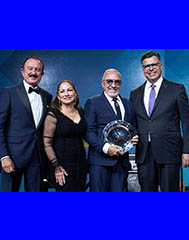
L’ATTITUDE Founders, (L to R) Sol Trujillo, Gloria Estefan, Emilio Estefan, Gary Acosta
By Claud Santiago
Members of the National Association of Hispanic Real Estate Professionals (NAHREP) Twin Cities Chapter, attended the L’ATTITUDE national conference. The event was held in San Diego, CA, in late September. The event featured some of the nation’s leading CEO’s, Congressional small business champions, preeminent investors, innovative entrepreneurs, famous celebrities and emerging entertainment talent. “ We were pleased to join the thousands of Latino business, media and civic leaders from throughout the United States, who attended this amazing event “ stated Isaac Contreras, who is President of the local NAHREP Twin Cities chapter, nahreptwincities.org/.
L’ATTITUDE is a business based national initiative focused on helping enlightened executives understand The New Mainstream Economy and the U.S. Latino cohort that is driving it. The national platform showcases the contributions of U.S. Latinos in business, media, politics, science, and technology. L’ATTITUDE is focused on changing the narrative of who we are as a nation and who the drivers of growth are for the next few decades. Founded in 2018 by international business executive Sol Trujillo and NAHREP Co-Founder & CEO Gary Acosta, L’ATTITUDE was built to showcase the contributions of U.S. Latinos in business, media, politics, science, and technology. In 2019 internationally acclaimed producer, director, entrepreneur, and author, Emilio Estefan joined Trujillo and Acosta as a partner in L’ATTITUDE to play an active role in leveraging his important business & industry connections, curating emerging entertainment talent, and producing event-related materials into the L’ATTITUDE event. L’ATTITUDE 2022 will be held in San Diego, CA in the Fall.
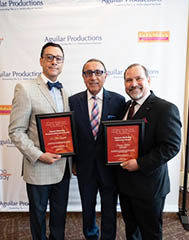
Dr. Jake Beniflah, Rick Aguilar, and Danny Vargas
The 25th Annual Hispanic Marketing Conference & Awards, produced by St. Paul based Aguilar Productions, was held on August 5, 2021 at Neighborhood House at Wellstone Center in St. Paul. The conference was sponsored by Comcast, U.S. Bank and NAHREP Twin Cities. “ We had a wonderful conference, great speakers, a capacity turnout of Marketing, Civic and Business leaders, a wonderful lunch served by Amalia Moreno-Damgaard, Chef, Author/ Business leader and our awards presentation to national Latino marketing leaders” stated Rick Aguilar. President of Aguilar Productions.
The conference attendees were impressed with the presentations from the keynote presenters, Danny Vargas, Founder and President of Varcom Solutions, Herndon, VA and Dr. Jake Beniflah, Founding Executive Director of the Center for Multicultural Science, Los Angeles, CA. Both of the presenters, were recipients of the annual Hispanic Marketing Achievements Awards.
Aguilar Productions, was honored for the longevity of the annual conference, by the Hispanic Marketing Council, a national organization made up of the leading U.S. Latino marketing professionals, corporate members and supporters.
“We are looking forward to our 26th annual Hispanic Marketing Conference in 2022 and beyond.” – Rick Aguilar, Aguilar Productions
“Wonderful conference, U.S. Bank is proud to support this initiative.” - Rene Madrid, U.S. Bank
“Comcast is a proud supporter of the Hispanic Marketing Conference.” - Diego Classen, Comcast Unidos ERG
“Great conference, wonderful speakers, so happy to participate.” - Isaac Contreas, President, NAHREP Twin Cities
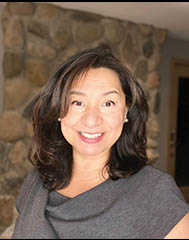
Adriana O'Meara, CEO of Lakeshore Partners
I have been following the conversations and reading about what many are calling “The Great Resignation”. If you have not heard about it, google it. There are thousands of articles about the topic that will bring you up to speed on this term. In sum, as the world is opening, people are leaving their jobs in search of more money, more flexibility, and more happiness. According to some articles, the pandemic brought awareness to the value of time and how we were living our lives as many of us found ourselves in challenging work environments. A record 4 million workers in the U.S. quit just in April, just as employers are facing labor shortages. In fact, I have been hearing from some of my clients talk about this, and I have cautioned them that following this popular trend could turn out to be harmful to their careers and most importantly to their well-being. My advice? Be strategic. Easier said than done. This is extremely hard when you are burned out or exhausted as a result of unrealistic expectations from your employer. However, in my experience, there’s light at the end of the tunnel.
You have what people want
As an Executive Coach, I find myself repeating this phrase over and over to my clients. On paper, you have the dream job that hundreds of people would love to have including a steady and healthy paycheck. The truth is that it has taken you a lot of years to build your brand and get to the position that you currently are enjoying at your company, so the best plan of action might be to keep doing your job, while at the same time looking for new opportunities and work on building healthy boundaries for yourself and protecting your time. Don’t forget that it is easier to get a new job when you have a job as you are more attractive to employers. However, as your coach, I would always advocate for protecting your health first as that’s the foundation of everything. Without health, you have nothing.
Trusting and owning your voice
Post-pandemic, people are rethinking what work means to them, how they are valued, and how they spend their time. Those are great questions to ask yourself anytime, and not only post-pandemic.
Remember that the grass is not always greener on the other side of the fence. To move your career to the next level and develop yourself as an executive leader, you need to articulate and negotiate stronger boundaries for yourself.
Moving from burnout into thriving
Change is inevitable, and quitting, in most cases, is not the answer. What is important to harness here are your priorities and articulating those to your employer. In this case, above all protect your health and well-being, and your career success will follow.
Adriana O’Meara is an award-winning business strategist as well as CEO of Lakeshore Partners, a company that provides Strategic Growth Consulting and Executive Coaching services across multiple industries.
Adriana partners with owners and executives with demanding goals and busy lives to fast-track business growth and increase bottom-line profits in this rapidly changing environment by using her proven proprietary business growth model. For a complimentary discovery consultation on how to take your business to the next level, contact her at (952) 239-3928 or email her at Adriana@lakeshorepartners.net

Adriana O'Meara, CEO of Lakeshore Partners
From the minute we are born and as young girls, we are taught to take less space. We are taught to make room for the other people around us. We are taught to be quiet, be slimmer, follow the rules, take care of others, and even make space for men, make them feel powerful and validated. Even at the cost of our own dreams, health, self-confidence, or worth. This pattern continues even after we graduate from college, get married, and have children. We lose ourselves under all the responsibilities that we need to accomplish. I see this pattern over and over. The unattainable demands that we, as a society, place on women. To look a certain way, go to work, take care of the children, and sometimes even aging parents. It is no wonder why I see so many women in leadership burned out and exhausted. For this common pattern to end, we must bring more awareness to this important issue. That is the reason that I have made it my mission to empower 1 million women to trust, own and use their voice.
What does owning your voice mean?
Owning your voice is a process that begins by trusting your inner voice, which in turn, it allows you to present and protect your views and ideas without fear of being criticized or judged. This is the part that I called owning your voice. With practice, this progresses to using your voice by exercising your decision-making power in promoting those ideas or projects. This is the springboard that allows you to stop playing small. That allows you to stop the people-pleasing behaviors that are costing you your health, your sanity, and your wellbeing.
Therefore, the best way to improve women’s health, in my opinion, is by owning our voice. Once you own your voice, everything falls into place. Your time management improves and your productivity skyrockets. You are able to trust your team and delegate fully. You build stronger boundaries for yourself and for your time. You get promoted. You no longer tolerate toxic relationships. You focus on what is important for you in attaining the goals you consciously decided to go after. You are no longer living your life for others, and instead you are prioritizing your health by making space for yourself and self-care.
Moving forward
As business owners and executives, owning our voice is reflected in crafting the mission and vision for our companies, and fostering a culture that allows team members to flourish using their talents and strengths. We are also responsible for mentoring and supporting top talent and the next generation of female leaders to have a seat at the table in order to have a healthier society.
In closing, my invitation here is for you to reflect on the times when you were not trusting your inner voice, on the times you stayed silent, and the times you allowed others to run with their agendas at the cost of your own health. Then ask yourself what are the 3 things that I am no longer willing to tolerate?
Adriana O’Meara is an award-winning business strategist as well as CEO of Lakeshore Partners, a company that provides Strategic Growth Consulting and Executive Coaching services across multiple industries.
Adriana partners with owners and executives with demanding goals and busy lives to fast-track business growth and increase bottom-line profits in this rapidly changing environment by using her proven proprietary business growth model. For a complimentary discovery consultation on how to take your business to the next level, contact her at (952) 239-3928 or email her at Adriana@lakeshorepartners.net
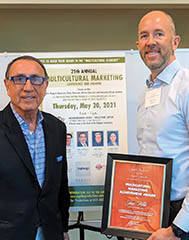
Rick Aguilar and Jose Villa, founder and president of Sensis
The 25th annual Multicultural Marketing Conference & Awards was held on May 20, 2021 at the Wellstone Center in St. Paul. The conference was presented by Aguilar Productions, the leader in promoting the multicultural markets in the U.S. This full day conference drew an audience of marketing professionals from various organizations and businesses who were treated to an outstanding array of presentations. The conference was presented “live” and in-person, much to the delight of the attendees.
Presenters included Jose Villa, founder and president of Sensis, Los Angeles, CA, Rico Vallejos, marketing creative director, Minneapolis, E.G. Garza, former president of NAHREP Twin Cities, Isaac Contreras, current president of NAHREP Twin Cities and Andy Noble, founder of the Multicultural Agents Council. Isaac Contreras, E.G. Garza, and Andy Noble, all work at Keller Williams Integrity Realty, Roseville, MN.

Adriana O'Meara
CEO of Lakeshore Partners
By Adriana O’Meara
Listen, I have great news for you. According to The Conference Board® Global Consumer Confidence Survey, the global consumer confidence index soared to record heights in the first quarter of 2021.
As the pandemic subsides, the survey found that the overall Global Consumer Confidence Index shot up from 98 in the fourth quarter of 2020 to 108 in the first quarter of 2021 (a figure above 100 is considered positive). This figure exceeded the reading of 106 registered in pre-pandemic Q1 2020 and is the highest recorded since the survey began in 2005. So, my question to you is what should you do differently to take advantage of this economic opportunity?
Do things differently or do different things!
Now that the pandemic is subsiding it is time to either do things differently or do different things. A subtle difference that produces quite different results. In looking ahead, expecting to get better results from the same old behavior not only is the definition of insanity but will only perpetuate more pain and perhaps digging deeper into an economic hole. Consequently, doing nothing differently will not get you to the high-performance level that you are seeking to get for yourself and your business. Thus, it is the perfect time to re-assess what other skills, strategies or solutions can you leverage to move forward?
Remember what got you here, won’t get you there.
As a result of years of coaching, a critical business discipline that has allowed me and my clients to continually grow, improve and succeed has been assessing our performance.
How would this look like for you? It is all about measuring and reflecting upon past performances, reviewing what you did right, what you did wrong and how can you do better?
Not only that, but you also need to get brutally honest with yourself as things need to change first with you as a leader, for things to get better in your business. Remember past successes or skills may not help you to create the success you crave and the results you are currently seeking. The honest answers to the questions in this article will determine your level of success and happiness for 2021 and going forward.
How would you pivot?
In closing, I want to leave you with these questions to ponder over your morning coffee. If you were certain that you were not able to fail at something new, what would you try? what new partnerships would you forge? what new skills would you learn? what would you stop doing? what would you do to ride this economic wave?
Adriana O’Meara is an award-winning business strategist as well as CEO of Lakeshore Partners, a company that provides Strategic Growth Consulting and Executive Coaching services across multiple industries.
Adriana partners with owners and executives with demanding goals and busy lives to fast-track business growth and increase bottom-line profits in this rapidly changing environment by using her proven proprietary business growth model. For a complimentary discovery consultation on how to take your business to the next level, contact her at (952) 239-3928 or email her at Adriana@lakeshorepartners.net

Adriana O'Meara
CEO of Lakeshore Partners
By Claud Santiago
For CEOs, owners, and executives, it gets lonely at the top. Without a mentor and accountability partner, many business leaders find themselves hitting the ceiling on what they can achieve. Whether you’re a business professional struggling to earn a promotion or a business owner unsure of your next move, the right Executive Coach can set you on a productive path to success.
Leaders help develop teams, and executive coaches help develop leaders. Executive coaches challenge leaders to develop their strengths, identify and mitigate weaknesses, and grow as individuals. The emphasis is on leadership growth, getting out of the weeds to work on the vision of the organization, and developing the team that will help implement that vision.
In a successful partnership with an executive coach, you would benefit from:
• Increased individual performance, productivity, and confidence
• Clarity on what success looks like and the steps needed to achieve
• Development of critical soft skills and decision making
• Accountability and growth
• Greater self-awareness and mindset
Adriana O’Meara is an award-winning business strategist as well as CEO of Lakeshore Partners, a Minneapolis-based company that provides Strategic Growth Consulting and Executive Coaching services across multiple industries including health care and technology.
Adriana is a trusted leader with 20+ years of experience and a proven track record developing products and building companies from idea generation to implementation. Corporations that benefitted from her expertise include Cargill and UnitedHealth Group. Adriana served as a board member to the Minnesota Council on Latino Affairs for eight years in different capacities including treasurer. Adriana holds a Bachelor of Arts in international relations & political economics from the University of Minnesota and a master’s Certificate in Executive Coaching from the University of St. Thomas in St. Paul.
Adriana partners with owners and executives with demanding goals and busy lives to fast-track business growth and increase bottom-line profits in this rapidly changing environment by using her proven proprietary business growth model. For a complimentary discovery consultation on how to take your business to the next level, contact her at (952) 239-3928 or email her at Adriana@lakeshorepartners.net

Por Saul Carranza
“Por tanto, el Señor mismo les dará esta señal: Una virgen concebirá y dará a luz un hijo, y Le pondrá por nombre Emmanuel (Dios con nosotros).”— Isaías 7:14.
Este ha sido un año totalmente inusual. A nivel mundial se han dado terribles catástrofes. La Pandemia que a la fecha ha contagiado a más de 61 millones de personas y ha cobrado la vida de más de un millón cuatrocientos mil personas. El hambre, la pobreza, el calentamiento global y la crisis de los desplazados. Es todo muy triste. Pero no es lo único. En el año del Covid-19 también hemos tenido terremotos, huracanes, la plaga de langostas que comenzó en África y llegó a Sur américa. Los terribles incendios en Australia y Norte américa y las violentas manifestaciones que a nivel mundial se dieron contra la injusticia racial. Realmente ha sido un año muy duro y esto sin contar las crisis personales, aquello que nos ha tocado sufrir solos. Solo Dios y usted saben cómo pasaron estos meses.
Pero este tiempo de fin de año tenemos la bendición de celebrar el hecho de que Jesús el Hijo de Dios nació y nos trajo esperanza, fe y paz. Todo lo que el mundo de este año necesita. Muchos ponen sus esperanzas en el trabajo, en la economía o en el gobierno. Todo eso no ha evitado los males de este año. Yo quiero invitarte a que confíes en Dios. Para Él nada es imposible y te ama con amor eterno. Que te encamines hacia la época navideña con la confianza plena que Jesús hace nuevas todas las cosas. Y que aún en un año tan difícil no te ha dejado solo(a).
Hemos llegado al periodo de adviento. Este término viene del latín “adventus Redemptoris” que significa la venida del Redentor. Los cristianos recordamos en este tiempo que “Emanuel” ha venido. Y nos preparamos para celebrar su venida. En tiempos muy difíciles el profeta Isaías escribió que la esperanza del mundo se cumpliría cuando una virgen diera a luz un niño a quién llamarían Emanuel. Porque ese niño sería literalmente Dios con nosotros. En este tiempo en el que todas estas situaciones adversas nos han demostrado que no tenemos control sobre el mundo que nos rodea y que cualquier cosa puede alterar el curso normal de la vida. Qué bueno es recordar que no estamos solos. Que Dios no nos ha dejado abandonados en ningún momento. Y que su sombra protectora está cerca de los que le buscan.
Aunque sabemos que el cambiar el numero de año no significa que las cosas necesariamente van a ser diferentes. Si tenemos la esperanza de que va a suceder y nos encomendamos a Dios para que Él bendiga nuestros pasos y nos conceda un buen año nuevo. La fe es el ejercicio de la confianza en quien tiene poder para ayudarte en aquello que tu no puedes cambiar. El redentor ya vino se llama Jesús y dijo “Yo he venido para que todos ustedes tengan vida, y para que la vivan plenamente." Y confiando en esa promesa te invito a disfrutar en familia esta navidad y tener confianza que el año próximo será mucho mejor. Le pido a Dios te conceda una feliz navidad y un muy bendecido año 2021.
El Pastor Saúl Carranza originario de Guatemala es el Coordinador de Ministerios Hispanos de la Iglesia del Nazareno para Minnesota y las Dakotas. pastorcarranza@gmail.com

Por Saul Carranza
La historia del día de acción de gracias dice que en 1621 un grupo de peregrinos ingleses en Plymouth, Massachussets, compartió una comida con los indígenas Wampanoag para celebrar la cosecha de otoño. Este grupo llegó en el barco Mayflower huyendo de la persecución religiosa en Europa. Pero después de un trágico año en el que en el que sin el favor de Dios y la compasión de los nativos todos hubieran muerto por el hambre, frio y enfermedades. Aunque solo la mitad sobrevivió. Reconocieron que era justo agradecer por la vida, por la primera cosecha y por un futuro prometedor.
Esa historia de triunfo y sufrimiento se parece mucho a la que algunas familias han tenido que vivir en este año. Aunque el 2020 no ha terminado de escribirse. El llegar al mes de acción de gracias nos ofrece la oportunidad para preguntarnos: ¿en un año tan irregular y difícil, por qué estar agradecidos? Seguramente usted ha escuchado muchas quejas sobre este año. La pandemia, incendios, crisis económica, huracanes, terremotos, pérdida de trabajos, cierre de escuelas y quien sabe que tantas cosas más.
Se cuenta que una vez asaltaron al Pastor Matthew Henry, el famoso comentarista bíblico del Siglo XVIII y cuando algunos de sus amigos le preguntaron cómo se sentía Henry les contestó: “Me siento muy agradecido con Dios... de hecho, tengo cuatro cosas por las cuales estarle agradecido en cuanto a esto que me ha pasado. Primero, le estoy agradecido porque es la primera vez que me asaltan. Segundo, le estoy agradecido porque me robaron la bolsa y no me quitaron la vida. Tercero, le estoy agradecido porque, aunque se llevaron todo lo que tenía encima, no era mucho. Y cuarto, le estoy agradecido porque me robaron a mí y no fui yo quien robó”.
Aún en la más difícil de las pruebas siempre hay una buena razón para dar gracias. Si tenemos vida, si tenemos una familia que nos ama, si tenemos un techo, un plato de comida y tenemos esperanza podemos decir: “Gracias Dios por todas tus bendiciones sobre mí”.
Pero quizás nadie como el Expresidente Abraham Lincoln en su proclama de 1863 quien después de mencionar todas las bendiciones recibidas en medio de una encarnizada guerra dijo:
“Por lo tanto, invito a mis conciudadanos en todas partes de los Estados Unidos, y también a aquellos que estén en el mar y aquellos que estén viajando en tierras extranjeras, a apartar y observar el último jueves de noviembre próximo, como un día de Acción de Gracias y Alabanza a nuestro caritativo Padre que mora en los cielos. Y les recomiendo que al ofrecer las atribuciones que justamente se le deben por tales bendiciones y liberaciones, también, con humilde penitencia por nuestra desobediencia y perversidad nacional, encomienden a su tierno cuidado a todos aquellos que se han convertido en viudas, huérfanos, enlutados o sufridos en la lamentable lucha civil en la que estamos comprometidos ineludiblemente, y que imploren fervientemente la interposición de la Mano Todopoderosa para sanar las heridas de la nación, y para que la restaure tan pronto como sea consecuente con los propósitos Divinos para el completo disfrute de paz, armonía, tranquilidad y Unión”.
Claro que tenemos mucho porque estar agradecidos y celebrar los pequeños y grandes milagros con los que Dios nos bendice cada día. Los CDC hacen las siguientes recomendaciones para su celebración de acción de gracias.
• Tener una cena pequeña solo con personas que viven en su hogar
• Preparar recetas tradicionales para familiares y vecinos, especialmente aquellos con mayor riesgo de enfermedad grave por COVID-19, y entregarlas de una manera que no implique el contacto con otras personas
• Organizar una cena virtual
• Comprar en línea en lugar de en persona el viernes después del Día de Acción de Gracias o el próximo lunes
• Ver eventos deportivos, desfiles y películas desde casa
Por favor tómelo en cuenta y disfrute un muy feliz día de acción de gracias.
Saúl Carranza
Coordinador de Ministerios Hispanos Iglesia del Nazareno.
(763)245-2378; pastorcarranza@gmail.com

Por Saul Carranza
Jeremías 29:5-7
“Ya que están allí, construyan casas y vivan en ellas. Cultiven sus granjas y coman los frutos que allí se den. Cásense y tengan hijos; no dejen que su población disminuya. Asegúrense de que sus hijos e hijas también se casen y tengan hijos. Además, trabajen para que prospere la ciudad. Rueguen por ella, pues si la ciudad prospera, también ustedes prosperarán.”
Las palabras que él profeta Jeremías pronunció más de 500 años antes de Cristo en una horrible situación de sufrimiento del pueblo de Israel fuera de su tierra, parecieran describir la actitud del bravo pueblo hispano de los Estados Unidos durante esta pandemia.
Los datos de la oficina del censo informan que en algún momento de 2019 los latinos superamos los 60 millones en Estados Unidos. Una de cada 6 personas que habitan en este país se identifican como hispano o latino(a). Esto nos ubica como la minoría étnica más grande, 18.3%, y una de las de más rápido crecimiento en el país.
Pero el número no es lo más importante de la población hispana, sino su aporte a la vida del país. Generalmente al llegar el mes de la herencia hispana. 15 de septiembre a 15 de octubre, se honra a personalidades latinas destacadas en los deportes, la economía, la milicia, Las ciencias, las artes y muchos más. Y ciertamente, estamos muy orgullosos por el aporte de ellos y ellas. Son el rostro de “la raza” en los altos niveles de la multifacética sociedad americana. Pero es también, en los grandes desafíos cuando aparecen las grandes respuestas de aquellos que generalmente están detrás del escenario, de los que no dan la cara frecuentemente pero que siempre están allí. Los héroes anónimos.
La pandemia del covid-19 ha mostrado el valor de millones de héroes que sin buscar renombre se han entregado en alma y cuerpo a mantener funcionando el país. Los latinos hemos llevado lo peor de los contagios con más del cuarenta por ciento. Y una de las razones para tan alto nivel de contagios es que su trabajo es vital y urgente para el país. No se puede detener. En el campo de la salud, como médicos, enfermeros ayudantes o personal de limpieza y desinfectando escuelas, hospitales, edificios públicos, supermercados, etc., En el servicio público como policías, bomberos, psicólogos, pastores etc.
Las estadísticas de la pandemia testifican con cifras de contagios, muertes y recuperados que los hispanos no se han movido de su lugar de servicio. Y tal vez, el más golpeado, muy importante, y poco reconocido ha sido el sector campo y alimentación. Decenas de miles han estado trabajando para que no falte carne, leche, legumbres y todo lo indispensable en la mesa de cada hogar americano. Qué importante es el trabajo hispano en la vida nacional.
A Cada uno de los héroes y heroínas que arriesgando salud, vida y bienestar familiar han seguido fielmente sirviendo al país. Hoy decimos; muchas gracias. Y nuestra oración es que Dios siga bendiciendo su vida, les dé salud, fuerza y que salgamos pronto de esta pandemia para que el país siga prosperando, porque en su bendición nosotros somos bendecidos también, y en la paz del país, todos tenemos paz.
Saúl Carranza
Coordinador de Ministerios Hispanos Iglesia del Nazareno.
(763)245-2378; pastorcarranza@gmail.com
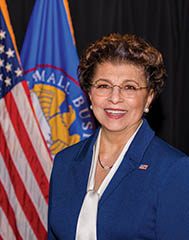 Jovita Carranza: SBA Administrator
Jovita Carranza: SBA Administrator
Jovita Carranza serves as the 26th Administrator of the U.S. Small Business Administration (SBA). As a member of President Trump’s Cabinet, she advocates on behalf of the 30 million small businesses in America. In her role as Administrator, she leads a team of professionals dedicated to ensuring entrepreneurs located across America have the support and resources they need to start, grow, and expand their small businesses, and recover in the event of a declared disaster.
Prior to leading the SBA, Administrator Carranza served as Treasurer of the United States at the U.S. Department of the Treasury under President Donald J. Trump. In her role as a principal advisor to Secretary Mnuchin, Carranza focused on increasing participation in our vibrant economy by fostering financial capability and sustainability.
Administrator Carranza is a Chicago native and founder of a small business consulting company. She previously served as the Deputy Administrator for the SBA under former President George W. Bush, where she received a bipartisan, unanimous confirmation by the U.S. Senate.
Before her first SBA appointment, Carranza had a distinguished 30-year career at United Parcel Service (UPS), where she was the highest-ranking Latina in the history of the company. She started as a part-time, night-shift box handler and worked her way up to President of Latin America and Caribbean operations.
Administrator Carranza earned her MBA from the University of Miami in Coral Gables, Florida and received executive, governance, management, and financial training at the INSEAD Business School in Paris, France; Michigan State University; and the University of Chicago.
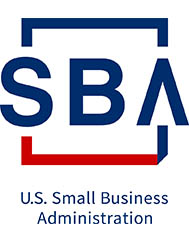 Administración de Pequeñas Empresas de los Estados Unidos
Administración de Pequeñas Empresas de los Estados Unidos
MINNESOTA Declaración Núm.16365 (Desastre: MN-00080)
Incidente: CORONAVIRUS (COVID-19)
Ocurriendo: 31 de enero de 2020 y continuando
Todos los condados del estado de Minnesota; los condados contiguos de Iowa de: Allamakee, Dickinson, Emmet, Howard, Kossuth, Lyon, Mitchell, Osceola, Winnebago, Winneshiek y Worth; los condados contiguos de North Dakota de: Cass, Grand Forks, Pembina, Richland, Traill y Walsh; los condados contiguos de South Dakota de: Brookings, Deuel, Grant, Minnehaha, Moody y Roberts; y los condados contiguos de Wisconsin de: Buffalo, Burnett, Douglas, La Crosse, Pepin, Pierce, Polk, Saint Croix, Trempealeau y Vernon
Fecha límite de radicación de solicitudes: 21 de diciembre de 2020
Se dispone de asistencia para préstamos en caso de desastre:
Préstamos para desastres por daños económicos (EIDL), por sus siglas en Ingles - Préstamos de capital de trabajo para ayudar a las pequeñas empresas, las pequeñas cooperativas agrícolas, las pequeñas empresas dedicadas a la acuicultura y la mayoría de las organizaciones privadas sin fines de lucro de todos los tamaños a cumplir con sus obligaciones financieras ordinarias y necesarias que no se pueden cumplir como resultado directo del desastre. Estos préstamos tienen por objeto prestar asistencia durante el período de recuperación del desastre.
Requisitos de crédito:
• Historial crediticio: Los solicitantes deben tener un historial crediticio aceptable para la SBA.Tasas de interés:
La tasa de interés se determina mediante fórmulas establecidas por la ley y son fijas durante la vida del préstamo. La tasa de interés máxima para este programa es de 3.75 por ciento.
Términos del préstamo:
La ley autoriza los términos del préstamo hasta un máximo de 30 años. La SBA determinará un pago de cuotas apropiado basado en la condición financiera de cada prestatario, que a su vez determinará el término del préstamo.
Límite del monto del préstamo:
La ley limita los EIDL a 2.000.000 de dólares para aliviar los daños económicos causados por el desastre. El monto real de cada préstamo se limitará al daño económico determinado por la SBA, menos el seguro de interrupción del negocio y otras recuperaciones hasta el límite de préstamo administrativo. La SBA también considera las contribuciones potenciales que están disponibles de la empresa y/o su(s) propietario(s) o afiliados. Si una empresa es una fuente importante de empleo, la SBA tiene la autoridad de eliminar el límite legal de 2.000.000 de dólares.
Restricciones de elegibilidad de préstamos:
Incumplimiento - Los solicitantes que no hayan cumplido con los términos de los préstamos anteriores de la SBA pueden que no sean elegibles. Esto incluye a los prestatarios que no mantuvieron el seguro contra inundaciones y/o el seguro contra riesgos requerido en los préstamos anteriores de la SBA.
Nota:
Los solicitantes de préstamos deben consultar con las agencias / organizaciones que administran cualquier subsidio u otro programa de asistencia bajo esta declaración para determinar cómo la aprobación de un préstamo para desastres de la SBA podría afectar su elegibilidad.
Refinanciamiento:
Los préstamos para desastres por daños económicos no pueden ser usados para refinanciar deudas a largo plazo.
Requisitos de seguro:
Para proteger a cada prestatario y a la Agencia, SBA puede exigirle que obtenga y mantenga un seguro apropiado. Por ley, los prestatarios cuya propiedad dañada o colateral se encuentre en un área especial de peligro de inundación deben comprar y mantener un seguro contra inundaciones. La SBA exige que la cobertura del seguro contra inundaciones sea la menor de las siguientes: 1) el total del préstamo total para desastre, 2) el valor asegurable de la propiedad, o 3) el máximo seguro disponible.
Los solicitantes pueden hacer su solicitud en línea, recibir información adicional de asistencia en caso de desastre y descargar las solicitudes en https://disasterloan.sba.gov/ela. Los solicitantes también pueden llamar al Centro de Servicio al Cliente de la SBA al (800) 659-2955 o enviar un correo electrónico a disastercustomerservice@sba.gov para obtener más información sobre la asistencia para desastres de la SBA. Las personas sordas o con problemas de audición pueden llamar al (800) 877-8339. Las solicitudes completas deben enviarse por correo a la U.S. Small Business Administration, Processing and Disbursement Center, 14925 Kingsport Road, Fort Worth, TX 76155.
 Consejos para buscar información médica correcta
Consejos para buscar información médica correcta
¿Alguna vez una amistad o un familiar le ha dado un consejo médico y ha querido comprobarlo en Internet? ¿Alguna vez ha tenido dudas sobre vacunas y ha buscado información en Internet? Si bien hay mucha información disponible en línea, algunos datos pueden ser incorrectos y crear confusión. ¿Cómo se puede saber qué sitios informativos son adecuados y qué sitios deberían evitarse? Estos son algunos consejos para ayudarle a buscar en Internet.
1. Acuda a los expertos. De la misma manera que usted no contrataría a un mecánico de automóviles para arreglar un problema eléctrico en el hogar, necesitamos que encuentre los expertos médicos adecuados para obtener información médica fiable. Observe quién patrocina el sitio web. Esto podría darle una pista acerca del objetivo de la misma. Las páginas web de hospitales y clínicas, agencias gubernamentales y sistemas educativos son un buen punto de partida. Busque direcciones web que acaben en .edu o .gov.
2. Preste atención si hay signos que indican que la información no es fiable. Si el sitio web le intenta vender algo, tenga cuidado. Es posible que la información esté escrita para que compre el producto. Si el consejo es algo que contradice lo que había escuchado hasta ahora, la información podría hacerle creer algo que no es cierto. Si el sitio web no incluye pruebas de lo que se afirma, busque otras fuentes adecuadas de información.
3. Tenga en cuenta que una historia personal puede ser emotiva y hacernos creer lo que se dice en la misma. Sin embargo, es posible que la información no tenga una base científica. Hay muchas historias en YouTube y otras redes sociales, pero estos no son siempre los lugares adecuados para encontrar información objetiva. Ya que desconocemos el historial médico de la persona que cuenta su historia, únicamente estamos escuchando una pequeña parte de una situación mucho más amplia. Se necesita una persona experta para presentar los datos en conjunto y establecer una conclusión correcta.
Entonces, ¿dónde puede comenzar cuando desea obtener información fiable y de confianza sobre vacunas u otros asuntos médicos? Puede preguntarle a su proveedor de atención médica en todo momento. Su proveedor tiene las respuestas y puede orientarle para obtener información adicional en la que puede confiar. La biblioteca es otro lugar que puede ayudarle a encontrar información correcta. Pida ayuda al personal bibliotecario para acceder a sitios web fiables. Minnesota Department of Health tiene a su disposición un listado de fuentes de confianza con información sobre vacunas. Puede acceder a este listado a través de www.health.state.mn.us/immunize y buscar “información fiable”.

There are over two million Latina-owned businesses in the U.S.
By Patricia Guadalupe
Marleny Rivas was at home one night watching television and trying to figure out what to do next after getting laid off from her job at a major corporation in California. Rivas had been selling her very popular homemade Salvadoran food on the side to friends and coworkers, making a good amount of extra money. She had been thinking about possibly doing it full time but wasn’t sure how to go about it.
Then, she saw a commercial for free and low-cost business classes at her local community college focusing on the nuts and bolts of entrepreneurship, and that turned things around for her. “I took classes on everything about starting a new business, how to put a business plan together, what kind of loans might be available, all of it,” she says.
A Fast-Growing Segment
Not long after launching, Rivas had three locations and a lunchtime food truck, a mere 12 years after immigrating to the United States from El Salvador. This way, Rivas joined the fastest-growing segment of the small business industry in the United States—Latina-owned businesses.
There are over two million Latina-owned businesses in the country, a growth of more than 87% since 2007, according to the National Women’s Business Council. These businesses are helping to fuel the U.S. economy. Nonetheless, many potential Latina business owners—and even those who already have a business—aren’t sure of the options available to help them get started or to reach the next level.
The First Building Block: Education
Looking at programs that can help you achieve the dream of owning your own business is the key to getting started. “We’re not talking about the traditional K-12 kind of education, but rather business education, such as understanding a financial statement, how to access capital, how to grow your business,” says Lea Márquez Peterson, who owns a public relations firm in Arizona.
She has experience working in non-traditional endeavors, such as owning and managing several gas stations and convenience stores, as well as business brokerage (buying and selling businesses), which are all male-dominated industries. “As a woman, I was very unusual,” Márquez Peterson says. If you educate yourself as much as possible in your particular business, it’s easier to confront the challenges of starting and running a business, especially for Latinas who choose to take that non-traditional business path.
Getting Funding
Like so many other would-be entrepreneurs, the biggest challenge for Latina business owners is access to funding. “I got turned down at first,” says Rivas. “One bank said they wouldn’t lend me the money because I needed to be in business at least two years and show a profit, so I ended up using some savings and tax refunds to get started.”
According to Márquez Peterson, “Access to capital is the number one issue for Latina-owned businesses.” She adds that “A lot of Latinas start real [sic.] small, with microbusinesses, such as [working] online, on weekends or at night. The challenge then becomes how to grow your business.”
Alternative Resources
There are several options you can consider to address the challenge of obtaining funding to either to grow a business or get one off the ground. The U.S. Small Business Administration’s Office of Women’s Business Ownership offers a variety of programs, including training and mentorships, and ways for Latina entrepreneurs to apply for loans.
Another good option is Fundera, a New York City-based organization that acts as a one-stop-shop and funding matchmaker of sorts for small businesses, pairing entrepreneurs with lenders. Fundera does not charge small businesses to access their information and apply for loans—the company receives a fee from the lenders—and its most popular feature is the convenience of having a variety of alternatives listed under one roof.
The important thing is not to give up, says Márquez Peterson. “Whether it’s other women business owners, family members or a Chamber of Commerce, there has to be a place where you can go to determine what your vision is and what you aspire to be,” she says.
“As a group, Latinas are very entrepreneurial. We push ourselves to get ahead,” says Rivas. “Some of us come from very humble means, and if we don’t push [ourselves] to get ahead, we literally don’t eat. We have a survivor instinct.”
The sentiment is echoed by Márquez Peterson, “Hispanic culture is very entrepreneurial. I grew up in a family with a father who had his own business, and my mom had her own business. I was told that if you want to make more money, [you need to] work harder, and if you’re already working full time and you can’t take on more hours, then it comes down to starting your own business. I think that’s what has motivated so many Latinas across the country to launch businesses.”
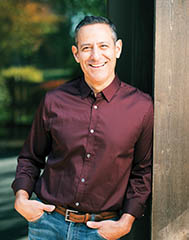
Left: Bobby Herrera, CEO and president of Populus Group
By Joy Bartolome
Populus Group is a certified Hispanic minority-owned business through the National Minority Supplier Diversity Council (NMSDC) as well as a certified military veteran-owned business through the National Veteran Business Development Council (NVBDC).
At 18 years old, Bobby Herrera raised his right hand and vowed to serve in the U.S. Army. For him, it was a decision driven by his ambition to make his father’s dream come true – to give his family a better life outside of being a bracero. From a young age, Bobby learned to work hard and overcome obstacles that guided him through Army basic training.
Bobby’s time in the Army taught him many other lessons – how to lead, the importance of grit, determination, and ambition. In 2002, he applied those lessons when he co-founded Populus Group (PG), an employment solutions company. After 17 years in the industry, Populus Group has grown into a $500 million business.
Our core belief is that everyone deserves the opportunity to succeed. We give back through our Populus Project, where our community serves both underserved youth and veterans. Bobby, now CEO and president of Populus Group, works with non-profits like BunkerLabs to give back to veterans through mentorship and networking. Oftentimes, veterans’ transition back to the civilian world is difficult, and a simple opportunity makes that transition easier.
Through the Populus Project, our ongoing community giving campaign, we partner with organizations like BunkerLabs and Seattle Nativity School to mentor, volunteer, and donate. We’ve created scholarships with underserved kids to help with school and workshops for veterans to help in their entrepreneurial journeys.
One of our own veterans says, “PG has helped me re-identify with my values and apply them to my purpose. It’s important for everyone to identify or remember what values drive them, know that they have a purpose, and find the right partner to help them get there.”
For us, being veteran-certified is about more than the certification itself, it’s a foundational part of our purpose. With a unique set of skills and experiences, veterans are an important part of our community – both our own internally, and the clients/customers we serve.

Por Saúl Carranza
El 12 de octubre de 1492 Cristóbal Colón y su tripulación descubrieron este gran continente llamado América. Ellos emprendieron un viaje esperando llegar al continente asiático, sin embargo. En ese viaje pasarían a la historia como los descubridores de un nuevo continente.
Allí se inició la interacción entre los españoles y los pueblos nativos de américa. Una relación que no fue feliz para la mayoría de nativos americanos, pero, de la cual surgiría esta nueva raza denominada “hispanoamericana”. Aún los Estados Unidos fueron alcanzados por los españoles. En 1513 Juan Ponce de León desembarcó en lo que hoy es La Florida. Vino buscando oro y la mítica fuente de la Juventud de la cual había oído decir que rejuvenecía a las personas mayores. Probablemente allí se inició la idea del “sueño americano”. Lo cierto es que durante más de 300 años los españoles dominaron amplio territorio de lo que hoy es Estados Unidos. Y desde entonces la presencia de personas que hablan español en este territorio ha sido ininterrumpida. Y en nuestros días la presencia hispana/Latina en nuestro país supera los 60 millones de personas.
La presencia hispana no pasa desapercibida. Tanto a nivel nacional como en nuestra querida Minnesota los hispanos estamos haciendo historia. El pasado mes de septiembre fuimos invitados por nuestro querido amigo Rick Aguilar a participar en “La Familia, Latino Heritage Celebration”. La celebración de nuestra herencia latina. Fue muy emocionante conocer Latinos de diferentes nacionalidades que han destacado en los deportes, las ciencias, las artes, los negocios y muchas áreas en este país.
Nuestra herencia latina se hace sentir en todas partes. Es allí donde surge la pregunta: ¿y nosotros que legado estamos dejando? O, en otras palabras, ¿por qué obra seremos recordados? Porque, así como algunas personas son recordadas por sus buenas obras, otras son recordadas por lo mal que lo hicieron. Pero en cualquiera de los casos es un legado.
En la Biblia hay un joven emigrante que pasó toda clase de penalidades, secuestro, cárcel, calumnias y humillaciones. Pero al final se sobrepuso de todo eso y llegó a ser príncipe de un gran imperio y salvo del hambre a toda la nación a dónde fue a vivir. Se llamaba José, y algunos lo llamaron el soñador. Te invito a conocer su historia si no sabes de quien hablo. Como José tú también puedes superarte y dejar a tu familia, amigos y nación un gran legado, una historia que si bien no te conceda un “award”. Si te permita ser bien recordado. Comienza por cosas sencillas, La Biblia dice “hacer justicia, ser misericordioso y humillarte ante Dios.” Es un buen principio para quien quiere pasar por esta vida dejando un buen legado. Feliz 12 de octubre, diade la hispanidad.

Por Saúl Carranza
Desde 1989 cuando el congreso de la Republica autorizó la celebración del mes de la Herencia Hispana entre el 15 de septiembre y el 15 de octubre. Quienes tenemos raíces en alguno de los países hispanoamericanos celebramos nuestro pasado glorioso, nuestras costumbres y tradiciones, nuestro presente y futuro prometedores en este gran país.
Procedemos de muchos países, por nuestras venas corre una mezcla de sangre europea y americana. Somos descendientes de orgullosas civilizaciones como Maya, Azteca, Inca o alguna otra de esas grandes culturas en las que lo mítico y lo mágico se entrelazo con lo occidental y el cristianismo. Dando origen a ese mosaico de colores, sabores, aromas y costumbres que en Estados Unidos llamamos “cultura Hispano/Latina”.
Y realmente tenemos razones para sentirnos orgullosos de lo que somos, lo que hacemos y de nuestra gente. Los hispanos somos la minoría de más rápido crecimiento en los Estados Unidos y cooperamos grandemente al desarrollo y economía de esta nación. En las ciencias, las artes, los deportes y los negocios cada día los nombres hispanos ocupan más posiciones de importancia. Según el Censo de los Estados Unidos en Julio de 2016 los hispanos constituimos el 17.8% de la Población con 57.5 millones de personas.
En lo económico En 2015, los latinos que vivimos y trabajamos aquí contribuimos con 2,13 billones de dólares, o el 11,8%, del producto interno bruto de los Estados Unidos según un estudio publicado por Latino Donors Collaborative, Y se espera que esas contribuciones continúen creciendo y para 2020 se estima que los latinos aportaremos el 12,7% del PIB total del país. Aunque no encontré información reciente, en 2013 los hispanos pagamos casi $124 mil millones en impuestos federales y casi $ 67 mil millones en impuestos estatales y locales. Se espera que el poder adquisitivo de los hispanos crezca a cerca de $ 1.7 billones para el 2019.
Con mucha razón el Ex presidente Obama dijo en su proclamación de 2016 “los hispanos han tenido una influencia profunda y positiva en los Estados Unidos a través de su fuerte compromiso con la familia, la fe y el trabajo duro y el servicio. Han mejorado y moldeado el carácter nacional con centenares de tradiciones que reflejan las costumbre multiétnicas y multiculturales de su comunidad.”
El mensaje del profeta Jeremías al pueblo que Dios había llevado a tierras lejanas fue: “Edificad casas, y habitadlas; y plantad huertos, y comed del fruto de ellos. Casaos, y engendrad hijos e hijas; dad mujeres a vuestros hijos, y dad maridos a vuestras hijas, para que tengan hijos e hijas; y multiplicaos ahí, y no os disminuyáis. Y procurad la paz de la ciudad a la cual os hice transportar, y rogad por ella a Jehová; porque en su paz tendréis vosotros paz.” Jeremías 29:5-7 Que buen mensaje para quienes hemos emigrado aquí y estamos orgullosos de nuestra herencia. Procuremos la paz y prosperidad de la nación de nuestra familia y personal. En nuestra prosperidad la nación es bendecida y en la bendición de la nación, nosotros somos bendecidos.
Por eso al decirte Dios te bendiga, también te digo “échale ganas”.

By Craig Banister
Originally published on CNSnews.com
The national seasonally-adjusted unemployment rate for Hispanics and Latinos in the U.S. labor force fell to a record low of 4.2% in April, U.S. Bureau of Labor Statistics (BLS) data released Friday.
In April, the unemployment rate for Hispanics and Latinos, aged 16 and up, was 4.2%, down from 4.7% in March – breaking the record low of 4.3% set two months earlier in February. BLS began tracking Hispanic-Latino employment data in 1973.
The number of unemployed Hispanics fell to 1,198,000 - the fewest unemployed since August of 2007 (1,190,000) and a decline of 165,000 from 1,363,000 in March of 2019.
The number of Hispanics employed fell to 27,348,000 from 27,566,000 in March and off from its record high of 27,701,000 in December 2018. The number of Hispanics participating in the workplace increased as Hispanics’ labor force participation rate fell to 65.9% from 67.0% in March.
Job Creators Network President and CEO Alfredo Ortiz says Hispanics’ job opportunites have benefited greatly from President Donald Trump’s pro-business policies:
“One of the biggest beneficiaries of the Trump economy has been Hispanics, whose entrepreneurial talents have been harnessed in this climate of deregulation and tax cuts. While Democrats play class warfare and identity politics, President Trump’s policies are creating a booming economy that is lifting all boats.”
Hispanic-Latino employment statistics for April 2019:
Unemployment rate: 4.2%, down from 4.7% in March.
Civilian Noninstitutionalized Population (16+ years old): 43,289,000 up from 43,205,000 in March.
Number Participating in Labor Force: 28,546,000 down from 28,929,000 in March.
Labor Force Participation: 65.9, down from 67.0% in March.
Number Employed: 27,348,000 down from 27,566,000 in March.
Number Unemployed: 1,198,000, down from 1,363,000 in March
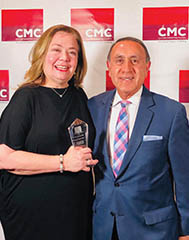 Pictured left: Ingrid Otero-Smart and Rick Aguilar,
Latino American Today
Pictured left: Ingrid Otero-Smart and Rick Aguilar,
Latino American Today
By Claud Santiago
The CMC 2019 Annual Summit was held on June 10-12 at the Statler Hotel in Dallas, TX.
Hundreds of multicultural marketing leaders attended the conference that was developed by multicultural marketing experts. The conference delivered top-level content, new insights and research from C-suite agencies and marketing association leaders, celebrated creative directors and pop culture experts that stimulated conversation and shared ideas among the attendees. In addition the conference included awards presentations to AARP for the CMC Marketer of the Year award. Arturo Villar was presented the Life Time Achievement award and culture marketing account planners were presented the CAPE awards.
The highlight of the conference was the Induction Ceremony for the CMC Hall of Fame 2019. Induction to the CMC Hall of Fame is awarded to leaders who have dedicated more than 35 years to the Hispanic advertising and marketing industry.
The CMC Hall of Fame 2019 inductees included:
Al Aguilar, Chairman & Chief Creative Officer, Creative Civilization
Tony Dieste, Founder & Chairman, Dieste, Inc.
Luis Miguel Messianu, Creative Chairman & CEO, Alma
Ingrid Otero-Smart, President & CEO,
Casanova/McCann
Alex Lopez Negrete, President/CEO, Lopez Negrete Communications
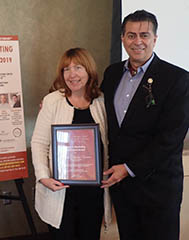 Pictured left: Rochelle Newman Carrasco and Rico Vallejos
Pictured left: Rochelle Newman Carrasco and Rico Vallejos
By Claud Santiago
The 23nd annual Hispanic marketing conference was held on April 25, 2019 at the Neighborhood House/Wellstone Senter in St. Paul. The conference was produced by Aguilar Productions based in St. Paul, sponsors included: U.S. Bank, Minnesota Twins, Comcast, Latino American Today, Minnesota Multicultural Media Consortium, and Minnesota Parks and Trails.
Presenters included: Rico Vallejos, Multicultural Creative Director, Portland, OR; Rochelle Newman Carrasco, EVP Hispanic Strategy; Walton Isaacson, Los Angeles, CA; Roma Calatayud Stocks, Author and Composer, Minneapolis; Diego Classen, Comast, Twin Cities; and Reinaldo Moya, Composer in Residence, The Schubert Club, St. Paul, MN. They presented great insights, strategies, and case studies related to marketing to the Hispanic consumer segments.
Rochelle Newman-Carrasco received the Hispanic Marketing Achievement Award for leadership and achievement in the U.S. Hispanic Marketing Industry.
Congratulations to Aguilar Productions on their 23rd anniversary of producing conferences and seminars focusing on the U.S. Multicultural markets.
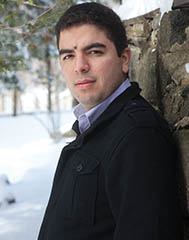 Pictured left: Reinaldo Moya, DMA.
Composer in Residence at The Schubert Club
Assistant Professor of Music, Augsburg University, Minneapolis, MN
Pictured left: Reinaldo Moya, DMA.
Composer in Residence at The Schubert Club
Assistant Professor of Music, Augsburg University, Minneapolis, MN
Schubert Club Mix presents Tienda, a new chamber opera by Schubert Club Composer In Residence Reinaldo Moya and Caitlin Vincent on Thursday, May 23, 2019 at 7:30 pm. There will also be a free community performance of Tienda at Neighborhood House on Saturday, May 25 at 2:00 pm.
This unique performance at Twin Cities Public Television’s Studio A in Lowertown, Saint Paul will feature a partially-staged opera by Reinaldo Moya with words by Caitlin Vincent. The cast of singers includes mezzo soprano Clara Osowski, as well as Adrian Rosas (bass-baritone), Matthew Valverde (tenor), Juan Carlos Mendoza (tenor), and Bergen Baker (soprano). The production will also feature conductor singers from VocalEssence’s Youth Choir, Singers Of This Age (SOTA), conductor Rafael Rodriguez, and an instrumental ensemble of six musicians. The stage director is Jon Cranney.
The opera tells the story of Luis Garzón, a Mexican musician who immigrated to Minneapolis in 1886 and opened a small Mexican grocery store, or tienda, in St. Paul in the 1920s. While Luis had married an American woman and was fully integrated into Minnesotan society, his store served as a community hub for the newest arrivals from Mexico, many of whom had fled the Mexican Revolution and now toiled in the sugar beet farms of rural Minnesota. Tienda explores the immigrant experience: what must be left behind—and what cannot be forgotten—on the journey to a new home. This world premiere performance of Tienda is one of the highlights of Moya’s two-year residency with the Schubert Club.
For Moya, Luis’s story has personal meaning. “I had wanted to write an immigration opera for some time,” said Moya. “When my librettist, Caitlin Vincent, and I started doing research for this project, we came cross a human interest story of an immigrant’s journey to and life in the United States. Luis’s story resonated with me because we both came to the US as young men and remained here for a long time. We are both musicians, and we both feel a strong pull towards our home culture while simultaneously seeing the promise of the American dream, even when it fails so many.”
Moya also sees the strong connection between the issues immigrants faced in the early 20th century, and the struggles they still face today. “Luis’s story is also one that is still very relevant in today’s political climate. We might think of these immigration issues as relatively new, but Tienda shows that we as a country have had a long history of reckoning with our heritage as an immigrant country.”
Following the performance, there will be an on-stage Question and Answer session with the composer, and all audience members are welcome to participate.
Tickets for Tienda are $31 and are available for purchase online at schubert.org, by phone at 651-292-3268, or in person on the day of the concert at the Ordway box office. Seating is general admission.
About Reinaldo Moya
Reinaldo Moya is a graduate of Venezuela’s El Sistema music education system. Through El Sistema, he had access to musical training from an early age and was a founding member of the Simon Bolivar Symphony Orchestra touring throughout Europe, North and South America. A graduate of The Juilliard School and a participant in the prestigious John Duffy Composers Institute and the New Jersey Symphony Orchestra Conce Composers Institute, Moya now lives in Northfield, and is Associate Professor of Composition at Augsburg College. Reinaldo Moya is the recipient of the 2015 McKnight Composers Fellowship, the Van Lier Fellowship from Meet the Composer and the Aaron Copland Award from the Copland House.
 Pictured left: 2019 Minnesota Twins season launches
Pictured left: 2019 Minnesota Twins season launches
By Claud Santiago
The Minnesota Twins will launch their 2019 season against the Cleveland Indians in an afternoon game on Thursday, March 28 at Target Field.
Latino players in the
starting line-up include the following:
Nelson Cruz, DH
Jorge Polanco, SS
Jason Castro, C
Eddie Rosario, LF
Marwin Gonzalez, 3B
All of Minnesota is wishing great success for this season.
Go Twins!
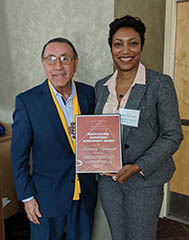 Pictured left: Rosemary Ugboajah receiving her award
Pictured left: Rosemary Ugboajah receiving her award
The 23rd annual Multicultural Marketing Conference & Awards was held on February 21, 2019 at the Wellstone Center in St. Paul. The conference was presented by Aguilar Productions, the leader in promoting the multiculturals markets in the U.S. This full-day conference drew an audience of marketing professionals from various organizations and businesses who were treated to an outstanding array of presentations.
Presenters included Rico Vallejos, marketing creative director, Cecilia Stanton Adams, CEO of Stanton Adams Consulting, LLC, Trent Bowman, VP Community Development Officer KleinBank, a division of Old National Bank, Marcus Mays, Specialist – Retail Operations Comcast Twin Cities/Greater KC Region, Rosemary Ugboajah, President Neka Creative and Tom Gitaa, President & Publisher of Mshale, the African Community Newspaper.
Rosemary Ugboajah was honored with the Multicultural Marketing Achievement Award in recognition of her outstanding achievements in the Multicultural Marketing Industry in the United States.
Conference sponsors included: U.S. Bank, Comcast, Minnesota State Parks & Trails, KleinBank, a division of Old National Bank and Latino American Today. Thanks for their support of this conference.
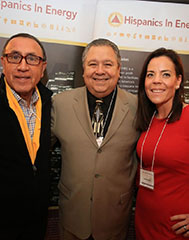 L to R: Rick Aguilar, Latino American Today, José Pérez and Anita Grace
L to R: Rick Aguilar, Latino American Today, José Pérez and Anita Grace
The Minnesota Energy Policy Forum was held on January 14, 2019 at the State Capitol Building. Leaders from the Minnesota Energy sector and Latino community met to create a sustainable network to be able to exchange information on an ongoing basis about energy policies, programs, business and job opportunities in Minnesota. José Pérez, Chairman and CEO of Hispanics in Energy and Anita Grace, Hispanic marketing specialist were key organizers of the forum. Attendees included political and energy business leaders who discussed strategies to enhance greater integration of Latinos and other minority groups in the energy sectors.
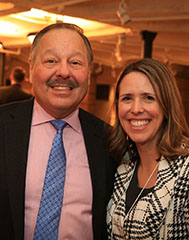
Nelson Diaz, PECO Board of Directors in Pennsylvania and Katie Sieben, Minnesota Public Utilities Commissioner
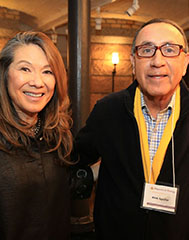
Susie Wong, President & CEO, Asians in Energy and Rick Aguilar
Photos by Gustavo Rosso.
 L to R: Rick Aguilar, Latino American Today, José Pérez and Anita Grace
L to R: Rick Aguilar, Latino American Today, José Pérez and Anita Grace
The Minnesota Energy Policy Forum was held on January 14, 2019 at the State Capitol Building. Leaders from the Minnesota Energy sector and Latino community met to create a sustainable network to be able to exchange information on an ongoing basis about energy policies, programs, business and job opportunities in Minnesota. José Pérez, Chairman and CEO of Hispanics in Energy and Anita Grace, Hispanic marketing specialist were key organizers of the forum. Attendees included political and energy business leaders who discussed strategies to enhance greater integration of Latinos and other minority groups in the energy sectors.

Nelson Diaz, PECO Board of Directors in Pennsylvania and Katie Sieben, Minnesota Public Utilities Commissioner

Susie Wong, President & CEO, Asians in Energy and Rick Aguilar
Photos by Gustavo Rosso.
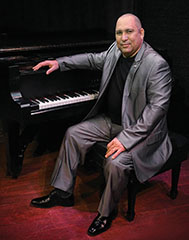 Pictured left: Cuban pianist Nachito Herrera
Pictured left: Cuban pianist Nachito Herrera
By Claud Santiago
Acclaimed world-class musician Nachito Herrera’s Afro-Latin Renaissance combines classical Afro-Latin Cuban jazz, dance and painting, drawing on the roots of Afro-American and Latin American communities and visiting the heart of our cultural identities. Using colors, flavors, and authenticity, Afro-Latin Renaissance proved once again the power of music as the universal language of unity and peace. This wonderful concert that was held on December 1, 2018 drew an audience who were treated to an amazing array of music, singing and dancing.
As a Minnesota favorite, Nachito never fails to electrify Twin Cities stages, and rightfully owns his legendary status as a distinguished pianist across the world. Making his debut as a 12-year old with the Havana Symphony Orchestra in Cuba, he has continued to leave his mark on music, and our hearts, ever since.
“Nachito brings his heart and soul to all his performances and never fails to leave you wanting to hear more of his music. It was so special to be in the audience for this beautiful night, again proving the music brings us all together” —Rick Aguilar
Featured Artists Included:
Producers and Artistic Directors: Aurora Herrera and Ignacio Nachito Herrera
Musical Director, piano player, and conductor: Ignacio Nachito Herrera
Nachito Herrera’s Havana Jazz Social Club
First Violin: Karen Briggs
Soprano Sax, Alto Sax, Flute, and Ewe: Hammadi Bayard
Alto Sax, Ewe: Mike Phillips
Tenor Sax: David J. Wright III
First Trumpet: Leider Chapotin
Second Trumpet: Larry Sims
Bass: Daymar Calvario
Keyboard: Victor Johnson
Drums: Raul Pineda
Percussion: Edgar Martinez Ochoa
Bongos: Carlos Caro
Singers: Mirdalys Herrera, Fred Steele, Maurice Jacox, and Norah Long
Minnesota Youth Symphonies
Conductor: Manny Laureano
St. Peter African Methodist Episcopal (AME) Church Choir
Director: Byron Roberson
Grupo De Danzas Colombianas
Choreographer: Martha Ordonez Daniels
Rene Dennis Thompson and Dancers
Choreographer: Rene Dennis Thompson
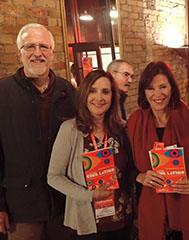 L to R: Tom and Roma Stocks,
Gold Sponsors for the festival and Susan Smoluchowski, Executive Director / The Film Society of Minneapolis St. Paul
L to R: Tom and Roma Stocks,
Gold Sponsors for the festival and Susan Smoluchowski, Executive Director / The Film Society of Minneapolis St. Paul
By Gabriela Talvo Zarfati
International travel often results in a few stamps in your passport, tons of photos and videos, and hopefully great connections, wonderful experiences and lovely memories. The best trips can be described as “life-changing,” in the good way. The 2018 MSP Cine Latino film festival was all that sans the actual travel part – just an impeccably-curated selection of proven recent films that have won awards around the world.
First stop: The intensely personal Roma by Alfonso Cuarón, almost a time travel experience that took us to Mexico City in the 1970s and gave us a way to see life through the lens of poverty and social class. Docu Station: Yo no me llamo Rubén Blades (Rubén Blades Is Not My Name), a documentary about the multifaceted and productive life of the “intellectual salsero” – one helluva trip across a 50-year career encompassing 17 Grammys, many films, and a parade of who’s who in show business that were fortunate to be part of Blades’ life and work.
Other fabulous trips at Cine Latino:
• Todos lo saben (Everybody Knows), a star-studded and engaging family drama that takes place in Spain, with an Argentina connection.
• Las herederas (The Heiresses), another class story that somewhat mirrors the Roma narrative albeit from the perspective of old wealth in Paraguay.
• El último traje (The Last Suit), an emotional and literal journey that take us from Buenos Aires and Poland in a character-driven story with subtle performances and a soundtrack featuring klezmer music.
Bottom line, for the travelogue, was this life-changing? You betcha.
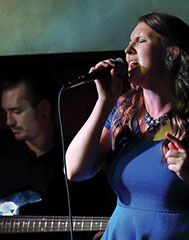 Left: Jazz singer Katia Cardenas performing
Left: Jazz singer Katia Cardenas performing
By Anne Nicolai
Katia Cardenas has been called “the fastest rising star on the jazz scene” in Minneapolis-St. Paul, Minnesota, where she performs at nationally acclaimed venues. A specialist in jazz, soul, and r&b, Katia’s repertoire also encompasses Latin and pop tunes, and she fronts a touring swing band, the Casablanca Orchestra.
In November, Katia will perform in San Miguel de Allende and throughout the Bajío region, accompanied by an elite corps of musicians from San Miguel and Querétaro.
Hosting the tour is local Latin jazz group Jazzoneando, who discovered Katia when they were invited to represent Mexico and Cuba at the Twin Cities Jazz Festival in 2016.
Jazzoneando presents original, contemporary arrangements of Cuban son, Brazilian bossa nova, and American jazz standards, along with original compositions. Its members are pianist/arranger Yamil Vázquez, bassist/vocalist Aarón Romo, and percussionists David Labrada, Dairon Vázquez, and Kimani Carrazana, with guests Marco Antonio Carranco on trumpet, and Jorge Luis “El Gallo” Aparicio on saxophone.
Katia also will perform with The Elements, featuring Patricio “Pato” Peña on keyboards, Rick Shlosser on drums, Aarón Romo on bass and Federico Azuz on guitar.
Katia was raised on jazz, funk, and r&b. Her mother, singer-songwriter Janis Kelly, sang with Maurice White & The Emotions, and opened for Rufus & Chaka Khan, Tower of Power, and Carole King. Her father, Mark Cardenas, is a platinum and gold recording keyboardist who played with Prince, Morris Day & The Time, and Janet Jackson, and acted in Prince’s film “Purple Rain.”
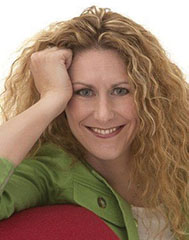
Pictured left: Anne Nicolai
Thanks to Anne Nicolai for her help in producing this tour. Anne is a former Twin Cities professional executive who moved to Mexico in 2008.
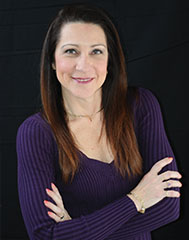 Left: Marci Malzahn is a banking executive and founder of Malzahn Strategic
Left: Marci Malzahn is a banking executive and founder of Malzahn Strategic
A couple of years ago when I attended the Speakers Academy (which is part of the Minnesota Chapter of the National Speakers Association) they asked us these key questions: “Why do you want to speak?” and “What is your message as a speaker?” I thought about these questions seriously and I finally came to my own answers: Why do I speak? Because I want to inspire and educate people. What is my own message? I bring a message of encouragement and I also teach my audience something new they can use either in their workplace or in their personal lives. These two answers are based on my life’s mission: To help working people be successful in every area of their lives.
It seems these days everyone wants to, and needs to, be inspired and encouraged because there is so much negativity going on in the nation and in the world. At the same time, people are looking to learn something new and not just get “inspired” as that seems a little bit “fluffy” and not much “meaty.” In addition, companies pay for their employees to learn something they can immediately apply to their jobs and increase the bottom line. So, realizing this, I decided to make it my goal to both inspire and educate every time I speak to an audience—whether the topic is a technical banking one or a “soft skill” topic such as life/work balance or negotiation skills in the workplace.
The other thing I realized as I was thinking about why I speak is that I am using four key talents together: the gift of public speaking, the gift of teaching, the gift of encouragement, and the gift of writing. The combination of these four talents used together is what I’m striving to do. And it’s what makes it easy for me to be both a speaker and a writer. The process of finding and discovering my gifts and talents was a long one. Being in the workplace helped me discover many of those talents and that’s why I wrote my second book, The Fire Within – Connect Your Gifts with Your Calling. In this book, I encourage my readers to discover their gifts, polish them and use those gifts to help others. As I personally did that, I discovered my personal calling—my purpose in life, which I mentioned above.
So the questions I have for you today are:
1. Do you know what your gifts/talents are?
2. Are you using those gifts to help others?
3. If yes, in what ways are you helping others?
4. If not, how can you start using your talents today to help other people—both in the workplace as well as in your community?
I am thankful for the many talents I’ve been given and I’m purposed to use them all every day to help other people around me. That is part of the legacy I’m leaving behind. I encourage you to do the same.
Marci Malzahn is a banking executive and founder of Malzahn Strategic (www.malzahnstrategic.com), a community bank consultancy focused on strategic planning, enterprise risk management and talent management. Marci is also an author and motivational/ inspirational speaker. You can contact Marci for speaking engagements through her website or email her at marcia@marciamalzahn.com. You can purchase Marci’s books at www.Amazon.com.
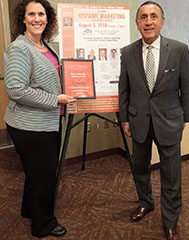 Left: Rick Aguilar of Aguilar Productions presents awards to Stacey Nelson-Kumar
Left: Rick Aguilar of Aguilar Productions presents awards to Stacey Nelson-Kumar
By Claud Santiago
The 22nd annual Hispanic marketing conference was held on August 2, 2018 at the Neighborhood House/Wellstone Center in St. Paul. The conference, produced by Aguilar Productions based in St. Paul, was sponsored by U.S. Bank, Minnesota Twins, Comcast, Latino American Today and the Minnesota Multicultural Media Consortium.
Presenters included Rico Vallejos, Multicultural Creative Director; George San Jose, President & CCO of the San Jose Group, Chicago; Susanna Whitmore Franek, Ethnologix, Los Angeles; and Steve LeBeau, Synaspe, Minneapolis. They presented great insights, strategies, and case studies related to marketing to the Hispanic consumer segments.
The following individuals received the Hispanic Marketing Achievement Awards:
George San Jose received the Hispanic Marketing Achievement Award, Susanna Whitmore Franek received the Hispanic Marketing Research Achievement Award, and Comcast received the Hispanic Marketing Corporate Award.
Congratulations to Aguilar Productions on their 22nd anniversary of producing conferences and seminars focusing on the U.S. Multicultural markets.
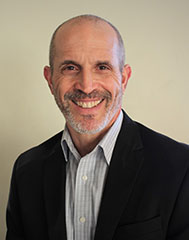 Left: Jose Luciano, LegalShield Independent Associate, Employee Benefit Specialist, Business Solutions Consultant
Left: Jose Luciano, LegalShield Independent Associate, Employee Benefit Specialist, Business Solutions Consultant
Jose Luciano was three years old when his family fled Cuba. Growing up as an immigrant has been both a gift and a challenge for Jose. His own family encountered language barriers with so many products and services they wanted and needed to purchase. So when it came to affordable legal advice Jose was excited when Legal Shield en Espanol was announced. “I am thrilled that all Spanish speaking Latinos will have access to affordable legal help,” says Jose. As an LegalShield Independent Associate Jose’s passion is to protect and empower individuals and families with:
• Affordable legal advice or counsel on unlimited issues – at the touch of an app
• Identity theft monitoring with comprehensive restoration
• Peace of mind, knowing you have an advocate who can speak Spanish, as well as legal language
• Money-saving discounts through Member Perks
• Become a member by calling Jose or go to: www.SoTapThatApp.com
As for Businesses, they are being held liable for all identity theft that originates in the workplace. LegalShield is helping businesses reduce this new area of liability.
LegalShield has helped more than 35,000 businesses across the U.S. Add and average of $600 per employee per year to their bottom line profits with no additional capital outlay or expense. LegalShield plans, when offered as employee benefits, build a wall of protection around the employee and their families, protecting the business at the same time. LegalShield En Espanol is rolling in all 50 states. Become a member by call Jose at 612-442-0849 or go to: www.SoTapThatApp.com
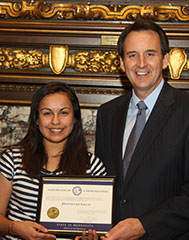 Left: Carissa Ontiveros and Govenor Pawlenty (R)
Left: Carissa Ontiveros and Govenor Pawlenty (R)
Rick Aguilar is pleased that Tim Pawlenty is running for Governor of Minnesota and is supporting him as the upcoming primary election day, August 14th, draws near. Aguilar served on the Met Council during Pawlenty’s two terms as Governor from 2003 to 2011. Aguilar was instrumental in keeping then Gov. Pawlenty aware of issues in the Latino community and also offered up many Latino business, community and civic leaders to the Governor for Certificates of Commendation for their work in the community.
“I was always so pleased and full of pride when we would go to Reception Room at the State Capitol and Governor Pawlenty would present the certificates to the Latino leaders and community members, young and old. These meetings would last 20-30 minutes and the Governor would take time to talk to all who attended, many who were in the Capitol for the first time,” said Aguilar.
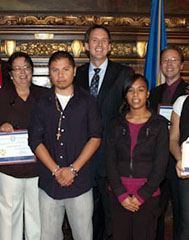
Governor Pawlenty (center) honoring the Latino Youth group Jovenes de Salud who actively promote “Stay in School and Graduate” to their fellow Latino students.
Turning to the upcoming Governor election in November, Aguilar feels that we need a Governor who understands and can make changes to our education system that at this time is failing our Latino youth. Minnesota has the worst high school outcomes in the country for Latino students.
Aguilar believes that Pawlenty can be a leader in making sure that “all” high school students graduate and get a good education in Minnesota. “Tim is a good friend and his background coming from a working class family in South St. Paul really connects with me because of all the Latinos from the West Side who worked in the stockyards in South St. Paul, including my dad and brothers,” Aguilar stated.
The Latino American Today Editorial Board endorses Tim Pawlenty for Governor of Minnesota.
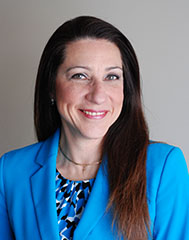 Pictured left: Marci Malzahn, president and founder of Malzahn Strategic
Pictured left: Marci Malzahn, president and founder of Malzahn Strategic
Your team.
Virtual team or W-2 employees? This is a very important decision you’ll have to make as you start your business. More and more solopreneurs are opting to hire virtual teams. For example, I chose to be a solopreneur in order to have the flexibility to do the various aspects of my company such as bank consulting, speaking, and writing books and articles such as this one. Therefore, I chose to have a virtual team that helps me with the marketing. I write the copy for the business brochures and website and the marketing professional makes it “marketing material.” Then the designer helps me with the branding and ensuring all the aspects of the company look the same and project the same message to my clients. Lastly, the website developer creates the website and works together with the designer and the marketing expert.
As a professional speaker, I needed a “virtual assistant” to help me with marketing initiatives, manage the database of clients and prospects, and send emails. Virtual assistants are sub-contractors who are entrepreneurs themselves and provide administrative assistance to others remotely. I also have a “social media specialist” to help me post all my events on my website, create and maintain the Facebook page, and posts announcements so my followers know what’s coming up.
When I publish books, I work with an editor, a book designer, and the book printing company. The point is, I have now virtual teams who work with me on the various aspects of my business. I don’t have the liability or payroll expenses of W-2 employees. You will need to decide, based on your type of business, what type of team you need. The key is to outsource the talents you don’t have with the goal of maximizing your own time by spending it on the areas that will help your business the most.
Your community.
Some of the very first questions you should ask yourself are, why do I want to start this company? Who do I want to help in my community? How will my community become a better place because of my business? What will my company’s legacy be when it’s all said and done? If you don’t have answers for these questions, then don’t even start. When these questions are clear in your mind and in your heart, then passion will show and your business can take off leaving a great legacy in the lives of the people your company touches.
Bring it all together. In Part I we went through what it takes to start your own business from the person’s perspective. In Part II we discussed how to establish your business. Lastly, in Part III we addressed your team and the impact your business may have in your community. It takes a lot to be a small business owner, but you can do it—especially in America where you can dream big and accomplish your dreams. This country was created by entrepreneurs and I encourage you to follow your dream if that’s what you want to do. The amount of work, sacrifice, and effort it takes to start a business is all worth it when you have the passion, discipline, and perseverance to make it happen.
Marci Malzahn is president and founder of Malzahn Strategic (www.malzahnstrategic.com), a community bank consultancy focused on strategic planning, enterprise risk management and talent management. Marci is also a professional speaker and published author of three books. You can contact Marci for speaking engagements through her website at www.marciamalzahn.com or email her at marcia@marciamalzahn.com. You can purchase Marci’s books at www.Amazon.com.
 Pictured above: Minnesota's Target Field
Pictured above: Minnesota's Target Field
By Marci Malzahn
The Minnesota Twins are opening their 2018 season with a strong group of Latino players aboard. The number of Latino players throughout the league continues to grow as baseball becomes more popular with the Latino community in the U.S. The Minnesota Twins remain one of the few major league teams who have a full time Director of Diversity and Inclusion, Miguel Ramos. We wish the Twins the best for this season. See you at the ball park.
Here is the list of Latino players on the active roster:
Pitchers: Jose Berrios – Gabriel Moya – Ervin Santana
Catcher: Jason Castro
Infield: Enrique Adrianza – Eduardo Escobar – Miguel Sano
Outfield: Eddie Rosario
 Pictured above: Marci Malzahn, president and founder of Malzahn Strategic
Pictured above: Marci Malzahn, president and founder of Malzahn Strategic
By Marci Malzahn
Are you happy working as a company employee? Or do you feel the desire to start your own business? Either choice is okay if you are happy and fulfilled. But what does it take to be an entrepreneur and start a business? It takes several skills, careful planning, and a lot of perseverance before you launch into the new adventure called “entrepreneurialship.” Because this is an extensive subject, I decided to split this article into three parts: Part I – The Owner, Part II – The Business, and Part III – Your Team and Your Community. This month, I will focus on Part I with Parts II and III following the next two months.
Part I: The Owner—You
If you plan to start a business that will grow and eventually hire employees, are you ready to take the lead and impart your vision to your team? Leaders must possess several attributes but let’s focus on five for the purposes of this article.
Leadership: Leadership is about influence and vision. Do you have what it takes to lead a company? It begins with a vision that you’re passionate about, so you can impart it to others. What is your vision?
Passion: What are you passionate about? Are you passionate about a specific cause or field but you’re not working in it? What’s stopping you from pursuing that passion? You must be passionate about your own business! This is the first step.
Discipline: Typically, small business owners start very small, on their own and from home, and need to be disciplined to create a routine of work that doesn’t involve driving to an office. It takes discipline to “go to work” every day even when there are no clients yet. As you develop your clientele you also need to establish the business itself—simultaneously. In the words of Michael Gerber, author of The E-Myth Revisited (where “E” stands for Entrepreneur), you need to balance working “on the business” and working “in the business.” If you’re too busy doing all the work with clients (in the business), then you’ll never have time off and you will not be able to scale your business (on the business). The business will swallow you and overwhelm you. On the other hand, you can’t only focus on developing the business so much that you neglect your clients and lose the few you have, in the end.
Perseverance: You will no doubt encounter obstacles while starting your business. Therefore, you need to establish boundaries—the values you’re not willing to compromise. Ask yourself these questions, what are you willing to lose? What are you willing to sacrifice? In the world, we make choices every day and every success requires sacrifice. Therefore, it is imperative that you make those decisions before you begin this journey. For example, are you willing to sacrifice your health? How much are you willing to get in debt? How long will you give the business before it is clear the business will not make it? Do you have a solid business plan? There will be plenty of people who will tell you to give up and quit. You will need to persevere.
Management skills: You can be a great leader who imparts the vision, influences those around you to follow you and buy into your vision. But you may not enjoy supervising others or developing your employees. On the other hand, you can be an excellent manager who implements the vision of a company but you need someone to impart that vision to you. Knowing yourself is crucial to starting your business and growing it successfully. The good news is that you can improve and develop both your management as well as your leadership skills.
In the next two months I will share about the business, your team and your Community. Stay tuned! Marci Malzahn is president and founder of Malzahn Strategic (www.malzahnstrategic.com), a community bank consultancy focused on strategic planning, enterprise risk management and talent management. Marci is also a professional speaker and published author of three books (below). You can contact Marci for speaking engagements through her website at www.marciamalzahn.com or email her at marcia@marciamalzahn.com. You can purchase Marci’s books at www.Amazon.com.

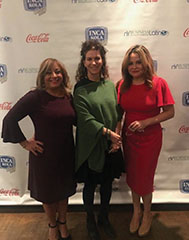 Pictured left: Liz Berman, Christina Weiss Lurie, and Rosemary Carrillo
Pictured left: Liz Berman, Christina Weiss Lurie, and Rosemary Carrillo
By Claud Santiago
Inca Kola USA, a brand of the Coca Cola Company, presented the 5th annual Salute to Hispanics in Sports and Entertainment, produced by New York Business Latino. The event was held at the Rock Bottom restaurant in Minneapolis. The event was created to pay tribute to Hispanic role models in sports, entertainment, and business. The award recipients were honored for their leadership both on and off the field and their involvement in the community and civic affairs. The 2018 recipients included:• Christina Weiss Lurie, minority owner of the Philadelphia
Eagles - Hispanic Leadership Award
• Peter Villegas, VP Hispanic Affairs the Coca Cola Company
- Hispanic Executive of the Year Award
• Brian Ortega, #3 Ranked UFC Featherweight in the world
- Hispanic Athlete of the Year Award
• Maya Santamaria, President and CEO Santamaria Broadcasting
- Hispanic Media Award. Santamaria is from Minneapolis.
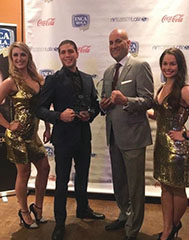 Pictured above: Inca Kola señoritas with Brian Ortega and Peter Villegas
Pictured above: Inca Kola señoritas with Brian Ortega and Peter Villegas
Event attendee Rick Aguilar, President of Aguilar Productions was very impressed with the event! “What a thrill meeting Christina Weiss Lurie, a minority owner of the Philadelphia Eagles. She is a class act, so gracious to stay for several hours at the event and network with the attendees.” Congrats to Liz and Randy Berman, principles of Inca Kola; Julio Coen, Manager of Brand Inca Kola; and Rosemary Carrillo, NY Business Latino.
Thanks to Inca Kola USA and the Coca Cola Company for presenting this unique event during Super Bowl Week in Minneapolis. Over 100 attendees were treated to a wonderful night of food, cocktails, and amazing networking. The Rock Bottom restaurant served a delicious buffet and excellent bar service, highlighted by serving Inca Kola in various cocktails. What a great night!
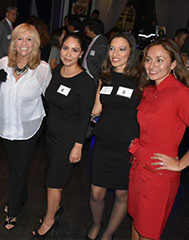 By Claud Santiago
By Claud Santiago
Women’s Business Enterprise (WBE) certification is a powerful tool that has helped thousands of women entrepreneurs compete for contracts with the government and major corporations.
Women-owned companies are significantly underrepresented when it comes to corporate and government contracts, getting 4 or 5 percent compared to those obtained by male-owned businesses. Being WBE-certified helps level the playing field.
The Women’s Business Development Center (WBDC) is a regional partner for the Women’s Business Enterprise National Council (WBENC), the country’s largest third-party certifier of womenowned businesses. We verify that companies really are women-owned to certify them as WBEs.
What are the requirements for WBENC certification?
A company must be 51 percent or more owned by a woman or women to qualify. Additionally, the female owner must have the knowledge, experience, and decision making authority to manage and operate the business without control by or substantial dependence upon a male. She must be in control of the company’s strategic decisions, as well as day-to-day operations. Certainly, she can delegate and rely upon employees to do their jobs, yet she must be able to control and manage them. In short, she must be the ultimate decision-maker.
Here in Minnesota there are several Latina-owned businesses that are certified as a WBE by WBDC, with a couple that are currently in the process of going through the certification application process.
I’m already MBE certified – why should I become WBE certified, too?
First, there are times when corporations are seeking WBEs specifically. If you are only MBE-certified, you might miss a chance. The second reason is that the North Central Minority Supplier Development Council and the Women’s Business Development Center have overlapping, but different networks. If you qualify to be certified as both a WBE and an MBE, you increase the connections you can make to grow your business.
Interested in learning more?
Attend a monthly lunch and learn program called “Is Certification Right for You” at the WBDC Minneapolis office, or contact our office at 612-259-6584 or wbdc-mn@wbdc.org. Check our website, www.wbdc.org, for details.
 By Claud Santiago
By Claud Santiago
Marci Malzahn started writing twelve years ago and she is not planning on stopping any time soon. Because Marci has always been a full-time working woman, she wanted to inspire other working women to be successful and to strive to achieve balance in their lives. That led her to publish her first book in 2006, Devotions for Working Women – A Daily Inspiration to Live a Successful and Balanced Life.
 Books above written by author Marcia Malzahn
Books above written by author Marcia Malzahn
Several years later in 2015, Marci founded Malzahn Publishing, and published her second book, The Fire Within – Connect Your Gifts with Your Calling. Through this book, Marci inspires and encourages working people to discover their gifts, polish them, and use them to help others. Your talents are connected to your life’s purpose and your ultimate calling.
In April, 2016, Marci published her third book, The Friendship Book – Because You Matter to Me, and dedicated it to all her friends around the world. Marci treasures her friendships and, in this book, she inspires others to appreciate and nurture their friendships. In November, 2017, Marci published this little book in Spanish, El Libro de la Amistad – Porque Tú Me Importas. All books are available through Amazon or by contacting Marci directly at marcia@marciamalzahn.com.
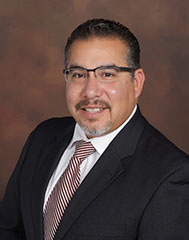 By Claud Santiago
By Claud Santiago
Isaac Contreras is a Latino professional on the move. After many years of working in various industries in management positions, Isaac decided that he wanted a career move. Today, Isaac is an agent with Keller Williams Integrity Realty in St. Paul. He feels that there is no better occupation, in his opinion, than helping people realize their dreams. “ For many Latinos and other communities , a primary aspiration is purchasing a home and using that as a building block for wealth creation” explained Contreras. Isaac feels that it’s a good time to be in the business, home sales are doing well according to many Homeownership reports. Contreras will be selling and buying homes to all communities but as a Minnesota born Latino American he is hoping to focus some attention to the Latino American market in his area. Isaac is bilingual in Spanish and English and feels that this will help him and the Latino home buyers, who sometimes feel more comfortable speaking Spanish.
Contreras points out many reasons why people should use a real estate agent to sell or buy their homes.
• You’ll spend less time and earn more money, all for the least amount of hassle.
• You’ll gain access to listings that may not be widely available and market information to know whether or not the price of a home is competitive.
• We compile local market data and help homeowners and future homeowners understand what it means for them.
“A home is often the most important investment a person makes. My job is to help you understand the state of your investment and give you the information you need to determine whether the time is right to buy, sell or invest in a home.”
Isaac Contreras • Keller Williams Integrity Realty • 2680 Snelling Avenue N. Suite #100 • Roseville, MN 55113 • Office: 651-203-1700 • Cell: 651-387-6317
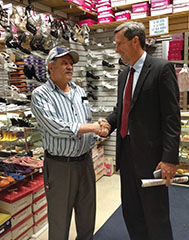 By Claud Santiago
By Claud Santiago
Visiting the Mercado Central on E. Lake Street in Minneapolis, Keith Downey Republican candidate for Governor of Minnesota and Rick Aguilar, Twin Cities business leader met with various business owners to learn about the history of their business and to talk about any concerns they have. The Mercado Central is a business co-operative that opened in 1999 and is made up of 30 plus Latino owned businesses trading in Latino products, services and offering several mini-restaurants. The opening of the Mercado led to a major economic effort on the E. Lake street area that is now home over 300 Latino owned businesses. Minneapolis is home to the largest Latino population in Minnesota.
Downey and the business owners discussed the minimum wage and sick pay issues facing Minneapolis business owners, along with the many taxes and regulations that put a burden on business growth. They also talked about the need of more capital and assistance to grow and expand. Downey was very impressed with the Mercado and the many business owners he met with. “I want to keep the American dream alive for the Hispanic community and make Minnesota a state where business thrives and they get the opportunity to succeed,” stated Downey.
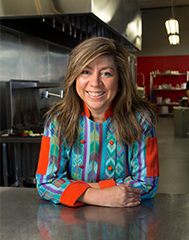 By Amalia Moreno-Damgaard
By Amalia Moreno-Damgaard
My business was recently certified as a woman-owned business enterprise by the Women’s Business Enterprise National Council (WBENC), a government-backed program under the Small Business Administration (SBA) offered locally by the Women’s Business Development Center (WBDC).
“Certification is the most widely recognized in the nation and is accepted by over 1,000 corporations and public agencies in the country. WBDC provides WBE certification to qualified women-owned companies in Minnesota, Western Wisconsin, North and South Dakota”.
As a double minority entrepreneur, it is an honor and privilege to have reached a level in my career and business stage where I can expand and seek new opportunities on a national level. I am excited about the prospect of growing in the direction I feel I can make greater impact through my work.
I first became aware of certification when I just started my company and built it into my strategy to work toward the goal of becoming certified one day. Certification is a time and financial investment that can yield new benefits for your business. As a new WBENC member, I am eager to participate in the upcoming annual conference in Chicago on September 7 where I will have the opportunity to meet with like-minded businesses and make connections with new corporations, government and nonprofit potential clients.
Through corporate procurement meetings businesses can learn about supplier diversity programs in their region. Panels and consulting bring partners together through marketing strategies.
I am looking forward to exploring and to growing in this new environment where I believe my business can continue to prosper and excel by taking advantage of the many educational resources this organization offers.
Certification runs for a year and requires recertification every year. The initial process is long and requires many steps and documentation culminating in an hour-long interview to corroborate facts that establishes your business as a going concern. Interested in learning more about certification? Go to: https://www.wbdc.org/mn/Amalia Moreno-Damgaard (AmaliaLLC.com) is an award-winning author and chef-entrepreneur, spokesperson, author, speaker, and bilingual food and culture consultant effectively connecting brands to the Latin and American markets through product ideation, development, project strategy and execution. She was born and raised in Guatemala City and is a graduate of Le Cordon Bleu with a Masters in International Business from St. Louis University. She serves on the American Diabetes CLB Board-MN, and on the Common Hope and Depart Smart Executive Boards.
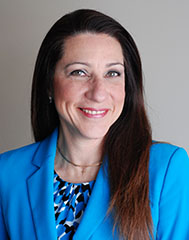 By Marci Malzahn
By Marci Malzahn
When I went to Nicaragua (my country of origin) in 2013 with Opportunity International (OI), I was amazed to learn that what mothers wanted most for their children, after food, was education. OI, a nonprofit organization that provides micro loans to the poor in 28 countries, works with entrepreneurs who want to become self-sufficient. They co-invest in their communities with the “clients” and, together, create real progress in the countries they work with, one of them being Nicaragua. 85% of their clients globally are women entrepreneurs who are bakers, hammock makers, farmers, artisans of clay or wood artifacts, own a retail store in their homes, or raise pigs, among other businesses. OI forms what they call “trust groups” where about twenty five entrepreneurs get together to receive business training from OI, to support each other, and to improve themselves along with their communities. The loans average $150 to $200 and are paid back within four months. Once the entire group pays off the loan, then they can obtain the next set of loans. If one of the trust group members is unable to make her or his weekly payment, the rest of the group has to pay for them. Therefore, the level of accountability is very high and the payback ratio is about 98%! They are committed to succeed.
One of the women who operated a little retail store from her house (typically the stores are in the front of the house and the families live in the back) shared with our group how proud she was to send her daughter to college. With the loans she received from OI she continued to grow her store and she was able to provide for her daughter to not only finish high school but to pursue her college degree. She was, of course, the first one to attend college in generations.
Last year I was fortunate to go to Kigali, Rwanda, Africa as part of a mission’s team. My part was to teach at a women’s leadership conference and at a pastors’ conference. As I talked with the women who attended, they too shared that the most important goal for them was to feed their children first and then to make sure they went to school. I was pleasantly surprised to meet a lot of educated people from Rwanda. Some of those people were our translators. The young woman who was my translator for the women’s conference was only 23 years old and she spoke Kinyarwanda, English, and French. She did a wonderful job and at the end of the trip she asked me to become her mentor, which I gladly accepted to do. Her fiancée was in China pursuing his MBA. Wow! They truly appreciate and value education. They have discovered it is the way out of poverty in any country.
When I lived in the Dominican Republic as a refugee after fleeing Nicaragua due to the revolution in 1979, I saw the result of a country with uneducated people, which was the same as in Nicaragua and most of the Latin American countries, unfortunately. This result is poverty. The poor are born into poor families and cannot get out of the cycle of poverty unless they become educated. And there are little to no opportunities for them to get educated beyond high school—if they even achieve getting through the sixth grade. When I returned to Dominican Republic in 2007 and then in 2015, I witnessed how the country’s population became more educated and as a result they now have a growing middle working class. The higher class in this country are almost all highly educated with not only undergraduate degrees but some even have two master’s degrees and even PhD’s. Those parents who can, send their children to study abroad to both Europe and the U.S. and then they return to their countries with the best education possible.
Education opens the doors to knowledge and with knowledge comes opportunity. You need first formal education and then informal education throughout your working life. Continually learning will help you with promotions, grow in your job, start your own business, and ultimately help others in your community. Therefore, align and associate yourself with learners and with organizations that help others get educated. Help young people and adults to obtain their education and become “educated people.” That’s how cities and countries progress.
Those of us who are Latinos and live here in America are very fortunate to be in the one country where pursuing education is definitely possible—if you want to. In the United States, there are plenty of opportunities and grants available for Latinos to not only graduate from good schools but also to pursue their undergraduate degree and even go beyond to obtain a master’s and PhD. In this country, precisely because you are a Latino, considered a “minority,” you can become educated. There are not only government grants and special programs but also private programs that are looking for qualified people to apply. When I Googled “Educational grants for Latinos” 22,200,000 results came back! I’m sure you can find at least one that may be able to help you. Regardless of your situation, as a Latino or Latina in America, I encourage you to pursue your education as it will open brand new doors of opportunity for you and your future generations. Being an educated person is a crucial key to succeeding in any country in the world. You’re in the country that offers you the best opportunities and the greatest chance to obtain your education. Don’t waste this gift!
Marci Malzahn is a banking executive and founder of Malzahn Strategic (www.malzahnstrategic.com), a community bank consultancy focused on strategic planning, enterprise risk management and talent management. Marci is also an author and motivational/ inspirational speaker. You can contact Marci for speaking engagements through her website at (www.malzahnstrategic.com) or email her at marcia@marciamalzahn.com. You can purchase Marci’s books at www.Amazon.com.
 By Claud Santiago
By Claud Santiago
Through the years Latino business corridors have sprung up on E. Lake Street in Minnepolis and Cesar Chavez Street and Payne Avenue in St. Paul. In the Metro area of the Twin Cities Latino businesses are becoming more visible and are attracting both Latino and non-Latino customers. One of those cities is West St. Paul, a first ring suburb adjacent to St. Paul. This is a full-service city that offers a high quality of life and is rich with opportunities for enjoyment, growth, and development. There are over 600 businesses in West St. Paul, including a light industrial park. South Robert Street is a busy thoroughfare that has traffic of 30,000 cars travel per day.
Rick Aguilar, former Chair of the Saint Paul Area Chamber of Commerce, lives in West St. Paul and sees a lot of opportunities for Latino businesses to open or expand their business in this city.
“West St. Paul’s population is at 20,000 with 9.9% Hispanic residents. The West Side of St. Paul is minutes away from South Robert Street and has one of the largest Latino populations in the Twin Cities. First ring suburbs offer Latino business owners newer buildings, more parking, and visibilty for their products and services,” Aguilar stated. Here are some of the Latino businesses located on South Robert Street.
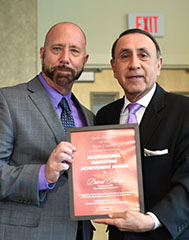 David Morse and Rick Aguilar
David Morse and Rick Aguilar
David Morse, New American Dimensions, Los Angeles, CA Receives an Award
By Claud Santiago
The 21th annual Multicultural Marketing Conference & Awards was held on March 25, 2017 at the Wellstone Center in St. Paul. The conference was presented by Aguilar Productions, the leaders in promoting the multiculturals markets in the U.S. This all-day conference drew an audience of marketing professionals from various organizations and businesses who were treated to an outstanding array of presentations by today’s thought leaders in multicultural marketing including David Morse, New American Dimensions, Los Angeles, CA and Rico Vallejos, marketing creative director from Minneapolis.
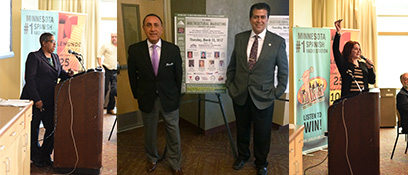
From left: Keynote speaker Cecilia Stanton Adams, Rick Aguilar and Rico Vallejos, and Lisa Mushett, USTA Northern.
Local organizations including the Ordway Theater, USTA Northern and the MNDNR Department of Parks and Trails presented case studies of their outreach efforts to the multicultural communities in the Twin Cities. Tom Gitaa, publisher of Mshale the African Community Newspaper, presented an interesting panel discussing marketing to the Emerging African community in the Twins. Cecilia Stanton Adams, was the keynote speaker at the Luncheon and delivered a very interesting diversity presentation to the attendees. Cecilia is CEO of the Stanton Adams Consulting.
Conference sponsors included, U.S. Bank , Minnesota Twins, La Raza 95.7 FM, Telemundo Minnesota, Latino American Today, Minnesota Multicultural Media Consortium, the Ordway Theater, and MNDNR.
 Marci Malzahn,
Founder of Malzahn Strategic
Marci Malzahn,
Founder of Malzahn Strategic
By Marci Malzahn
Many times people may think leaders have it easy, or that they do their own thing and are accountable to no one. Other times people may think leaders started being leaders and were also born leaders. But that is not the case. Being a leader is a huge responsibility and it’s not easy. Also, most leaders start as followers and have worked hard to be where they are today—even if they had the gift of leadership in them from the start. In fact, successful leaders are excellent followers themselves. Being a good follower is precisely what gives great leaders the foundation to be an example of integrity, honesty, and many of the other traits that we all admire in successful leaders. Below are some key traits of successful followers:
They need a teacher—a leader. Followers need to follow someone they trust and believe in—someone who is worthy of being followed.
Followers don’t doubt their teacher. They have complete faith that their teacher has his or her best interest at heart. They don’t fear that their teacher is out to get them.
Good followers get to know their teacher at the personal level. They understand their teacher (or leader) is also human and that they have a need for personal relationships too.
Good followers learn to appreciate their leaders for who they are. They are not “apple polishers.” They sincerely care for their leader.
Followers gather together to support their common leader. They don’t talk behind his or her back and they are loyal to their leader.
Good followers “do” what their leader tells them to do. They don’t second guess or question their leader each time he or she asks them to do something. In the business arena, of course, it is acceptable to ask questions to clarify direction and to bring your opinion but in the end, good followers learn to do what is asked of them unless it’s something illegal or unethical.
A good leader influences his or her followers and the followers allow themselves to be influenced. It’s a mutual relationship based on trust, something that is not common in the workplace these days.
Leaders give authority to their followers without fear that they will misuse that authority. Again, this exercise of giving authority to others is based on trust. Good followers accept that authority and use it wisely. Followers admire and look up to their teacher or leader. They want to and aspire to be like their teacher. They are proud of their teacher and not ashamed. They want to imitate their teacher and become more like him or her.
Successful followers receive instructions from their leader and work together to accomplish their common mission (or the vision of their company). They learn to use their various strengths as a team and get it done.
Now, let’s examine some of the traits we admire—and even expect—of successful leaders:
Leaders have the innate ability to influence others—at the core, that’s what leadership is about. Even though not everyone is born with the leadership gift or ability, every person who is in a leadership position can learn to be an amazing and influential leader.
Leaders are balanced—or continually strive to be balanced. Leaders understand the importance to live a balanced life. This doesn’t mean they don’t understand the responsibilities of their work life and don’t work enough. It means they also understand that if they are not taking care of themselves (their bodies, their physical well-being) and their family relationships, their level of influence at work will be diminished over time.
Leaders are learners. Most successful leaders are life-long learner individuals. They have a hunger for knowledge and enjoy the journey of learning. They also love to teach what they just learned.
Leaders have a good attitude toward life, which is manifested in their attitude and behavior at work and at home. We all know we cannot control circumstances but we can control our attitude. That I know because I have had to practice self-control and change my attitude many times when circumstances were negative around me. I know it can be done and you are the full beneficiary of the change in your attitude.
Leaders are hard workers. Regardless of the career they choose, leaders work hard. This doesn’t mean they work 90 – 100 hours a week, which some people do. That is almost irresponsible because they neglect their physical health, their relationships, and eventually it affects their effectiveness at work. They burn out. What this means is that they utilize their time wisely and have learned to manage their time successfully based on their values.
They focus their time on what’s most important—consistently. The key here is that they learned to say “no” to the things that clutter their lives with no significant impact or influence. And they say “yes” to the things that matter.
Most leaders are also followers. If you are a leader, choose to also be a good follower. Only then, will you become a true influential person. Only then, will you leave a legacy of goodwill in the lives of all the people you touch along the way. Therefore, choose carefully who you follow and choose to be the best leader you were meant to be.
As Latinos in the workplace, we have the great opportunity to be an example of being a good follower and then influence others as leaders. Take the responsibility of doing both seriously.
Marci Malzahn is a banking executive and founder of Malzahn Strategic (www.malzahnstrategic.com), a community bank consultancy focused on strategic planning, enterprise risk management and talent management. Marci is also an author and motivational/ inspirational speaker. You can contact Marci for speaking engagements through her website at www.marciamalzahn.com. You can purchase Marci’s books at www.Amazon.com.
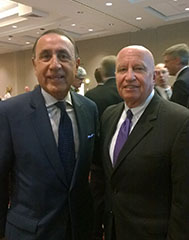 Left: Latino American Today Publisher, Rick Aguilar with Congressman Kevin Brady
Left: Latino American Today Publisher, Rick Aguilar with Congressman Kevin Brady
By Claud Santiago
Congressman Kevin Brady (R-TX) Chairman, House Ways & Means Committee was featured speaker at the Economic Club of Minnesota’s Inaugural Luncheon of their 2016-2017 Season. Many consider the House Ways & Means Committee to be the most powerful committee in Congress. A sold out audience listened to Brady, who has long been a leader on important economic issues, discuss his tax reform proposal. Brady explained that a new tax code needs to be fair and simple for everyone, so simple that most Americans could do their taxes on a form as simple as a postcard.
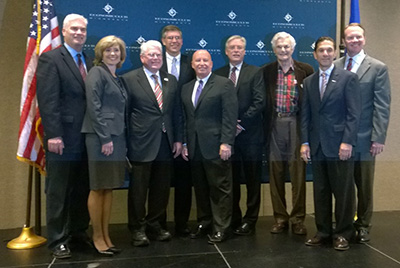 L to R: Congressman, Tom Emmer, Kristin Robbins, David Frauenshuh, Congressman Erik Paulsen, Congressman Kevin Brady, Tim Penny, Rudy Boschwitz, Elliot Jaffee, and Paul Koch
L to R: Congressman, Tom Emmer, Kristin Robbins, David Frauenshuh, Congressman Erik Paulsen, Congressman Kevin Brady, Tim Penny, Rudy Boschwitz, Elliot Jaffee, and Paul Koch
Brady said that our tax code should be built for growth and it should help make the United States the best place in the world to hire and invest. Also that if we’re going to have a better tax code, we need a better IRS, one that puts the taxpayers first. His blueprint offers a better way to dramatic reform—without increasing the deficit. It does so by promoting growth—of American jobs, wages, and ultimately the entire economy. Many local political leaders attended the Luncheon including Congressmen Erik Paulsen and Tom Emmer.
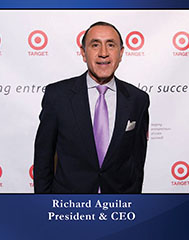 Left: Richard Aguilar, President and CEO
Left: Richard Aguilar, President and CEO
Aguilar Productions
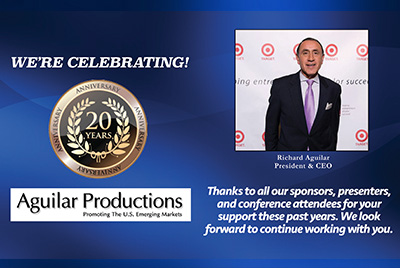
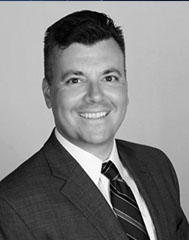 Left: Anthony Fernandez
Left: Anthony Fernandez
I chose to move to West Saint Paul to raise my family for many reasons. It’s affordable, safe, diverse and thriving. The city of West Saint Paul has a great deal of potential to make what is already a fantastic community, even better. I am proud to currently have the opportunity to serve the community on the Planning Commission. I am passionate to share my knowledge and experience to help enhance our city’s potential, and implement the needed changes. I am determined to bring my well-rounded perspective to the needs and wants of the community, both as a member of this community and as a business professional.
I am committed to:
• Sustainable Business Development
• Expanding our Tax Base
• Transparency & Communication in
Government
• Providing Adequate Resources for
Police and Fire
• Completing Robert Street Construction
with Thoughtfulness and Integrity
• Enhancing Public Safety
• Improving our Parks and
Recreation Centers
• Spending our Tax Dollars Wisely
• Community Involvement
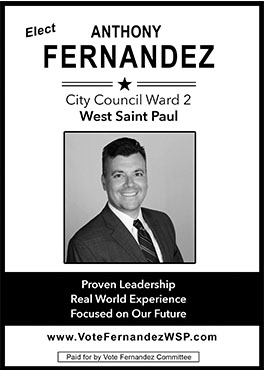
Dave Meisinger current Mayor of West St. Paul wants to be re-elected to another two year term this Fall. We spoke with Mayor Meisinger and here are his comments:
“Beyond the fact I enjoy the challenges of being mayor, I’m seeking re-election this year for many reasons. The most important being that the Robert Street project is not yet complete. The project has been plagued by millions of dollars of cost overruns due to poor planning, poor budgeting and poor oversight by the previous city council. My nearly three decades of construction management experience are needed to protect and limit our future investment in this project as well as the oversight of day-to-day activities at city hall. My record of fiscal responsibility and restraint is unmatched and I will continue to work to ensure maximum value for each taxpayer dollars spent!”
Besides the Mayor race, voters in West St. Paul will decide City Council seats also.
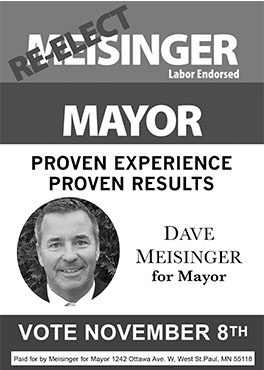
 Left: Marci Malzahn
Left: Marci Malzahn
By Marci Malzahn
Do you want to join our Board? That’s a question you don’t hear every day but it happens often when people see you have a heart to help others—especially in the nonprofit world. Twenty three years ago I joined the first nonprofit Board as a volunteer. My first position was Education & Training Chair for Financial Women International (FWI), a nonprofit association with the mission to empower women in the financial services industry. A few months later, the Treasurer resigned due to family health issues and I was asked to step up into that role even though I had just joined the Board. I gladly accepted because I love working with numbers and I saw it as a great opportunity to get to know the organization better. I served in FWI at one position or another for the next sixteen years. I was elected President of the local chapter twice and served even at the National Board level as a Director.
During my time volunteering with FWI, I made lifelong friends and business connections that are still alive today. I also received formal training on the Roberts Rules of Order, how to conduct effective Board meetings, and how to lead a nonprofit association made out of only volunteers. I learned to work in teams, hired speakers for our programs, and wrote monthly newsletter articles. In short, I learned the “soft skills” leaders need in order to be successful. Unfortunately, FWI is no longer in existence because organizations stopped supporting their members across the country starting in the ‘80’s through early 2000’s until we had to close it down in 2009, after existing and serving members for 88 years.
While I was the President of the Downtown Exchange Group leading 133 members, I completed the Management Certification Program they offered by reading several books and attending programs on the topics of management, leadership, negotiation skills, mentoring relationships, and many other important subjects. At the end of my term, my manager at the bank (where I was working at the time) came to my office and said, “Marci, let’s talk management.” She said that because of my willingness to volunteer to lead the association and because I had obtained the Management Certification through FWI’s Program, she felt I was ready to lead the bank’s branch, downtown Minneapolis. I was surprised to be asked since I had never supervised anyone up to that point (and I still didn’t have my college degree) but was very grateful for the new opportunity.
During my time at that bank I also volunteered to participate in the annual Juvenile Diabetes Foundation fund raising effort. My strategy was to ask all the senior executives and owners to support me so I could raise the most amount of money and win the contest. I won. The reward was dinner with the owners of the bank. Because of my willingness to volunteer, I was now being recognized and became more visible in the organization.
Since I started volunteering on Boards I have made my individual contribution of “the four T’s”: time, talent, treasure and touch (connections). Each nonprofit organization I’ve worked with has made a contribution back into my life. We always think that we’re the ones helping them but we receive so much more in return.
There are many ways you can volunteer if you don’t like to serve on a Board. You can volunteer to work directly with the organization’s clients or work behind the scenes to help with the administration or in the warehouse/back room organizing donated items. There are countless ways you can get involved just as there are countless nonprofit organizations that can use your help and talents. The best way to decide where to help is by asking yourself the question: Who do I want to help? Then look for an organization that helps those people and get involved if their beliefs align with yours. Here are some examples of organizations that you could get involved that I’ve had great experience working with:
• Big Brothers Big Sisters: Become a Big and mentor a child. Participate in their programs so Bigs and Littles can have fun together. www.bigstwincities.org
• Way to Grow: Volunteer to work with a minority, low income family so their children are ready for Kindergarten. www.waytogrow.org
• Jeremiah Program: Go with your friends or co-workers and cook a meal for the single mothers and their children. www.jeremiahprogram.org
• Matter: Volunteer to work in the warehouse categorizing donated items. www.mattermore.org
• Minnesota Center for Book Arts: Volunteer at one of their events. www.mnbookarts.org
• Feed My Starving Children: Go with friends or co-workers and volunteer to pack meals. www.fmsc.org
By serving on nonprofit Boards I learned how to serve on for-profit organizations’ Board of Directors too. The rewards I have received by serving are many and each has significantly enriched my life. I have never considered it a waste of time. To the contrary, I consider my time invested an amazing opportunity to grow, to learn, and to meet beautiful people across the country (and the world). I now serve on four boards, three of which are nonprofits. I invite you to check out my business website and visit the Community Involvement page so you can get ideas of various nonprofits we support, learn about their individual missions, and start using your talents to serve others. The time to volunteer is NOW. People need your help!
Marci Malzahn is a banking executive and founder of Malzahn Strategic (www.malzahnstrategic.com), a community bank consultancy focused on strategic planning, enterprise risk management and talent management. Marci is also an author and motivational/ inspirational speaker. You can contact Marci through her website at www.marciamalzahn.com, and for speaking engagements please contact Preferred Speakers at www.preferredspeakers.com.
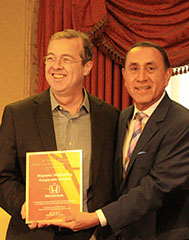 Left: Andrew Orci, Orci Agency and Rick Aguilar
Left: Andrew Orci, Orci Agency and Rick Aguilar
By Claud Santiago
The 20th annual Hispanic marketing conference was held on May 25, 2016 at the Hilton Minneapolis hotel. The conference produced by Aguilar Productions based in St. Paul, was sponsored by U.S. Bank, Minnesota Twins, La Raza 1400-1470 AM, Telemundo Minnesota, SPNN, Hilton Minneapolis Hotel, and Minnesota Multicultural Media Consortium. The focus on the conference was Sports & Entertainment and featured a panel that included Miguel Ramos, Director of Diversity for the Minnesota Twins; Manny Lagos, Sporting Director of the MN United FC; and Tony Sanneh, President & CEO of the Sanneh Foundation, and retired U.S. National Team and World Cup Veteran.
Presenters Nancy Hernandez, President of Abrazos Multicultural Marketing based in Milwaukee; Heidi Pellerano, Executive VP Brands, Wasserman Media Group; and Carlos de Leon, CEO of De La Riva, both based in Miami, presented great insights, strategies, and case studies releated to marketing sports to the multicultural segments. Maya Santamaria spoke at the luncheon and described the beginning of forming Santamaria Broadcasting and how her company influences Hispanic marketing in the Twin Cities.
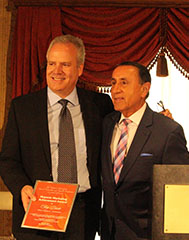
Left: Tony Dieste and Rick Aguilar
The following individuals received awards at the conference:
Tony Dieste, Chairman of Dieste, Inc. Omnicom Group, Dallas TX received the Hispanic Marketing Achievement Award. David Burgos, SVP Cultural Strategy for TNS Global received the Hispanic Marketing Research Achievement Award and the Honda Motor Company, won the Hispanic Corporate Marketing Award with the award being accepted by Andrew Orci of the Orci Agency based in Los Angeles.
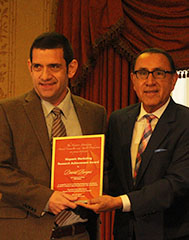
Left: David Burgos and Rick Aguilar
Congratulations to Aguilar Productions on their 20th Anniversary of producing conferences and seminars focusing on the U.S. Multicultural markets.
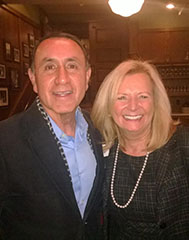 Rick Aguilar and Darlene Miller
Rick Aguilar and Darlene Miller
By Claud Santiago
The race for Minnesota’s 2nd Congressional District is expected to be one of the most competitive in the nation. Darlene Miller, a successful business owner, picked up the endorsement of John Kline, the man who currently holds the seat. Kline is retiring after serving seven terms representing the district. Miller is the owner and CEO of Permac Industries, a precision machining company custom manufacturing precision parts for customers worldwide in virtually all industries located in Burnsville, MN. Under her leadership Permac Industries was named the U.S. Chamber Small Business of the Year for the entire USA in 2008.
The district includes a large Hispanic population in West St. Paul, South St. Paul and other cities in the area. Rick Aguilar, President of Aguilar Productions, who is a resident of West St. Paul is supporting Miller in this race. Aguilar is a past Chairman of the St. Paul Area Chamber of Commerce and was founder and President of the Minnesota Hispanic Chamber of Commerce. Aguilar is very active in Republican politics and feels that Miller is a candidate who can and will win in November. “I believe that Darlene has the conservative values and real-world experience we need in Congress,” stated Aguilar.
“Democrats always want to talk about the disparities in the Hispanic community and never mentioned that we have a successful Hispanic business community, that pays taxes and employees thousands of Hispanics. We need someone in Congress that realizes that high tax rates and the countless regulations here in Minnesota hurts business owners, that’s why I’m supporting Miller,” explained Aguilar.
“I want to thank Mr. Aguilar for his support and I feel that the Hispanic culture with its strong religious beliefs, family values and desire to overcome poverty through hard work, is something I admire. The Hispanic community plays an important part of why Minnesota is a great place to live and I want to see that their community has more opportunites to live the American Dream,” Miller stated.
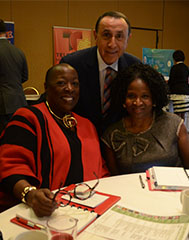 L to R: Sheila Thorne, Rick Aguilar, and Roslyn Daniels
L to R: Sheila Thorne, Rick Aguilar, and Roslyn Daniels
By Claud Santiago
The 20th annual Multicultural Marketing Conference—Focus on Health & Wellness was held on March 24, 2016 at the prestigious Hilton Minneapolis Hotel presented by Aguilar Productions. This all day conference drew an audience of professionals from various Health and Wellness organizations who were treated to an outstanding array of presentations by leading thought leaders in multicultural health marketing.
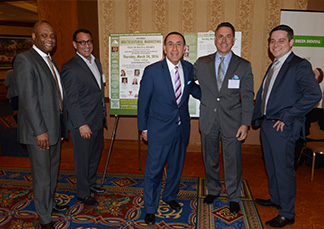 Kevin Lindsey, MN Commissioner of Human Rights; Carlos Santiago, Rick Aguilar; Dr. Alejandro Badia, OrthoNow, Miami, Florida; and Carlos Garcia, BCBS IL
Kevin Lindsey, MN Commissioner of Human Rights; Carlos Santiago, Rick Aguilar; Dr. Alejandro Badia, OrthoNow, Miami, Florida; and Carlos Garcia, BCBS IL
Attendees included, UnitedHealthCare, UCare, HealthPartners, Hennepin Health, Medica, MN Dept.of Health, MN Dept. of Human Services, American Red Cross, American Diabetes Association, St. Mary’s Health Clinics, Carver County, Scott County, Washington County Public Health groups, Delta Dental, Park Nicollet, Benedictine Health System, Optum, Minneapolis Dept. of Health, MN Dept. of Human Rights, NorthPointe Health & Wellness, Direct Benefits and many others.
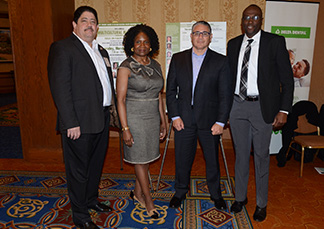 Miguel Ramos, MN Twins; Roslyn Daniels, Black Health Matters; Manny Rodriguez, CultureSpan; and Tom Gitaa, Mshale, the African community newspaper.
Miguel Ramos, MN Twins; Roslyn Daniels, Black Health Matters; Manny Rodriguez, CultureSpan; and Tom Gitaa, Mshale, the African community newspaper.
Conference sponsors included, Hilton Minneapolis, Minnesota Twins and La Raza 1400 am. Telemundo Minnesota Latino American Today and Minnesota Multicultural Media Consortium.
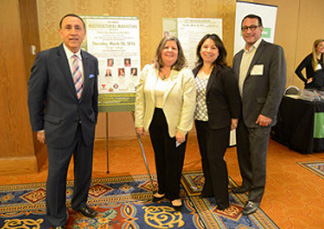 L to R: Rick Aguilar, Yasmine Winkler, UnitedHealthcare;
Adriana O’Meara, Optum; and Carlos Santiago
L to R: Rick Aguilar, Yasmine Winkler, UnitedHealthcare;
Adriana O’Meara, Optum; and Carlos Santiago
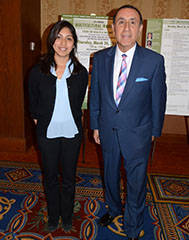
L to R: Sury O'Campo and Rick Aguilar
Sury O’Campo (pictured above) is doing an internship at the carver county public health department through Normandale community college. Sury is in the community health worker navigator program at Normandale. This program focuses on building a bridge between the healthcare system and the client.
“A community health worker is an advocate for the client and the community, building trust and understanding the needs of the community, this allows the healthcare agency to understand what their clients and provide better care,” Sury explained.
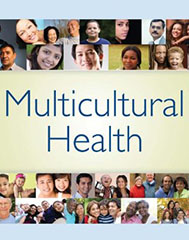 By Claud Santiago
By Claud Santiago
Although Minnesota has long been one of the healthiest states in the country, almost 15% of Minnesotans tend to experience much worse health in several areas. Overall, Populations of Color, Hispanics, Asian Americans, African Americans, Africans and Native Americans experience shorter life spans, higher rates of infant mortality, higher incidence of diabetes, heart disease, cancer and other diseases, and poorer general health. Prevention can improve health in these communities and help manage health care costs.
Minnesota must work to eliminate health disparities by expanding access to affordable health care, strengthening the health care workforce, investing in prevention, and improving data to more accurately document health disparities.
Health disparities are defined as the difference in the burden of diseases and health status that exist among specific population groups. They are closely linked with social, economic and environmental conditions. Health disparities may affect certain populations based on gender, age, ethnicity, socio-economic status, geography, sexual orientation, disability or special health care needs. Health disparities occur among groups that have persistently experienced historical trauma, and discrimination. These groups experience worse health or greater health risks than other populations.
Any effort to reduce health disparities must first identify where gaps exist. In our current health care system, data collection is fragmented; information on race, ethnicity, or primary language is not always collected; and data is often not readily available to policy makers and the public.
Health reform would make sure that qualified health plans in an Exchange provide culturally and linguistically appropriate communication and health services. There will also be an emphasis on training health professionals to improve their cultural competence. The Minnesota Business Partnership, an organization made up of Minnesota’s largest employers recently issued a report of the healthcare system in Minnesota...it stated “increasing ethnic diversity will challenge our local healthcare system, which must address different underlying health needs and bridge cultural and language barriers.”
 Presidential candidate Marco Rubio
Presidential candidate Marco Rubio
Republican Marco Rubio is an early favorite among Minnesota voters in the presidential race, according to a new Star Tribune poll.
In a hypothetical matchup between Rubio and Hillary Clinton, Rubio leads Clinton by nine points, 49 to 40 with 11 percent undecided. The poll suggests that Rubio has wide appeal among Republicans seeking an alternative to Donald Trump and Ted Cruz who could win over independents in the general election.
Minnesota has various segments in the Republican party, libertarians, social conservatives, and fiscal conservatives. “Rubio appeals to many Republicans as a big-tent Republican who can bring people together,” said Maria de la Paz, Vice-Chair of the Minnesota Hispanic Republican Assembly (HRAMN) who have endorsed Rubio. “He’s conservative and can articulate and present solutions for many of our country’s important issues,” declared HRAMN Secretary, Tony Torres.
“The reason so many Minnesotans are talking about Marco Rubio is that he’s the most exciting presidential candidate we’ve seen in many years. Marco has lived the American Dream and he is a next-generation conservative leader who can unite our country and truly inspire Americans.”
— Jeff Johnson, Minnesota State Chair, Marco Rubio for President campaign.
The Star Tribune poll also shows that a large number of voters in particular independents are still undecided. Rubio appears to have an advantage in appealing to independents Minnesota voters, who could prove crucial in the general election. Independents break 54 percent for Rubio and 30 percent for Clinton in head-to-head matchup.
Minnesota’s party caucuses are March 1, a date shared with 14 other states that either caucus or hold primaries. The caucuses usually draw the party faithful. This year about 60,000 Minnesotans are expected to participate. “We expect to be very active in our caucus this year getting voters for Rubio “ said Frank Mendez, Chair of HRAMN.
“We’re so excited to see a Latino candidate leading in a presidental poll in Minnesota,” stated Rick Aguilar, long time Republican activist and HRAMN founder.
Latino American Today reports that Marco Rubio records a strong third-place finish in the Iowa Caucuses, 300 votes short of second-place Donald Trump.
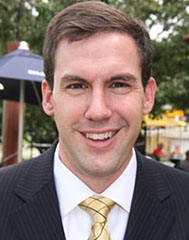 Ed Matthews CPA, ESQ
Ed Matthews CPA, ESQ
You have worked hard your entire life to earn an income and provide for your family. Now is the time to make sure you have an effective estate plan in place to provide financial certainty and peace of mind for you and your loved ones.
Estate planning is the creation of a definite plan for maintaining your wealth while you are alive and distributing it after you pass away. When people are asked to summarize their estate planning goals, most say:
• They want their estate to be distributed to the people they choose according to their wishes;
• They want to avoid excessive attorney’s fees, court costs and unnecessary delays in passing their property; and
• They want to avoid, or at least minimize, the payment of state and federal death taxes.
To accomplish these goals, it is imperative to work with a qualified professional who is knowledgeable in both estate law and taxation. Ed Matthews is one of the very few Minnesota estate planning attorneys who is also a currently licensed Certified Public Accountant (CPA). He is therefore uniquely qualified to address all aspects of your estate planning needs.
Call today for a free, half-hour, no obligation consultation.
Telephone: 651-501-5608
Facsimile: 651-344-0630
Email: ematthews@matthewslawoffice.net
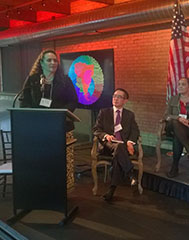 Rachel Limon moderates panel discussion
Rachel Limon moderates panel discussion
By Claud Santiago
The South American Trade Forum, held at the Minneapolis Events Center, attracted over a hundred attendees including, business leaders, diplomats, government and private sector trade experts and Latino community members. Participants were provided informative information about trade policies, trade opportunities and the personal make-up of many of the key countries in South America.
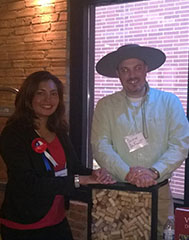
Carolina & Dustin DuFault, Vinacurean Tours, www.Vinacurean.com
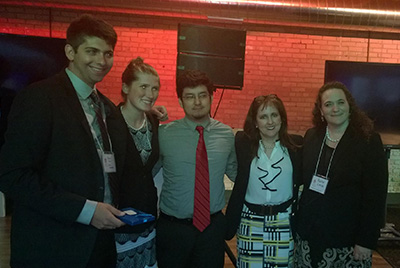
Forum organizers: (far right) Silvia Ontaneda and Rachel Limon
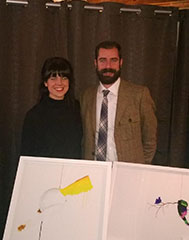
Carolina Borja and Alonso Luengo Gómez Mont www.carolinaborjastudio.com
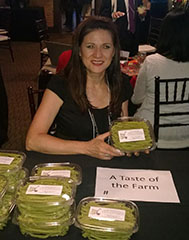
Patricia Byrantt, A Taste of the Farm

Ana Christian Monson Nerium, Independent Brand Partner
The forum also included a cultural expo and trade show, delicious South American cuisine and entertainment. Thanks to Silvia Ontaneda, Consul General de Ecuador to Minnesota and Rachel Limon, International Trade Representative, Minnesota Trade Office and the many volunteers and presenters, for organizing this successful event. We look forward to the next conference.
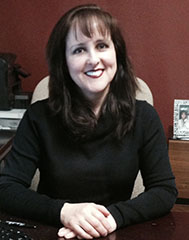 Silvia Ontaneda,
Consul General of Ecuador
Silvia Ontaneda,
Consul General of Ecuador
By Isaac Evans
Business and political leaders from around the Midwest will converge on Minneapolis for the fourth annual South American Trade Forum on Wednesday, Oct. 28.
“This one-of-a-kind event helps promote bilateral trade and cultural understanding between Minnesota and South America,” Silvia Ontaneda, Consul General of Ecuador said. “The Trade Forum is an extremely valuable resource for businesses considering importing, exporting, or investing with the region and interested in hearing from Minnesotan and South American business and political leaders.”
The Trade Forum emphasizes knowing a culture in order for businesses to be successful in a region. To that end, attendees have the chance to take part in three panels throughout the day. The first brings together some of Minnesota’s most prominent companies that operate in South America to discuss strategies, market opportunities, successes, and operations in the region.
The second convenes Minnesota’s small business leaders to present on market entry opportunities, and successes in South America for small to medium-sized businesses. At the final panel, Representatives from South America discuss how to enter the market and opportunities they see for trade and investment.
“All panels offer attendees an invaluable resource for learning, and connecting with, leaders from Minnesota and South America,” Consul Ontaneda said. “Businesses considering importing, exporting, or investing within the region won’t want to miss this year’s event.”
Following the Trade Forum is the first-ever Cultural Exhibition from 5:30-9p.m. The exhibition gives patrons the opportunity to explore the cultures of seven different South American countries through food, drink, art, and live entertainment.
The forum will take place on Wednesday, October 28, from 8 a.m.-5:15p.m. at the Minneapolis Event Center. Admission is $95, which includes authentic South American food and drinks. Additional options include a combined ticket for the Trade Forum and the subsequent Cultural Exhibition for $125. Register at www.southamericantradeforum.com.
 Marci Malzahn, Founder of Malzahn Strategic
Marci Malzahn, Founder of Malzahn Strategic
By Marci Malzahn
When I was a little girl I used to play Monopoly with my siblings and I always volunteered to be the bank. I remember organizing all the money by denomination and giving my siblings loans so they could pay me when they landed on the coveted railroad stations.
When I came to Minnesota in January, 1986, I needed a job and I thought that since I enjoyed working with money, people, and computers, then a teller job at a bank should be fun. And it was. I applied to all the banks downtown Minneapolis and, after many rejection letters, one bank gave me the opportunity to work as a teller, Marquette Bank Minneapolis. At the time, I never imagined that this was the beginning of a long and exciting banking career.
I spent thirteen years with the Marquette Bank family, held nine jobs and was promoted several times. My last job was as branch manager of Marquette Capital Bank. Then I left banking and went to work for a non-profit organization. Five years later, one of my previous bosses at the bank, asked me to join him and start a bank. In 2005 we started building the team and the infrastructure for a brand new bank, Tradition Capital Bank, which opened July, 2005. After almost ten years and having held the positions of CFO, COO and CRO, I felt my mission at the bank was complete and decided to start a bank consulting practice helping other banks be successful by strengthening their infrastructure. I work with banks that need Strategic Planning, Enterprise Risk Management, and Talent Management expertise.
My career in banking has been very rewarding. Banking is a career that “just happens” to many people. I have met bankers who were previously teachers, dental hygienists, history majors, psychologists, farmers, and business owners who decided to get into the banking business with no banking background. Banking is a career that you can learn on the job, acquiring experience in every job you have through the years.
There are two paths that you can take in banking. The sales track or the operations track. If you like working with clients, are not afraid of selling, and understand numbers, then you could go the route of a personal banker, private banker, or business banker. They work with individuals and businesses to provide banking services. To get to these positions, a person usually starts as a teller, loan operations, or credit analyst. If you prefer to help the sales team ensure all the products they offer work correctly, that their clients are taken care of, and like to know how banking works behind the scenes, then you may do great in operations. There are some people that enjoy working with clients but they don’t want to sell. Customer service positions, operations assistants, and online banking specialists are great positions to do that.
If you enjoy working with numbers, preparing reports, and analyzing data, then a career in finance, treasury, and bank accounting would fit you well. These positions interact with the bank presidents and board of directors in small community banks. In large institutions, you may find yourself in a big team to perform these functions. In these positions, Microsoft Excel is your best friend so you would need to know it very well. There are also opportunities for the IT field, HR and Marketing within banking.
For those who like learning about banking regulations and writing procedures, then there is the never ending world of compliance, internal audit, and risk management. The credit area could be a combination of working with policies, procedures, credit analysis, working with new business clients, and also working with workout clients—the ones that didn’t pay their loans for whatever reason.
With the Latino population increasing in the US, many banks are looking for bilingual bankers. Therefore, unlike the perception that it may be hard to get into it, there are a lot of opportunities for Latinos to pursue a career in banking. If you speak fluent Spanish and English, are willing to learn banking and work hard, you can have a fruitful and fun career in banking. So yes, it could happen to you!
Marci Malzahn is a banking executive and founder of Malzahn Strategic, a community bank consultancy focused on strategic planning, enterprise risk management and talent management. You can contact Marci through her website at www.malzahnstratetic.com, and for speaking engagements please contact Preferred Speakers at www.preferredspeakers.com.
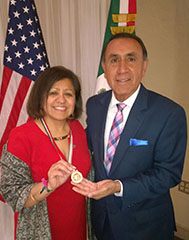 Elia Bruggeman, Deputy Education Officer at the Minneapolis Public Schools received the prestigious Mexican OHTLI award.
Elia Bruggeman, Deputy Education Officer at the Minneapolis Public Schools received the prestigious Mexican OHTLI award.
By Claud Santiago
The Consulate of Mexico in St. Paul located on East Seventh Street celebrated its 10th anniversary with a reception and program held on Harriet Island. Over 400 attendees including, Hispanic business, civic and political leaders along with St. Paul Mayor Chris Coleman and many other special guests and friends of the Hispanic community enjoyed a beautiful evening on the Mississippi River venue.
The past and current consuls attended the celebration they included, Nathan Wolf, Ana Luisa Fajer and current consul Alberto Fierro.
The Hispanic population in Minnesota grew 75 percent between 2000 and 2010 when, according to the U.S. Census Bureau, it reached 250,258. That number is not just in the Twin Cities: Large pockets of new immigrants have been settling in smaller communities like Worthington.
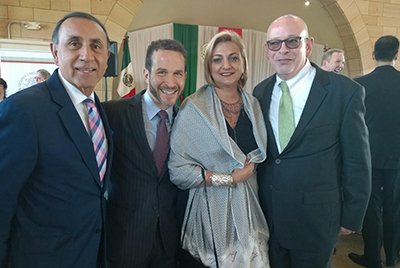 Pictured left to right: Rick Aguilar with past and current Consuls of Mexico: Nathan Wolf, Ana Luisa Fajer, and current Consul Alberto Fierro.
Pictured left to right: Rick Aguilar with past and current Consuls of Mexico: Nathan Wolf, Ana Luisa Fajer, and current Consul Alberto Fierro.

Pictured left to right: CLAC director Hector Garcia and Chris and Rebeca Sedarski
at the celebration.
The Hispanic population in Minnesota grew 75 percent between 2000 and 2010 when, according to the U.S. Census Bureau, it reached 250,258. That number is not just in the Twin Cities: Large pockets of new immigrants have been settling in smaller communities like Worthington.
 Pictured above, left to right: The staff from Academia Cesar Chavez (in the center) school founders Ramona and Francisco Rosales.
Pictured above, left to right: The staff from Academia Cesar Chavez (in the center) school founders Ramona and Francisco Rosales.
While Minnesota has drawn new residents from many different Latin American countries, Mexico remains a large source for immigrants.
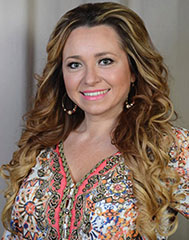 By Claud Santiago
By Claud Santiago
Santamaria Broadcasting, home of La Raza1400 am/1470am, Telemundo Minnesota, Santamaria Enterprises and El Nuevo Rodeo will be receiving the Hispanic Marketing Corporate Award, at the 19th annual Hispanic Marketing Conference & Awards, May 19th in St. Paul. Maya Santamaria, owner of Santamaria Broadcasting, will be receiving the award at the conference luncheon.
Santamaria is a talented Latina who has a degree in anthropology, directed two Latino art centers, and studied Mexican and Chicano music in Minnesota. Her music career included singing and promoting, and in 2003 Maya opened El Nuevo Rodeo, the most successful Mexican nightclub in the Twin Cities. La Raza radio followed and recently she added Telemundo Minnesota to her company list.
The Hispanic Marketing Corporate Award criteria includes: Hispanic marketing efforts, locally, regionally, nationally, efforts in hiring and promoting Hispanics, and involvement in the Hispanic community. The award selection committee all agreed that Santamaria Broadcasting was deserving of the award. Other award recipients include Miguel Luis Messianu, President-Chief Creative Officer of ALMA Advertising, Miami, Fl, and Doug Darfield, Managing Director Programming and Research at Hemisphere Media Group, Inc., Miami, Flordia. Michelle Headley, Vice President of Operations for ALMA will also be featured at the conference. To register for the conference go to the conference web site at www.aguilarproductions.com.
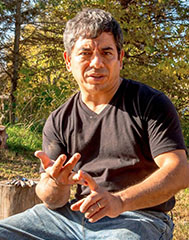 By Reginaldo Haslett-Marroquin
By Reginaldo Haslett-Marroquin
Chief Operating Officer, Main Street Project
Agriculture – sustainable agriculture, specifically – has always been a part of my life. The farming principles that I learned growing up in Guatemala are the exact ones that serve as the backbone of Main Street Project’s approach – one that considers the social, economical and ecological impact every step of the way.
Since its founding in 2005, Main Street Project has resolved to build a resilient food system. Its approach focuses on developing a regional hub of small, highly efficient farms in rural communities that deliver healthy, wholesome food. At the heart of Main Street Project’s systems approach: chickens.
But it’s about more than just creating food – Main Street Project provides economic opportunities through farmer entrepreneurship for underemployed, marginalized community members and offers much-needed economic stimulation in rural communities.
The Main Street Project approach has been well received by the Latino community, and with chickens – a culturally familiar and economically feasible entry point for many immigrant populations – at the center of the system and an approach that emphasizes the importance of fully leveraging local growing conditions and crops, Main Street Project’s Regional Farm concept is poised to be replicated in communities far and wide.
 (Pictured above) Reginaldo Haslett-Marroquin feeding and observing the chickens
(Pictured above) Reginaldo Haslett-Marroquin feeding and observing the chickens
Sharing Main Street Project’s mission and approach nationally and internationally is an endeavor that aligns with my passions and values. It’s about doing what’s right … what’s right for the farmers, consumers, earth and communities. We have a long way to go, but our base of supporters continues to grow. The Minnesota Legislature recently honored me with a congratulatory resolution for my work with immigrant families in agriculture.
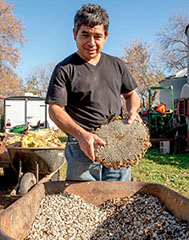 Reginaldo showing the process of harvesting the sunflowers
Reginaldo showing the process of harvesting the sunflowers
“I met Reginaldo a few years ago and I am impressed with his work and the rapid development of the new ideas he has brought to Minnesota’s agriculture,” said Rep. Rod Hamilton, R-District 22-B. “I support his work because it brings about new thinking and diversifies the options for farmers in the state who want to start making a transition to alternative farming systems, and brings about a system-level structure for new immigrants to raise their families while producing and delivering healthy foods to our markets.”
Main Street Project is committed to challenging what’s been coined as the “conventional approach.” This definition is a bit ironic given that there are generations of success stories to show the ecological and economic benefits of Main Street Project’s efficient approach. So let’s get to work on building and supporting a community of farmers that is committed to doing what’s right and sharing its knowledge to ensure access for all.
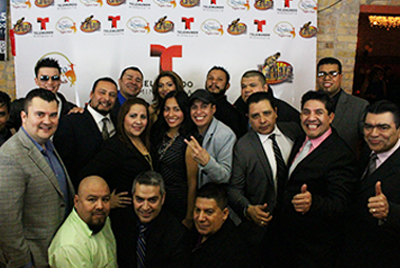 The Telemundo/La Raza staff celebrates at the launch event
The Telemundo/La Raza staff celebrates at the launch event
Photo by Jesus Martinez
On Friday, 30th of January, Hispanic Television Broadcasting presented the Grand Opening of Comcast coverage for the newest and hottest Spanish Television Station, Telemundo Minnesota. The event was held in the beautiful 27 Event Center Ballroom in El Nuevo Rodeo in Minneapolis.
“KJNK Telemundo Minnesota Channel 25, along with La Raza Radio Stations, are proud to be the primary connection to the Hispanic Market in the Minneapolis area. “We are very excited to be on the Comcast lineup and to partner with Comcast to provide even more value to the advertising community,” stated Maya Santamaria, CEO of Santamaria Broadcasting and Hispanic Television Broadcasting. Telemundo was recently acquired by NBC Universal and is the top-rated Television Network for Latinos in the country.
One of the future benefits to the local community with the creation of a local Telemundo Affiliate will be the introduction of new and exciting local programming geared to the Hispanic viewer. Plans are underway to develop programs with a local flavor that will present news, sports, entertainment and coverage of local events that will be of interest to the Hispanic community.
 (Pictured left) Maya Santamaria, CEO of Santamaria Broadcasting and Hispanic Television Broadcasting
(Pictured left) Maya Santamaria, CEO of Santamaria Broadcasting and Hispanic Television Broadcasting
Telemundo MN, in conjunction with La Raza 1400 and 1470 radio stations, will bring the community together en mass with its Special Events, showing the power of the stations within the community. KJNK Telemundo Minnesota will be Producing major Latino local community events in 2015 like Cinco de Mayo, Big-name Latin concerts, and Mexican Rodeos. In the summer of 2015, the station will bring to Minneapolis La Banda Ms, one of the most exciting and popular bands from Mexico for an outdoor Rodeo that promises to be one the Largest Events of the year. Telemundo Minnesota also sponsors ongoing Regional Mexican and Tropical Music concerts at El Nuevo Rodeo.
Telemundo Minnesota channel 25 can now be seen on Comcast channel 100 and Digital Channel 624. To contact Telemundo Minnesota, call (612) 728-0101 or Sales Manager Nick Lopez at (612)594-6300.
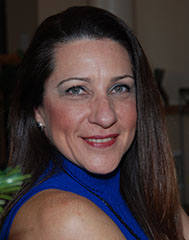 Last year I spoke at the Latina Women Leadership Program offered by St. Catherine University in St. Paul, MN. There were about 15 Latina professional women in the group and I was impressed with their level of education and the variety of careers represented in the class. The workshop was very fun to do and I came home energized and excited about all the new connections I had made. I told my husband, “There is more women like me, right here in Minnesota!”
Last year I spoke at the Latina Women Leadership Program offered by St. Catherine University in St. Paul, MN. There were about 15 Latina professional women in the group and I was impressed with their level of education and the variety of careers represented in the class. The workshop was very fun to do and I came home energized and excited about all the new connections I had made. I told my husband, “There is more women like me, right here in Minnesota!”
When I said those words, I suddenly realized how much support I have missed by being on my own in Corporate America, navigating the executive positions and the board rooms alone. We all know that being a professional executive woman is lonely… Being a Latina professional executive woman is even lonelier—or at least that has been my experience here in the Midwest.
I have to admit, I have not been very involved with the Latino community in Minnesota since I came here 28 years ago. The main reason is that I wanted to “melt in the melting pot” and not be seen as different. But the truth is—I am different. I am unique. I came here with all my values, morals, and my own cultural background, which is a combination of my native country of Nicaragua and Dominican Republic, the country that took my family in for seven years after the revolution in 1979.
Yes, I am different and unique, which is what makes me “me.” And I love that! I am a professional Latina woman. At the same time, I’m no different than other professionals—male or female—when you consider what a true professional is.
I just gave a presentation based on James Ball’s book called Professionalism Is for Everyone. In his book, Mr. Ball shares the five key characteristics that distinguish a professional: Character, Attitude, Excellence, Competency, and Conduct. You see, it doesn’t matter where you’re from or if you’re male or female, what matters is that you conduct yourself as a professional—consistently. But, is that enough to succeed?
There are three key challenges we face as Latina Women professionals:
The first challenge is the language barrier – Depending on when you arrived in the United States, you may have a strong accent, which makes it difficult to communicate. You can improve in your pronunciation just by practicing but also just embrace your accent and have fun with it. It’s a great conversation point! You must, however, dominate the English language and know it well.
The second challenge is being considered a “person of color.” It doesn’t matter where you’re from, if you’re not from Scandinavian descent, here in Minnesota, you’re considered “dark skin” and “Hispanic.” I had to learn to accept that even though I have very fair skin and get freckles when exposed to the sun, here in Minnesota, I’m dark. Oh well!
The third challenge is that you are a woman. Women across America are still facing the same challenge of pay equity for same types of jobs, or lack of promotions, or simply not belonging to the “boys’ club.”
So what are you going to do about these challenges? What can you do?
Here is how you can help each other and those that are coming after you:
• Find each other! Once you find other professional women, reach out and stay connected.
• Connect other Latina women with those you know and introduce them to people that may be able to give them new opportunities in the future.
• Mentor someone younger and teach them what you’ve learned to navigate the corporate world.
• Sponsor someone. Sponsoring goes beyond an introduction. It is when you put your reputation at risk for that person so they have a better chance of getting a promotion or a specific job.
• Continue your own education. Get your credentials in place so you can compete for higher positions.
• Never give up trying.
Enjoy and embrace being a Latina professional woman. You are unique and you are special. Your contributions are needed right here in Minnesota as well as the rest of the U.S.
Marcia (Marci) Malzahn is a native of Nicaragua. She came to Minnesota in 1986 and started a career in banking. After 13 years in banking, she moved to the non-profit field and switched careers to technology. In 2005 Marci returned to banking, this time to start a new bank. She started as CFO and VP of Operations and was the first employee. In her role, Marci oversaw all the operations areas of the bank, which included Finance, IT, Compliance, Internal Audit, Deposit/Loan Operations, Office Management, and HR. Her last position was Executive Vice President, Chief Operating Officer and Chief Risk Officer of the bank.
Starting the bank allowed Marci the opportunity to lead various teams and to work with attorneys, auditors, regulators, vendors, Board of Directors, shareholders, senior management, and employees. Marci has been in management for the past 18 years and 13 of those years in senior executive leadership positions.
After almost ten years of growing the bank from zero to $300 million in assets, Marci decided to start her own bank consulting practice, Malzahn Strategic, focusing on Strategic Planning, Enterprise Risk Management and Talent Management for small community banks. Marci is also a public speaker and author of her book Devotions for Working Women. She’s working on her second book, which she hopes to publish in 2015.
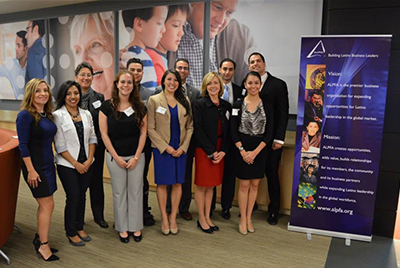 ALPFA Board and corporate partner UnitedHealth Group: (Back row) Sandy Lehman (UHG),
Javier Casillas Ortiz, Radhames Nova, Chris Fernandez, and Andres Reza; (Front Row) Marianella Cardenas, Adria Cordova, Alex Gonzalez, Elisa Baral, Anne Leighton (UHG), and Diana Solis
ALPFA Board and corporate partner UnitedHealth Group: (Back row) Sandy Lehman (UHG),
Javier Casillas Ortiz, Radhames Nova, Chris Fernandez, and Andres Reza; (Front Row) Marianella Cardenas, Adria Cordova, Alex Gonzalez, Elisa Baral, Anne Leighton (UHG), and Diana Solis
With more than 23,000 members nationwide, ALPFA, Inc. has been and continues to be the largest Professional Latino Association in the United States. ALPFA’s national repertoire consists of 130 student chapters, 42 professional chapters, and has served the community for 42 years.
The local ALPFA Twin Cities chapter, reestablished in 2013, continues to grow! UnitedHealth Group hosted ALPFA Twin Cities’ first annual Corporate Breakfast Reception on October 15, 2014, at their newest Optum location in Eden Prairie. In addition to UnitedHealth Group employees, representatives were in attendance from companies such as General Mills, Thomson Reuters, Travelers, COUNTRY Financial, Target, Best Buy, US Bank, KPMG, Cargill, Ecolab, Advantage Sales & Marketing, Unilever, and Owning It! The BOLD! FACTOR.
Anne Leighton, a Talent Acquisition Manager at UnitedHealth Group, gave an overview of the Company’s lines of business and shared their integration and influence in the Latino market.
She demonstrated how diversity and inclusion are embedded into their organization’s values of integrity, compassion, relationships, innovation and performance, and how it is necessary to accomplish their overall mission of helping people live healthier lives in their communities. This was followed by a national update from Radhames Nova, Executive Director of the ALPFA Boston chapter. Radhames shared ALPFA’s vision under the new direction of Charlie Garcia, ALPFA’s CEO.
ALPFA is undergoing the most important transformation in its 42-year history. Charlie’s vision includes growing from our current 23,000 members to 100,000 in the next 3 years! From the Twin Cities chapter, Andres Reza, President, gave an overview of the chapter’s history and recent activity. This was followed by impact and reflections given by Diana Solis, ALPFA Board Member, and Zach Shapiro, ALPFA Student Board Member, who shared their inspiring ALPFA stories and the positive impact ALPFA has on their personal and professional lives. Concluding remarks were given by Elisa Baral, VP of Corporate Partnerships, which was followed by networking.
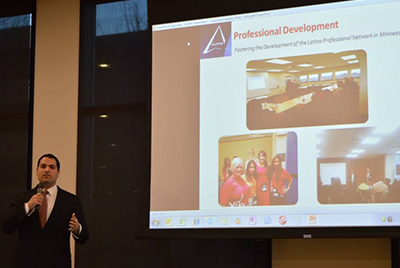 Andres Reza, President of ALPFA Twin Cities, giving an overview of the chapter
Andres Reza, President of ALPFA Twin Cities, giving an overview of the chapter
Thank you again to UnitedHealth Group for hosting this event, and to all of our sponsors for your support! Current Sponsors include: UnitedHealth Group, COUNTRY Financial, Target, General Mills, Thomson Reuters and Travelers.
If you are interested in a partnership with the ALPFA Twin Cities chapter, please contact Elisa Baral (ebaral@kpmg.com) or Javier Casillas Ortiz (Javier.casillasoritz@outlook.com), VPs of Corporate Partnerships.
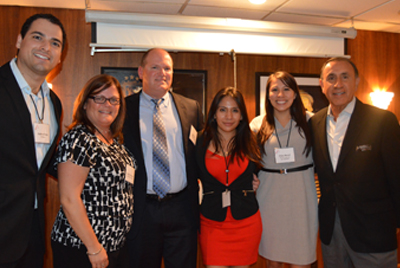 By Javier Casillas Ortiz
By Javier Casillas Ortiz
L to R: Andres Reza, President, ALPFA Twin Cities; Katie Herron, Agency Career Consultant COUNTRY Financial; Jeff Picco, Agency Manager COUNTRY Financial; Ana Maya, Executive Vice President, ALPFA Twin Cities; Elisa Baral, VP of Corporate Development, ALPFA Twin Cities; and Rick Aguilar, Founder and Publisher, Latino American Today
With more than 23,000 members nationwide, ALPFA, Inc. has been and continues to be the largest Professional Latino Association in the United States. ALPFA’s national repertoire consists of 120+ student chapters, 40+ professional chapters, and has served the community for more than 42 years. At ALPFA, we strive to empower and develop Latinos as leaders of character for the American and global market.
ALPFA’s local affairs have become more substantial by the day. ALPFA Twin Cities, a chapter that was inactive for several years, was reestablished last year, in 2013, and started with just a handful of members. The talented group of leaders from the ALPFA Twin Cities board has grown their membership, and built relationships with various partners in the community. This success wouldn’t be possible without the help and support from our corporate sponsors which include COUNTRY Financial, UnitedHealth Group, General Mills, Thomson Reuters, Travelers, Target and Rosa Mexicano. We see the need the Twin Cities has for Latino leaders and act upon it by fostering the development of the Latino professional network in Minnesota.
“At COUNTRY Financial we are proud to partner with ALPFA as they grow their footprint in the Twin Cities. We are passionate about helping our communities grow, and the Latino community is one such segment we are excited to grow with. With the leadership and members in ALPFA, they have the makings to be very successful and help their members grow as professionals.”
Katie Herron
Country Financial
As members of a non-profit organization, we see the importance of our involvement in the community, which is why our members and board members volunteer for local organizations such as; La Oportunidad, Inc., C.L.U.E.S., and the AVID Program at the St. Paul Public Schools, among others. Our events are our primary method of reaching the community and building the Latino professional network in Minnesota.
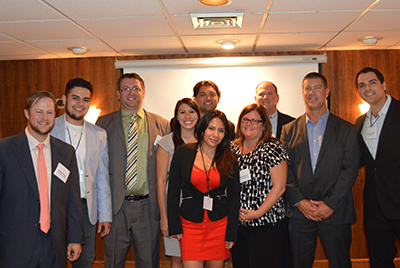 L to R: Phil Haug, Agency Manager COUNTRY Financial; Javier Casillas Ortiz, VP of Corporate Development, ALPFA Twin Cities; Steve Walker, Agency Manager COUNTRY Financial; Elisa Baral, VP of Corporate Development, ALPFA Twin Cities; Ana Maya, Executive Vice President, ALPFA Twin Cities; Matt Maus, VP of Marketing, ALPFA Twin Cities; Katie Herron, Agency Career Consultant COUNTRY Financial; Jeff Picco, Agency Manager COUNTRY Financial; Kevin Thompson, Agency Field Executive COUNTRY Financial; and Andres Reza, President, ALPFA Twin Cities
L to R: Phil Haug, Agency Manager COUNTRY Financial; Javier Casillas Ortiz, VP of Corporate Development, ALPFA Twin Cities; Steve Walker, Agency Manager COUNTRY Financial; Elisa Baral, VP of Corporate Development, ALPFA Twin Cities; Ana Maya, Executive Vice President, ALPFA Twin Cities; Matt Maus, VP of Marketing, ALPFA Twin Cities; Katie Herron, Agency Career Consultant COUNTRY Financial; Jeff Picco, Agency Manager COUNTRY Financial; Kevin Thompson, Agency Field Executive COUNTRY Financial; and Andres Reza, President, ALPFA Twin Cities
COUNTRY Financial made ALPFA TC’s first sponsored event possible on September24, 2014, at Green Mill in uptown and was a great success! Members got the opportunity to network while enjoying appetizers and refreshments. A panel style presentation by an outstanding team of Agency Managers from COUNTRY Financial followed the networking. The presentation focused on life insurance; attendees learned how much life insurance one needs, the cost of life insurance, the difference between the various types of life insurance and had an opportunity to get their questions answered. Thank you again to COUNTRY Financial for your support and for such a wonderful event!
 By Jose Villa, Sensis (pictured left)
By Jose Villa, Sensis (pictured left)
As we enter the second open enrollment period for the Affordable Care Act this fall, attention will inevitably turn to driving enrollment among the so-called “young and healthy” segment of 18- to 34-year-old consumers, many of whom are Hispanics. It has been well documented that the initial rollout of the ACA in the fall of 2013 saw early challenges in enrolling “young and healthy” Hispanics. Numerous studies and news reports identified three key challenges to Latino enrollment: lack of trust, lack of awareness (Commonwealth Fund survey), and need for one-on-one education.
The success in driving Latino enrollment during the final month of Covered California open enrollment (252,000 signed up) was largely attributed to expanded community partnerships, face-to-face interactions and in-language support. However, there has been limited research into the mindset of Hispanic Millennials on the topic of health to better understand some of the potential psychographic drivers behind their decisions to enroll and their underlying attitudes and beliefs related to health care.
The recently published second wave of the Hispanic Millennial Project research study, entitled “Hispanic Millennials & Healthcare,” provides one of the first glimpses into the health-related attitudes and beliefs of Hispanic Millennials. The study dives deep into Hispanic Millennial motivators and mindsets around health, wellness, diet, exercise, adoption of health related technology, health care insurance knowledge and enrollment and attitudes towards the ACA.
Some of the key findings of the research show Hispanic Millennials:
• Rate their overall health more positively compared to non-Hispanic Millennials
• Report lower levels of stress compared to non-Hispanic Millennials
• View diabetes as the illness they are most concerned about getting in the future
• Have adopted technology into their health maintenance
Hispanic Millennials and non-Hispanic Millennials, older Hispanics (35+), as well as comparing foreign-born vs. U.S. born Hispanic Millennials and Hispanic Millennials based on gender and income. These comparisons uncover some interesting insights, such as:
• When compared with non-Hispanic Millennials, Hispanic Millennials are more likely to resist seeing a doctor unless it’s absolutely necessary and when they do consult a doctor, they are more likely to get a second opinion
• Foreign-born Hispanic Millennials are more likely to define health as “having no physical problems” while U.S. born Hispanic Millennials are likely to define health as “feeling good” or “being fit”
• Hispanic Millennials are more in favor of the Affordable Care Act compared to non-Hispanic Millennials
• Foreign-born Hispanic Millennials are significantly more likely to choose traditional home remedies over medicine
• Male Hispanic Millennials are more optimistic about their health than Hispanic Millennial females
The research also reveals some very important points of tension that characterize the health and wellness attitudes of Hispanic Millennials. These points of tension center on trust and frequency of doctor visits, inner well-being versus outside appearance, and the trustworthiness of online health information.
The big takeaways for health care marketers are that Hispanic Millennials have nuanced and sophisticated attitudes about health. They are early adopters of health technology. And while they continue to live in two worlds when it comes to health, many of their traditional cultural influences are becoming more aligned with mainstream attitudes embraced by non-Hispanic Millennials.
 By Louis Barajas
By Louis Barajas
I recently attended a National Latina Business Women Association (NLBWA) meeting in Los Angeles. As I heard 25 women around the room introduce themselves and the businesses they owned, I couldn’t help but think about the critical role they are going to play in helping the U.S. economy recover.
In general, women-owned firms contribute $3 trillion annually to the U.S. economy and account for 16% of all jobs. Recent research shows that all women entrepreneurs will create 5 to 5.5 million new jobs across the U.S. by 2018 – more than half of the total new small-business jobs expected to be created during that time, and about one-third of the total new jobs anticipated by the Bureau of Labor Statistics.
According to the latest Kauffman Firm Survey, Latina-owned businesses, in fact, represent the fastest-growing segment of the women-owned business market. Between 2010 and 2012, their businesses increased by 172 percent. Also, according to a 2012 Corporate Inclusion Index of the Hispanic Association for Corporate Responsibility (HACR), Latinas are starting businesses at a rate six times the national average. MANA, a Latina organization and a coalition member of HACR, conducted the research.
Our American Dream:
So why is there such growth in entrepreneurship among women and especially Latinas? My conversations and consultations with Latinas over the years has taught me that they have been disappointed with corporate America. They aren’t promoted enough, they are misunderstood culturally, and they get paid less than men and non-Hispanic women. Also, since many Latinas put family first, they also feel the stress of having to balance work and family life. For these reasons, many Latinas (and women in general) are starting their own small businesses at unprecedented rates despite the difficult economy.
I also believe that women-owned businesses are going to be best suited for our new economy. The experience I have in consulting entrepreneurs has taught me that women go about running their businesses much differently than their male counterparts. The following are just a couple of reasons why I strongly believe that women will not only build sustainable businesses to help the U.S. economy recover, but also create the life work balance they search for.
Women focus on building businesses, not just creating jobs for themselves so that they can be available for their family. Women have larger social networks and typically reach out to others for help. Women look to build a business in which they depend on others to help them grow. The secret that women understand is that if they have to be at their business all day long, they don’t own a business, they own a job. Their priority on family is the driving force behind building a growing and sustainable business.
U.S. Directory of LATINA-Owned Businesses is an online directory of Latina Business Owners and Professionals that helps site visitors quickly find and do business with Latina entrepreneurs. Visit www.latinamarketplace.com.
 By Erik Sass
By Erik Sass
It’s not news that Hispanic millennials born in the U.S. are more likely to consume English-language media than their foreign-born counterparts -- but what may be surprising is that U.S.-born Hispanic millennials also appear to consume Spanish-language media more than older Hispanics born in the U.S.
That’s according to data from the Hispanic Millennial Project, a collaboration between Sensis and ThinkNow Research.
Among Hispanic millennials born in the U.S., 19% said they consume only English-language media, with another 22% consuming “mostly” English-language media, Sensis and ThinkNow found. Some 40% said they consume English- and Spanish-language media equally, 10% said they consume mostly Spanish-language media, and 9% said they consume only Spanish-language media. By comparison, among foreign-born Hispanic millennials, 31% said they consume “mostly” Spanish-language media, and just 7% said they consume only English-language media.
These findings are generally in line with the standard acculturation model, but interestingly, U.S.-born Hispanic millennials were also more likely to say they consume both English- and Spanish-language media than their older U.S.-born counterparts: among Hispanics ages 35-64 who were born in the U.S., 32% said they consume English- and Spanish-language media equally, compared to 40% for Hispanic millennials.
The difference could be the result of a number of factors, including a greater desire to embrace Hispanic identity among younger U.S.-born Hispanics and their parents (versus previous generations’ desire to “blend in”), and growing availability of Spanish-language media over time.
Media companies and research outfits are grappling with the complexity of this rapidly growing market.
In May, Pulpo Media, a cross-platform digital media network targeting Hispanic audiences, unveiled a new acculturation model that combines online and offline data to create more targeted segments within the overall U.S. Hispanic market. The model combines data from the U.S. Census with proprietary first- and third-party data, including country of birth, parent’s country of birth, age of immigration, number of years spent in the U.S., language preference at home and English proficiency, and analyzes the data to create segments that can be targeted down to the ZIP code level.
 By Jose Villa, Sensis Agency
By Jose Villa, Sensis Agency
Los Angeles, CA
I think it’s official – Hispanic Millennials are on the top of most of Hispanic marketer’s minds these days. As I’ve discussed in past articles, all the buzz and excitement around Hispanic Millennials has led to a lot of research that has only started to scratch the surface into this complex and largely misunderstood segment of the Hispanic market. This is why my agency, Sensis together with our partners at ThinkNow Research have decided to undertake an ambitious research initiative called The Hispanic Millennial Project.
The study and research will be conducted and released in waves in 2014 and early 2015, where each wave of The Hispanic Millennial Project will focus on a different topic relevant to this segment.
Going into this new research, we knew that Hispanic Millennials made up the second largest Hispanic cohort living in the United States. In 2013, Hispanic Millennials accounted for 25% of all Hispanics. They also account for a sizeable proportion of all Millennials. Out of all Millennials living in the United States, 21% were identified as being Hispanic. (Geoscape American Marketscape 2013)
Hispanic Millennials have grown up in a historic time for the U.S., facing the great recession, the war on terror, unprecedented growth in the size and influence of Hispanics, healthcare reform, and high unemployment. This evolving landscape has shaped the way that this segment views the world around them. In this first wave of research we wanted to gain a deeper understanding on how these challenges influence the worldview of Hispanic Millennials, and how these perceptions are different from those of older Hispanic segments as well as their non-Hispanic counterparts. By diving into the mindset of Hispanic Millennials, we could help brands gain a deeper understanding on how to message them and engage with them in a more culturally and psychographically relevant ways.
Two of the lead findings of wave 1 of Hispanic Millennial Project are that Hispanic Millennials are more satisfied with the direction of the U.S. and more driven by the “American Dream” than non-Hispanic Millennials.
Hispanic Millennials are more positive about the direction of the U.S.
Despite the hardships that this generation has faced, the outlook of Hispanic Millennials on the direction of the United States remains optimistic. When asked, “How satisfied are you with the direction that the U.S. is going in?”, 63% of Hispanic Millennials indicated that they were either “Very Satisfied” or “Somewhat Satisfied” with the current direction of the U.S. This is noticeably different from the response of non-Hispanic Millennials, where only 39% indicated that they were either “Very Satisfied” or “Somewhat Satisfied” with the current direction of the country.
Hispanic Millennials are more driven by the “American Dream”
Hispanic Millennials still believe in and strive for the “American Dream.” When asked how much they agree with the statement, “The ‘American Dream’ is something I believe in,” 71% indicated that they either “Completely Agree” or “Somewhat Agree” with this statement and 67% indicated that it is something that they strive for. This contrasts with non-Hispanic Millennials, where only 55% indicated that they believe in the “American Dream” and only 54% stated that it is something they strive for.
So what does this mean for marketers, brands and other organizations looking to reach and engage with Hispanic Millennials? What brands resonate with Hispanic Millennials and how do their views on higher education and entrepreneurship differ from older Hispanics and non-Hispanic Millennials? We dive into these questions and more in the full report, which you can download for free at HispanicMillennialProject.com.
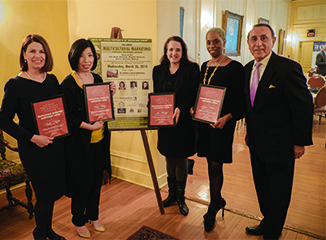 Pictured: Left to right: Isabel Valdes, Vicky Wong, Lisa Skriloff, Pepper Miller, and Rick Aguilar
Pictured: Left to right: Isabel Valdes, Vicky Wong, Lisa Skriloff, Pepper Miller, and Rick Aguilar
The 18th annual Multicultural Marketing Conference and Awards Luncheon was held on March 26, 2014 at the prestigious Woman’s Club of Minneapolis, presented by Aguilar Productions. This all day conference drew an audience of over 120 marketing professionals who were treated to an outstanding array of presentations by three of the country’s leading multicultural marketing experts.
The featured presenters included:
Isabel Valdes, Principal, Isabel Valdes Consulting, San Francisco, CA
Pepper Miller, President, The Hunter-Miller Group, Inc., Chicago, IL
Vicky Wong, President & CEO, DAE Advertising, San Francisco, CA
The awards luncheon honored these presenters for their outstanding leadership in developing the multicultural marketing industry. In addition, Lisa Skriloff, President of Multicultural Marketing Resources, Inc. New York, NY was honored for her promotion of the multicultural marketing and her company’s 20th anniversary in the industry.
Presenting sponsor was Metropolitan State University, and conference sponsors included, U.S. Bank, Hilton Minneapolis, Minnesota Twins and La Raza 1400 am. Media sponsors included Latino American Today, LatinVision Media, Multicultural Marketing Resources, Inc., and Minnesota Multicultural Media Consortium.
“The speakers were phenominal and the topics were relevant.”
Rachel Limon, Minnesota Trade Office
“The selection and caliber of speakers was exceptional.”
Liz Pangerl, Casa Valencia
“The speakers were all very informative and interesting.”
Amy Kuehn, marketing manager, Minnesota Timberwolves.
“Location was great, speakers were wonderful and the networking was fun.”
Tana Douville, Minnesota Housing Finance Agency
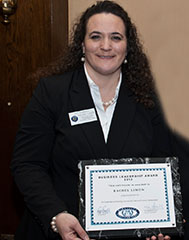 Pictured: Rachel Limón
Pictured: Rachel Limón
Rachel Limón, International Trade Representative of the State of Minnesota’s Minnesota Trade Office, was awarded the Minnesota Consular Corps prestigious Business Leadership Award 2013 at the Minneapolis Club. The event was attended by more than 150 academic, diplomatic, commercial and international attendees on February 12, 2014.
The Minnesota Consular Corps recognizes individuals, community groups, non-profit organizations, and business establishments located in the states of jurisdiction that have demonstrated sustained commitment and outstanding achievements in the pursuit of cultural diversity through human rights advocacy and protection, outstanding community service and excellence in business leadership.
Rachel Limón is the State of Minnesota’s Minnesota Trade Office (MTO) International Trade Representative for Latin America & the Caribbean. She assists Minnesota companies identify and develop export strategies and opportunities in the international marketplace. She has created a successful program called the Latin America Seminar Series, which has served to assist Minnesota companies to increase their exports to Latin America. Through her work with the Consulate of Ecuador, they jointly created the very successful Annual South America Trade Forum. Rachel organized and led the IT Delegation during Governor Jesse Ventura’s Trade Mission to China, in 2002.
She organized and participated in Governor Pawlenty’s Trade Missions to China 2005, India 2007 and South America 2009. She has assisted with Governor Dayton’s trade missions to Japan & Korea, China and Europe.
Rachel has several years of International management experience. Prior to joining the MTO, Rachel worked as an International Distributor Representative for Skyline Displays, an international tradeshow booth design and manufacturing facility in Eagan, Minnesota. She provided consultation and training to the international distributor network in Latin America, Europe and Asia. She also worked for a telecommunications manufacturer in Wisconsin as a Sales and Marketing Manager and traveled extensively throughout her seven state territory in the southeastern part of the U.S.
Rachel graduated from the University of St. Thomas with a Master’s Degree in International Management and a Bachelor of Arts Degree in Spanish and Psychology. She speaks fluent Spanish. Rachel has several years of international experience and has lived and studied in Mexico. She has also traveled extensively throughout Latin America, Europe and Asia. Rachel served on the Executive Board of the Minnesota –Uruguay Partners of the Americas as Chairman with prior positions of Vice President of Membership and Co-Chairs of Business and Economic Development and Youth at Risk Committees.
She is nationally recognized award winning artist, very active in her community in the arts serving on several art boards, a tour guide of the Native Americas Galleries at the Minneapolis Institute of Arts, Art Instructor at the White Bear Lake Center for the Arts, Volunteer at the Wildlife Rehabilitation Center and devoted wife, mother, family member and friend.
Contact:
Rachel Limón | Minnesota Trade Office | 651-259-7492 | Rachel.limon@state.mn.us
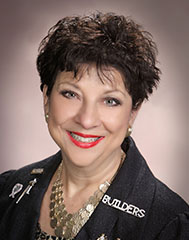 Pictured: Mary Beissel
Pictured: Mary Beissel
Local business woman Mary Beissel has achieved the status of Mary Kay Independent National Sales Director—an honor only 600 women have accomplished out of the 3 million Mary Kay independent sales force members worldwide.
Mary Kay Independent National Sales Directors are known for their business acumen and are considered leaders within the independent sales force. They often mentor other Mary Kay business owners by sharing best practices, knowledge and guidance on running a successful business.
Beissel came from humble beginnings as the daughter of Lebanese immigrants who instilled their six children with drive and optimism—factors she claims guided her to success today. Her mother’s family came from Lebanon, and she was born and raised in Mexico City for 19 years before coming to America so I love my heritage and the bonds I have developed within the Latina Market. It has presented a wonderful opportunity to me. I have leaders here locally in Minnesota as well as in several cities across the nation.
Many women come to us for skin care and color advice and love our products. Latinas are accustomed to excellent quality and they appreciate the product guarantee we offer. Entrepreneurial women are looking for great products but also additional income or to replace professional level incomes with balance in their lives. These women are drawn to Mary Kay’s values of Faith, Family and Career.
“I am so proud of my experience with the women I have in our group and I always welcome women who want more for themselves and their families to take a good look at our products and our opportunity,” Beissel said.
Before her Mary Kay business Beissel was a critical care nurse. The longer hours were not ideal for her as she was trying to start a family. In 1978 another nurse working with Beissel introduced her to Mary Kay, and she quickly embraced the open-ended financial opportunities and flexibility a Mary Kay business had to offer.
More than 30 years later, after earning multiple awards and the use of 16 Mary Kay pink Cadillacs, Beissel is most proud of the education she has been able to provide to her three children. Private school educations and three degrees from top colleges in the nation for all three of her children were made possible through Beissel’s hard-work in her Mary Kay business.
Beissel is a firm believer in success through servant leadership. “Leading by example has helped me become a better leader, and build better leaders for the future,” said Beissel. “One of my favorite things I am able to do is help mentor other women with their Mary Kay businesses. No matter their background or their reason for having a Mary Kay business, I try to emphasize the importance of becoming a positive, grateful, humble, and above all, reliable person to become a successful leader.”
Beissel will be recognized for reaching this accomplishment of Mary Kay Independent National Sales Director at Mary Kay’s annual Seminar in Dallas this summer.
“We are excited for Mary as she begins her new role as Independent National Sales Director in her Mary Kay business,” said Darrell Overcash, President of Mary Kay U.S. “Mary’s hard work, determination and professionalism helped pave her way towards reaching this prestigious status. Her success represents what can be achieved with the Mary Kay opportunity.”
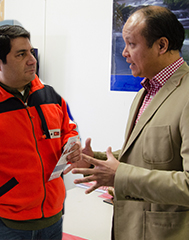 Pictured: Dennis Nguyen
Pictured: Dennis Nguyen
Meeting with local Hispanic business owners at Mercado Central on E. Lake street in Minneapolis, Dennis Nguyen candidate for Minnesota Secretary of State, pledges his support for the Hispanic business community and commends their great achievements and the important role they play in Minnesota’s economic growth. With Nguyen for this visit and tour is Rick Aguilar, a Twin Cities business leader and one of the founders of the Minnesota Hispanic Chamber of Commerce in the 80’s and Chair of the Saint Paul Area Chamber of Commerce in the year 2000. The candidate for the Secretary of State is here to meet the Hispanic business owners who transformed this area from what in the 1980’s had become a decaying urban wasteland, home to closed businesses and boarded up storefronts, to the thriving commercial district it is today. Walking down E. Lake street towards Bloomington Avenue you can see a big smile on Dennis Nguyen’s face. It is the realization of the American Dream and Dennis Nguyen is on a mission to make sure that the dream stays alive. His vision for Minnesota is to help small businesses like those on E. Lake street grow and create more jobs. Nguyen commented to Aguilar and others on the “wonderful ecomomic development that has happened in this area.” Nguyen goes onto say that “without the enterprise and hard work of the Hispanic business owners none of this would have ever been possible.”
When Sears moved out of its vast E. Lake street building in 1994, it was seen by many as the final nail in the coffin for this already doomed area. That changed in 1999 when the building was taken over by the business co-operative formed by local Hispanic and ethnic immigrants and you now have the thriving Global Market, in the location, along with the Allina headquarters. You also count in the opening of Mercado Central which also opened in the late 90’s. This was an opportunity to offer Hispanic businesses affordable rent fees to help create a center for businesses trading in Latino products and services. Mercado Central is now a major attraction in the Twin Cities.
Dennis Nguyen knows full well that the Hispanic business corridors on E. Lake street in Minneapolis and Cesar Chavez street and Payne Avenue in Saint Paul represent the important role the Hispanic business community plays in the growth of the Twin Cities, and throughout towns and cities in Minnesota. Many business corridors were left mostly abandoned following an exodus to the suburbs in the 70’s and late 80’s but the Hispanic immigrants didn’t see an abandoned corridor, they saw the opportunity, they saw the “American Dream” and the chance to open their own businesses and create jobs in the community. Listening to the concerns of these business owners on this day, Nguyen is concerned they need to be able to grow, get more capitol and assistance and it’s his idea to start a business hub at the Secretary of State’s offices that could assist these new business owners. Nguyen understands the importance of the immigrant communities and what they can contribute to Minnesota’s economy. In his own words Nguyen stated, “I want to keep the American Dream alive for the immigrant communities and make Minnesota a state where business thrives and immigrants get the opportunity to vote and make a difference.”
Photo by Scott Foreman
By Rick Aguilar
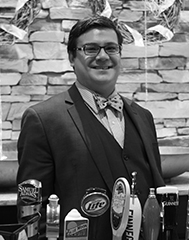 Pictured to the left: Ben Martinez
Pictured to the left: Ben Martinez
One of my favorite restaurants in the Twin Cities is the Downtowner Woodfire Grill located a few blocks from the Xcel Energy Arena on West 7th Street in St. Paul. I love the great food, good people watching and free parking. The owner Moe Sharif offers a truly unique experience for Twin Cities Diners.
A few weeks ago Moe introduced me to Ben Martinez, one of his managers and I could tell that Moe was really pleased with this young man. I was impressed with his charming personality and his articulate use of both Spanish and English. Later that day I met with Ben to find out more about his past. Ben Martinez was born in Oaxaca, Mexico. His father was born in Veracruz, Mexico and his mom was from Wisconsin. He lived in Mexico until his parents got a divorce and his mom moved him and his brother and sister to Minnesota when he was in grade school.
Ben didn’t really know how to speak English when he moved here so he attended Adams Spanish Immersion School for the opposite reason – to learn English. Ben even went to summer school to make sure he kept learning. After that he would visit his family in Mexico every summer, and his mom always made sure he would speak Spanish with family members so he wouldn’t forget how to speak it.
Ben started working when he was thirteen, the Science Museum had a special program for kids in junior high, he was a lab partner and would help guests with any questions about the exhibits; speaking both Spanish and English. He then started in the restaurant business when he was fifteen. He began as a busboy and a dishwasher and soon moved up to a waiter.
Ben really enjoyed the restaurant atmosphere and continued to work in various restaurants over the years developing his skills in all areas. Which brings me to where he is today as a manager at Downtowner Woodfire Grill working under the owner Moe Sharif and learning all he can from him.
You can tell that Ben loves working at this restaurant, with his great personality and the passion to please each and every customer with the best the Downtowner can offer. He is a great example of the many talented Latinos that work in the restaurant business here in the Twin Cities.
Ben explained that working in the business has brought him many things including meeting his wife and being able to support their beautiful baby girl. Someday he hopes to even own his own restaurant. I would bet that dream comes true for the energetic young man. Meanwhile when I visit the Downtowner I look forward to hearing “welcome amigo” from my new friend. Merry Christmas, Ben Martinez!
Downtowner Woodfire Grill is located at 253 West 7th Street St. Paul, MN 55102
Photo by Scott Foreman
By Esperanza Guerrero-Anderson and Jane Robles
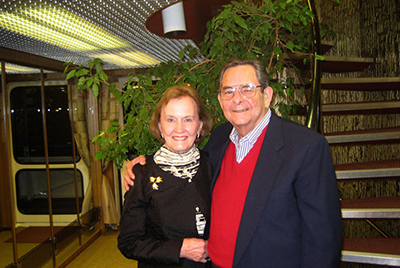 Pictured to the left: Johanna and Ric Robles
Pictured to the left: Johanna and Ric Robles
I met Ricardo “Ric” Robles 30 years ago at a White House briefing on the political situation in Central America after the Sandanista Revolution. Ric worked for Cargill and had done business in Nicaragua and we knew many of the same people. In time we became very good friends. He was my coach, my mentor, my advisor, and when I lost my brother, he became a brother to me.
Ric was born and raised in the country of Panama and as a young student he had a strong desire to go to college in the United States. He applied for many scholarships and finally received one from Carleton College in Minnesota.
Ric joined Cargill right out of Carleton College in 1947. With Cargill’s blessing he volunteered for the army during the Korean War to obtain a U.S Citizenship. He had a strong belief in and devotion to the United States. He felt a responsibility to give back to the country that gave him so much opportunity. He had a great career and bought and sold many businesses for Cargill in Latin America. In 1991, he retired as president of the Pan American Division with all of Latin America reporting to him. He was admired and respected around the world.
Ric met his soul mate, Johanna, a Minnesota farm girl, his first day at Cargill. They were married 62 years and had 4 children, 3 boys and 1 girl and were blessed with 8 grandchildren and 3 great-grandchildren.
Ric had many passions but none was more important to him than to make a difference in his community. He served on the boards of directors of Metropolitan Economic Development Association (MEDA), Minnesota International Center, Minnesota Orchestral Association, and two private banks. He was on the national board of Amigos de Las Americas and the international board of the Latin American Agribusiness Development Corporation.
A dedicated mentor and consultant, Ric took pride in helping corporate women to advance their careers and helping minority entrepreneurs to succeed, especially within the Hispanic community. He was a top fundraiser for MEDA and Milestone Growth Fund, both of which serve minority-owned businesses. He was active in the initiative to create a National Museum of the American Latino in Washington, D.C. He was inducted into Mpls.St.Paul Magazine’s Twin Cities Volunteer Hall of Fame and received the Carleton College Distinguished Achievement Award.
Ric was extremely intelligent, with a deep thirst for knowledge, a natural curiosity, and an unbelievable memory, which made him a wonderful storyteller. He loved music, poetry, photography, technology, traveling, dancing, arts, history, literature, politics, and economics, and in retirement he became an accomplished cook.
Ric had a strong spiritual connection and lived in the present, with total confidence that whatever happened in his life would be okay; it was God’s will.
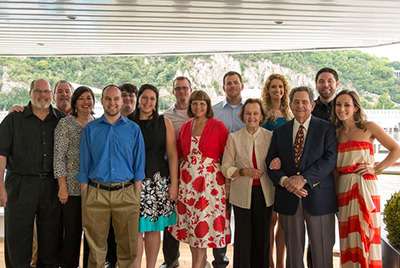 Pictured to the left: Ric Robles and his family
Pictured to the left: Ric Robles and his family
Above all, family was the accomplishment of which he was most proud. In his own words to his family, “You, who are most of the petals of a symbolic rose that defines my senses, my being, my life’s flower. How nice to realize that the gift of life is still worth the unavoidable pain, the sense of shrinking time, the re-sorting of priorities, the enjoyment of family in its broadest sense. You are the most important part of my existence” Ric passed peacefully on October 7, 2013. His passing has left a hole in many hearts, for a great man who embodied the spirit of America and everything it stood for.
Hasta pronto, Panameño bello…
Esperanza Guerrero-Anderson arrived in Minnesota from her native Nicaragua in 1978. The former president/CEO of MEDA and founder/CEO of Milestone Growth Fund, she currently consults with Minnesota-based private companies on building exceptional boards of directors.
Latino conservative leaders from the Midwest, will meet in St. Paul for the Latino Voter Outreach Midwest Conference that will take place at the Neighborhood House on October 12. The conference agenda will include discussions of issues and topics that are important to the Latino community. Since the 2012 presidental election the national media has focused on the historic turnout of Latino voters and how the vote will be important to both the Democrat and Republican parties in future elections. Many Republican and conservative leaders will attend the conference to gain insights and strategies in an effort to reach out to Latino voters.
Keynote presenter, Rachel Campos-Duffy, is the spokesperson for the Libre Initiative, an organization that promotes economic liberty, empowerment and opportunity for Latinos.
Other presenters include, Angel Garcia who is president of the Chicago Young Republicans, a nationally recognized award winning club, and serves on the Illinois Republican Party’s State Central Committee. Angel has worked on numerous local, state and national campaigns. In addition he served as Chairman of the Republican National Hispanic Assembly of Cook County and is a political commentator for NBC Telemundo. Angel has a J.D. from the John Marshall Law School and an MBA from the Brennan School of Business. He currently works as an attorney and was a candidate for Cook County Clerk in 2010. Angel is a lifelong Chicago resident.
Steve Orlando who lives in Plainfield , IL, got involved in politics at the age of 15 and was active through college at Northern Illinois University with the NIU College Republicans. Orlando has served as Treasurer for the Federation of Illinois Young Republicans since 2009 and as Chairman of the Will County Chapter of the Republican National Hispanic Assembly from 2009 to 2011. In that time, Steve built the largest, most effective county chapter in Illinois.
Orlando re-organized the Illinois Republican National Hispanic Assembly in late 2011. Over the past year, Orlando’s organization has hosted events with former Attorney General Alberto Gonzales, rising star George P. Bush, and U.S. Senator Ted Cruz (R-Texas).
Nancy Hernandez, president and founder of Abrazo Multicultural Marketing and Communication with offices in Milwaukee and El Paso,TX will present “Latinos changing the face of the Midwest” offering attendees a look at the fastest growing population in the Midwest. Hernandez has more than 10 years of marketing experience and a master’s degree in business administration from Marquette University. She currently serves on the Council of Small Business Executives, Hispanic Professionals of Greater Milwaukee, University of Wisconsin–Mil- waukee board of visitors, Milwaukee Public Library Foundation board and the Wisconsin Hispanic Conduit. She formerly sat on the board of the Hispanic Chamber of Commerce of Wisconsin.
Also from Milwaukee, Perfecto Rivera, who was a candidate for Congress, is a business and civic leader and a radio program host. Perfecto will present on a panel and discuss Latino is- sues in Wisconsin and his involvement in conservative politics. Perfecto is past chair of the Hispanic Chamber of Commerce of Wisconsin. From Marshall, MN, Bob Quasius is founder and president of Café Con Leche Republicans, a pro-immigrant Republican organization with members throughout the country. Bob has been active in Republican politics for more than 20 years, and is often quoted and interviewed in many Latino national media outlets.
For more conference information go to www.aguilarproductions.com click on the Latino Voter Outreach Conference link.
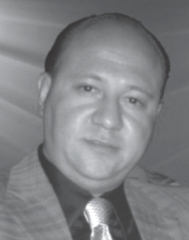 When the word Multiculturalism comes up in conversations, it draws a wide arrange
of thoughts. The word itself refers to the ideas or policies that promote cultural
diversity to the demographic make-up of a specific neighborhood, city or nation. Dwellers
of cosmopolitan regions of the country are constant witnesses of the ethno-cultural
evolution happening before our eyes. Because of multiculturalism, the general population
and the ethnic groups are changing significantly.
The fact is that the United States have forever welcomed the peoples of the world who
have come into the country bringing a defining sense of multiculturalism. These influences
are a huge factor in the shaping of the new social, political and economic landscape. At
the same time, the interest of American businesses in the global markets to successfully
take advantage of global operational differences, similarities and opportunities; have also
created a co-dependency with international cultures that has helped reshape the way we
understand multiculturalism.
When the word Multiculturalism comes up in conversations, it draws a wide arrange
of thoughts. The word itself refers to the ideas or policies that promote cultural
diversity to the demographic make-up of a specific neighborhood, city or nation. Dwellers
of cosmopolitan regions of the country are constant witnesses of the ethno-cultural
evolution happening before our eyes. Because of multiculturalism, the general population
and the ethnic groups are changing significantly.
The fact is that the United States have forever welcomed the peoples of the world who
have come into the country bringing a defining sense of multiculturalism. These influences
are a huge factor in the shaping of the new social, political and economic landscape. At
the same time, the interest of American businesses in the global markets to successfully
take advantage of global operational differences, similarities and opportunities; have also
created a co-dependency with international cultures that has helped reshape the way we
understand multiculturalism.
Here are a few facts that business leaders (in financial services, healthcare, telecom, entertainment, retail and automotive) have paid attention to.
• Numerically, the US is being transformed. The latest census data clearly indicates that 114 million minorities live in the US.
• Close to 50% of students in kindergarten through 12th grade are minorities.
• The assimilation of Asians and Hispanics is happening faster today than it did for
Poles, Irish and Italians arriving in America at the turn of the 20th century.
• Nine US counties in five states saw their minority populations surpass 50% last year. They were: Sutter and Yolo in California; Quitman in Georgia; Cumberland in New Jersey; Colfax in New Mexico; and Lynn, Mitchell, Schleicher and Swisher in Texas.
• Four states: Hawaii, California, New Mexico and Texas, as well as the District of Columbia have minority populations that exceed 50%.
Multiculturalism inevitably makes us think of immigration, but the reality is that immigrants are not the sole source of ethic growth in the United States.
As a matter of fact US Census data estimates released in 2012 shows that over 50% of children born in the U.S. were born to minorities. Census data also report that 92% of African Americans, 66% of US Hispanics and 33% of Asian Americans living in the US were born in the US. Ethnic young people who are born in the US are more likely to be bicultural, or even multicultural, in terms of taste or lifestyle. They grow surrounded by American culture but are still very much influenced by their parent’s heritage and that of the other many races and ethnic groups they interact with on a daily basis.
This bicultural evolution that we are witnessing on our societies has two contributing factors: (1) the fact that minorities are numerically too large to be overlooked, and (2) the fact that the general population has become much more receptive to multiculturalism. Instead of ethnic segments assimilating into the mainstream American culture, they are reshaping it.
Think “The Sofia Vergara Effect”. Sofia Vergara is a Colombian born actress residing in LA. Sofia’s work in both Spanish and English language TV, theater and movies has earned her international recognition. Here in the US, she endorses product lines with English and Spanish, endorsements and ads that reach beyond the traditional Hispanic marketplace.
In conclusion, multiculturalism is happening before our eyes, and we all play an important role in how we handle it for the betterment of our society. By the year 2043 non-Hispanic whites will no longer be the majority. This will lead way for the multicultural society to become what we call The New Majority.
For more information please contact:
Jose A. Segarra
Business Development
Ethnic Technologies, LLC
www.ethnictechnologies.com
Considering mobile advertising to Hispanics? Good idea… but pick the right target group.
It’s been widely documented that the adoption and use of mobile phones in the Hispanic community is as strong or stronger than any other segment of the population. But how does that translate into using the technology to market to or support the sale of products to Latinos? Interestingly, it’s a mixed bag.
In a June 2013, ThinkNow Research conducted a nationwide survey on mobile phone
use in the Hispanic community. The 500+ respondents were a cross-section of the U.S.
Hispanic population as a whole. The study focused on three key issues:
• The use of mobile phones to help with the shopping experience
• The use of mobile phones to help friends/relatives with their shopping experience
• Attitudes toward mobile phone advertising
Absolutely! In fact, more than 40% of Hispanics frequently use their phones to help with shopping, specifically in the areas of electronics, movies, grocery shopping and clothing. And asked if they’ve ever used their mobile phone to help, that number jumps to 75%! As you might expect, the group that uses their mobile phones the most to help with shopping is the 18-34 year olds. What we did find very interesting was those who primarily spoke Spanish at home were the most active group on their mobile phones. Also, those Hispanics with household incomes of more than $40k were significantly more likely to use their mobile phones than those with lesser incomes.
Yes, Hispanics use their phones to help others – at a rate of about 60%! And just like the general use of mobile phones for shopping, the strongest groups were the 18-34 year olds, those who primarily speak Spanish at home and those with HHI greater than $40k.
This was where it got really interesting!
On one level, the vast majority of Hispanics (74% overall) agreed that ads on mobile
phones are annoying (but who doesn’t?!). This was very consistent across all age groups.
However, the high-acculturated segment found it significantly more annoying than their
low-acculturated friends… by 27%!
However, even though Hispanics find mobile phone ads annoying, there is still a big
opportunity for advertisers (and mobile phone companies and service providers)!
According to a study conducted in early 2013, Hispanics are not only high on the U.S.
economy, they’ve got the money to spend. And it looks like mobile phones as a sales
and marketing channel will help them do just that!
©2013 latino american today. All Rights Reserved.
